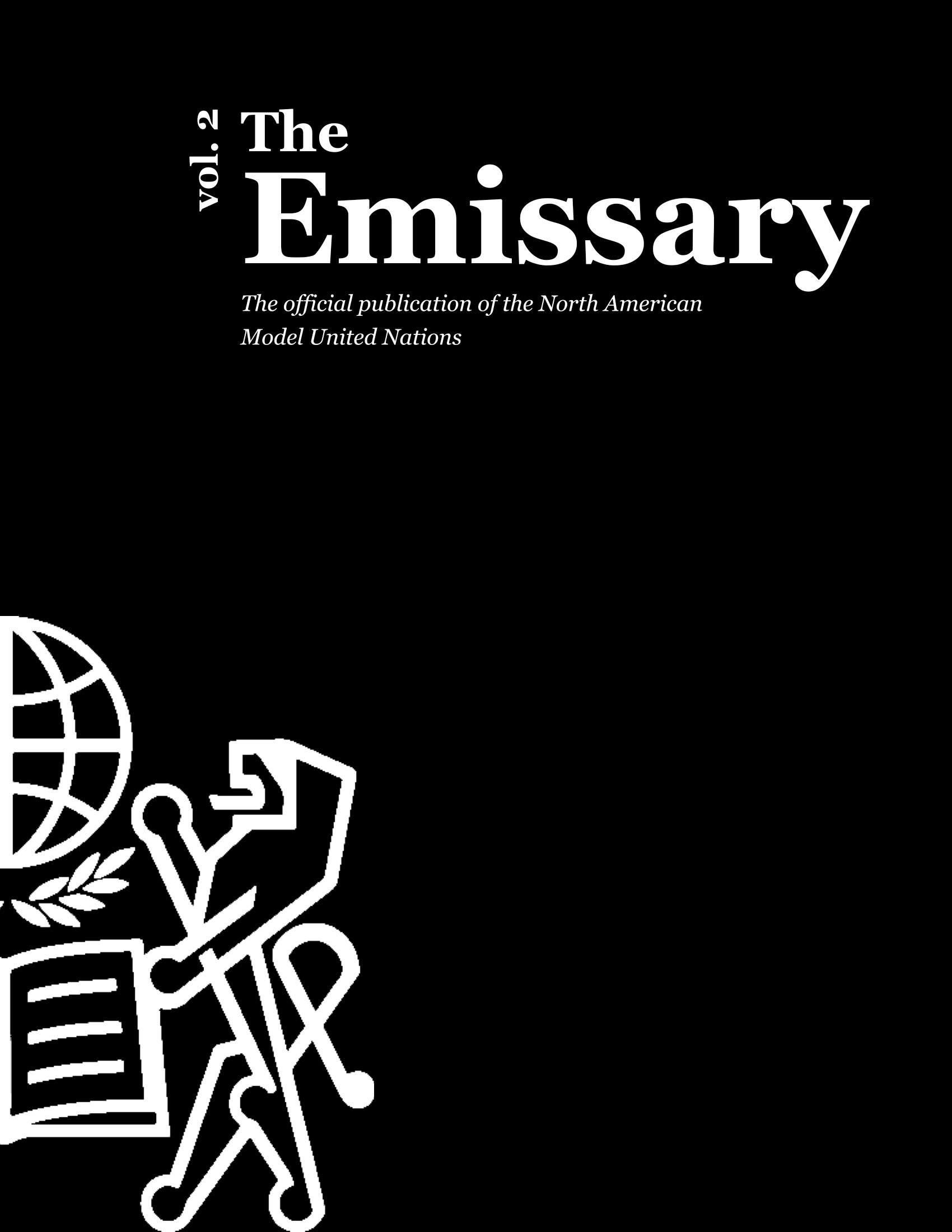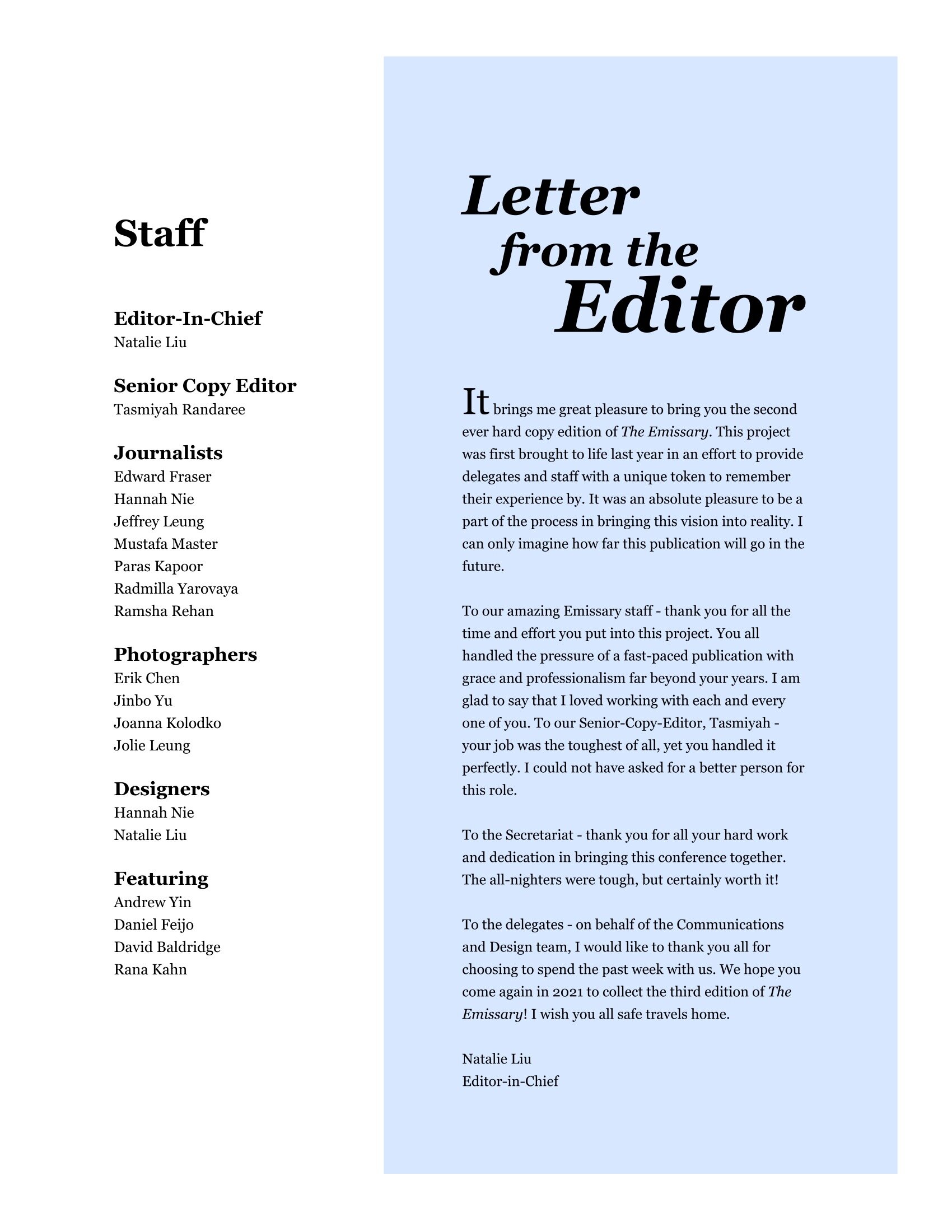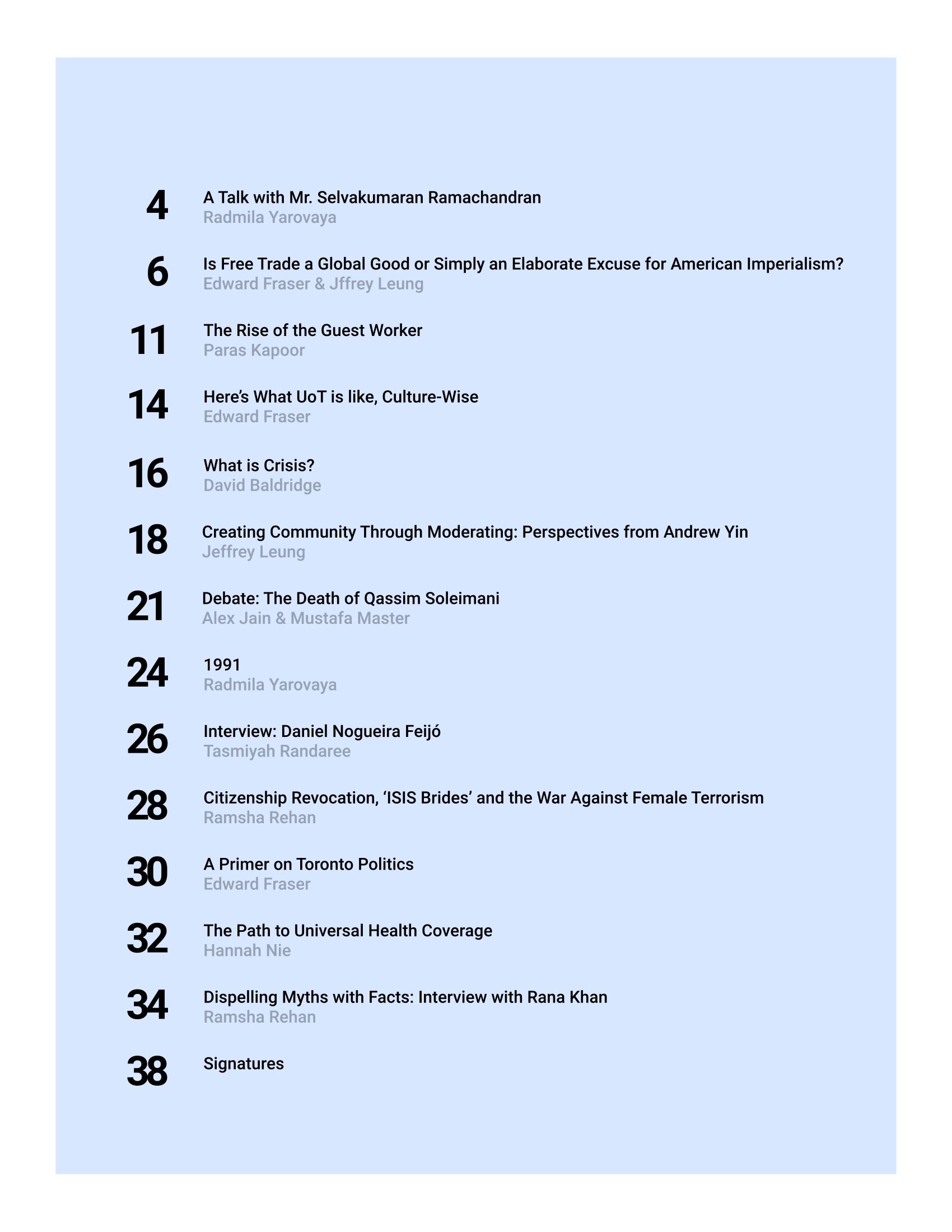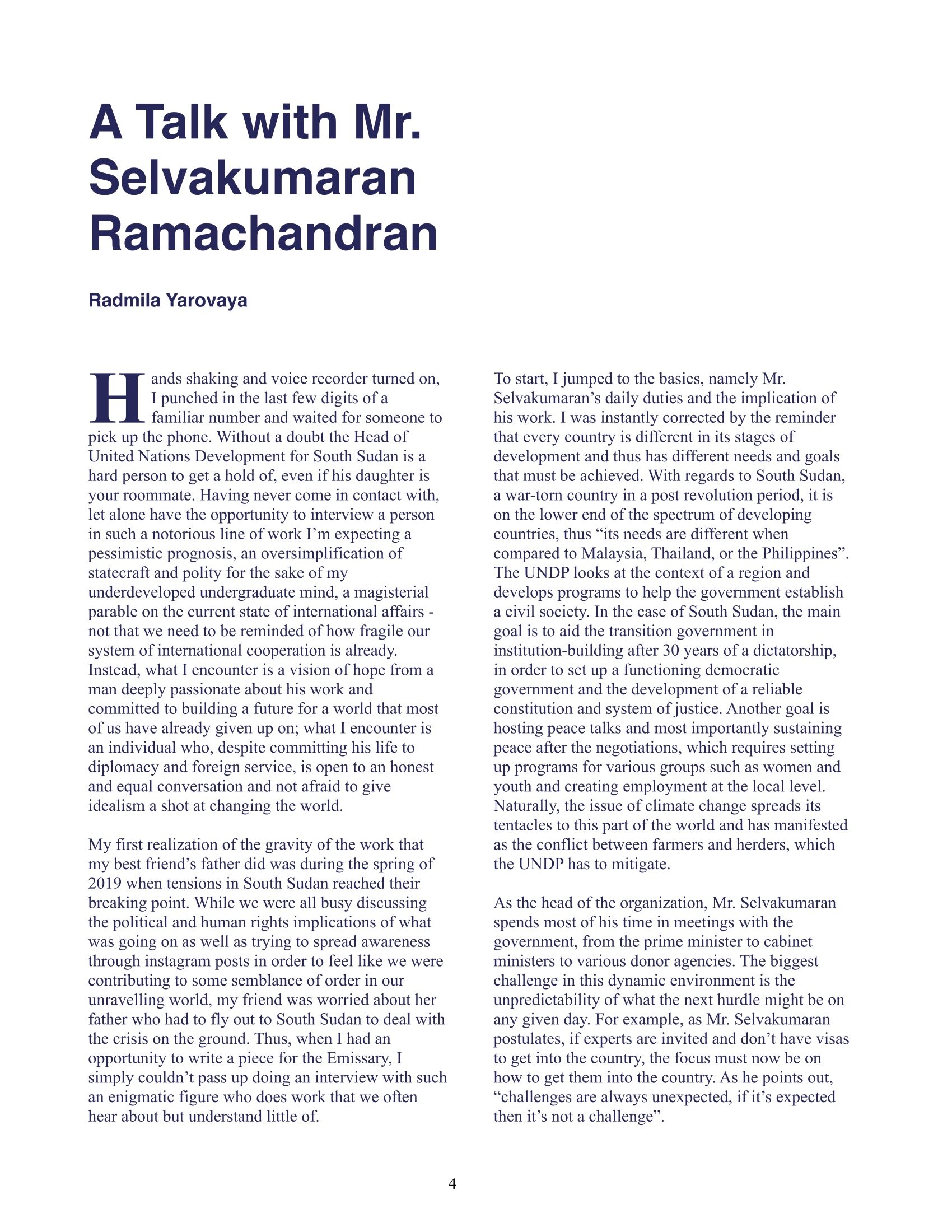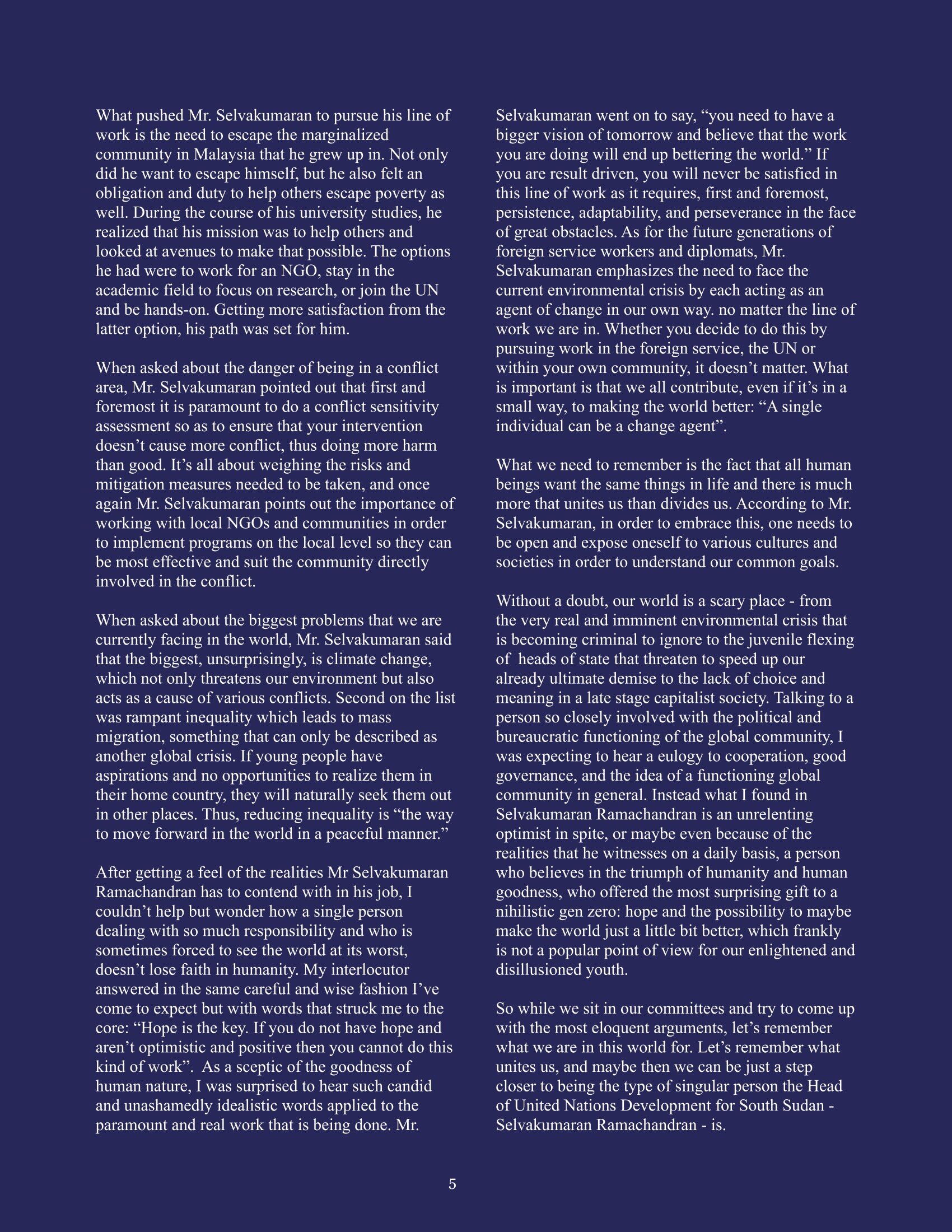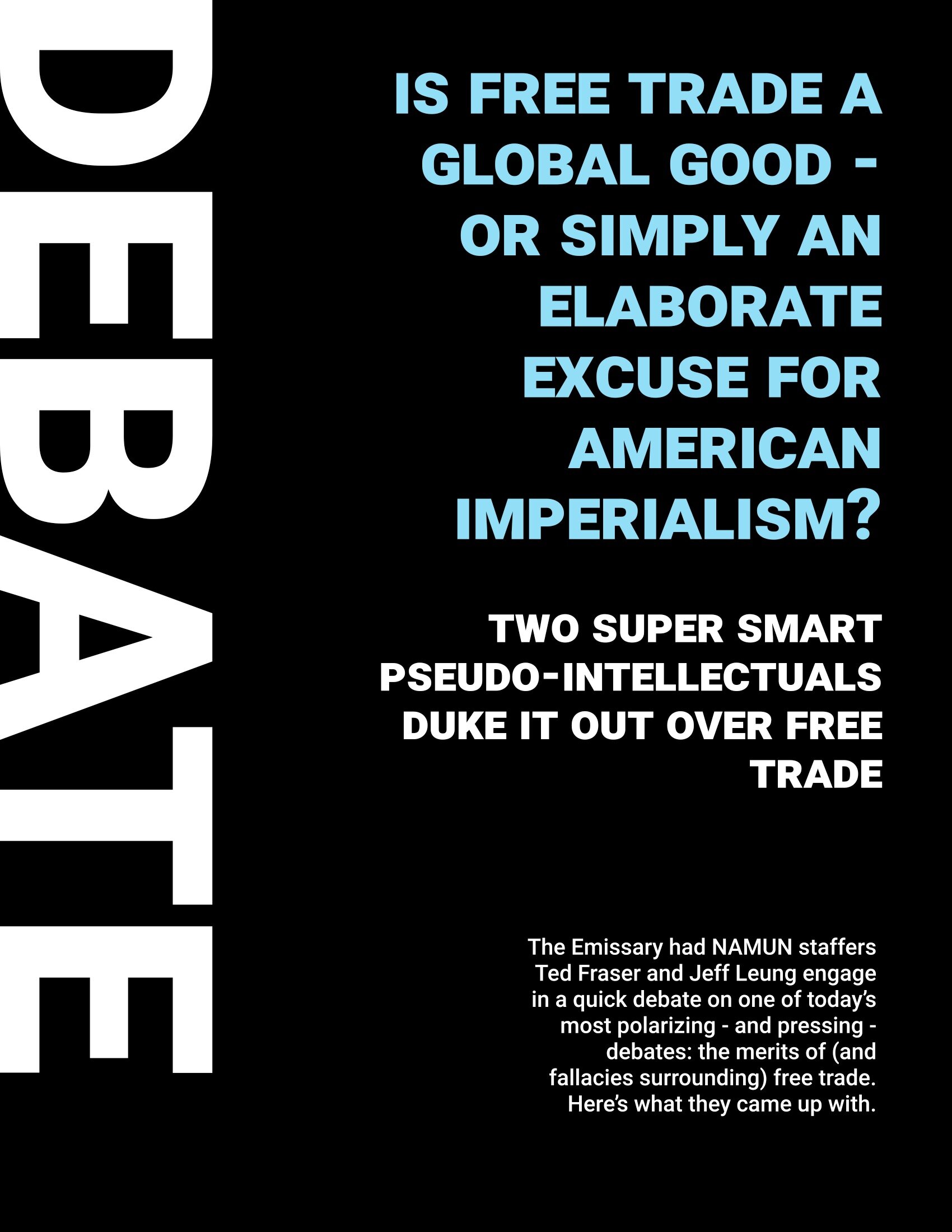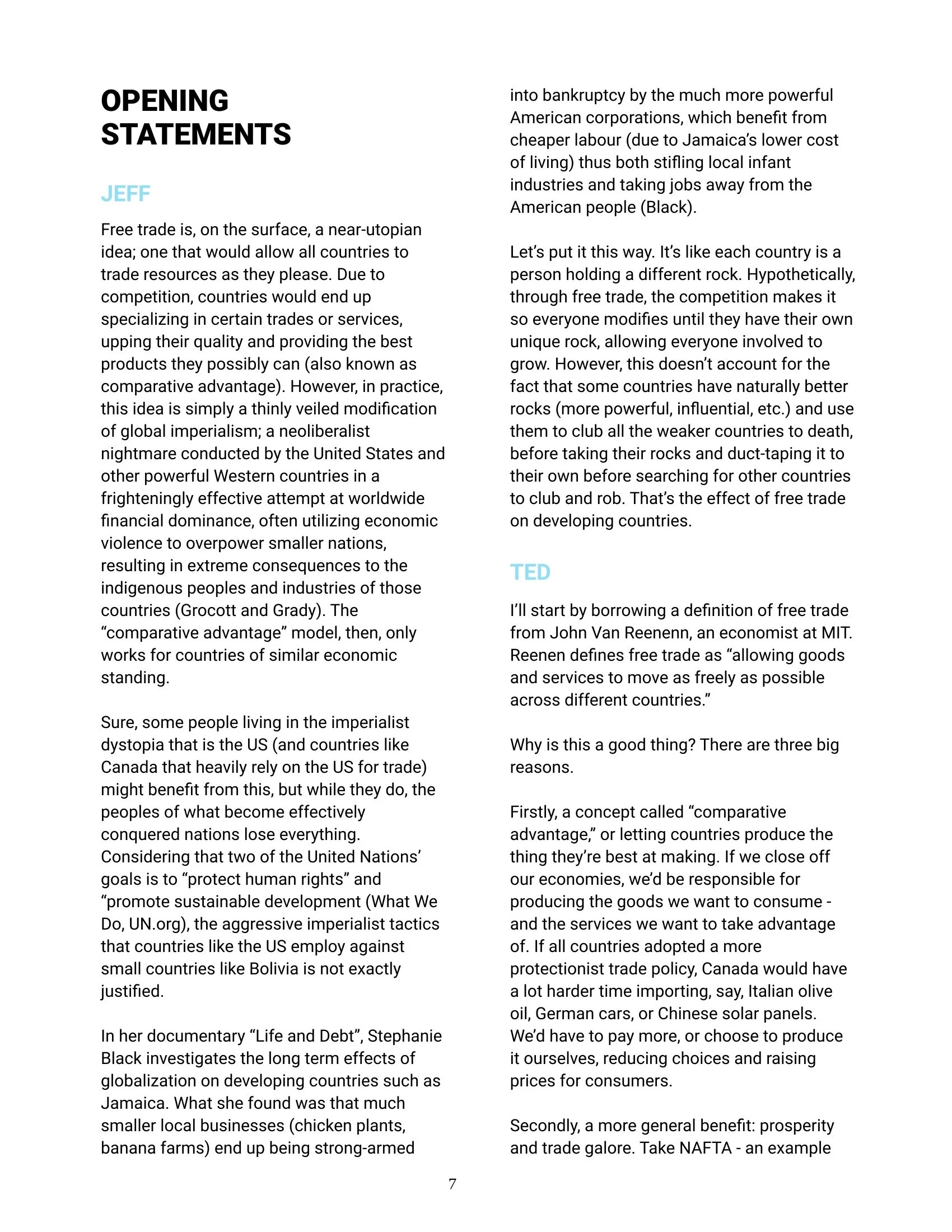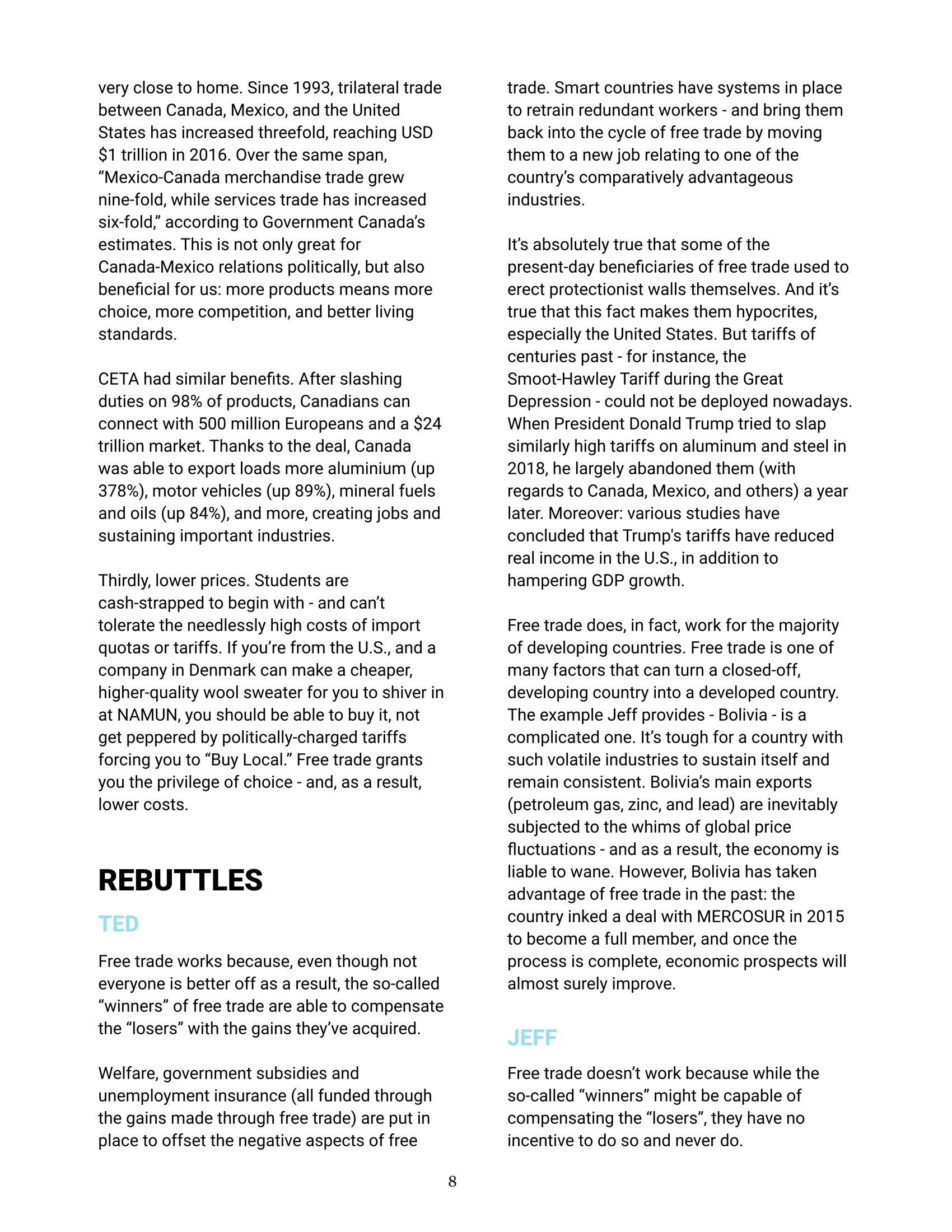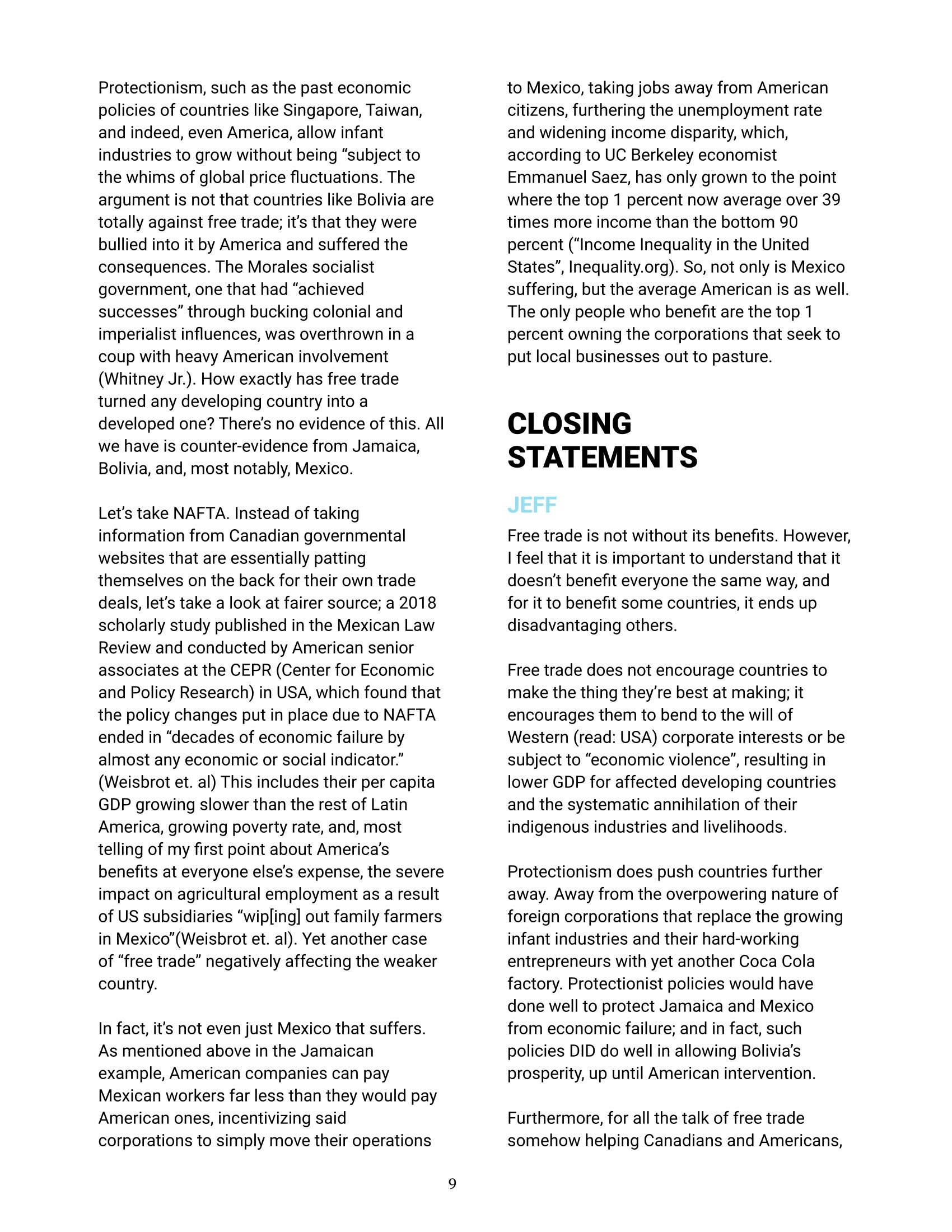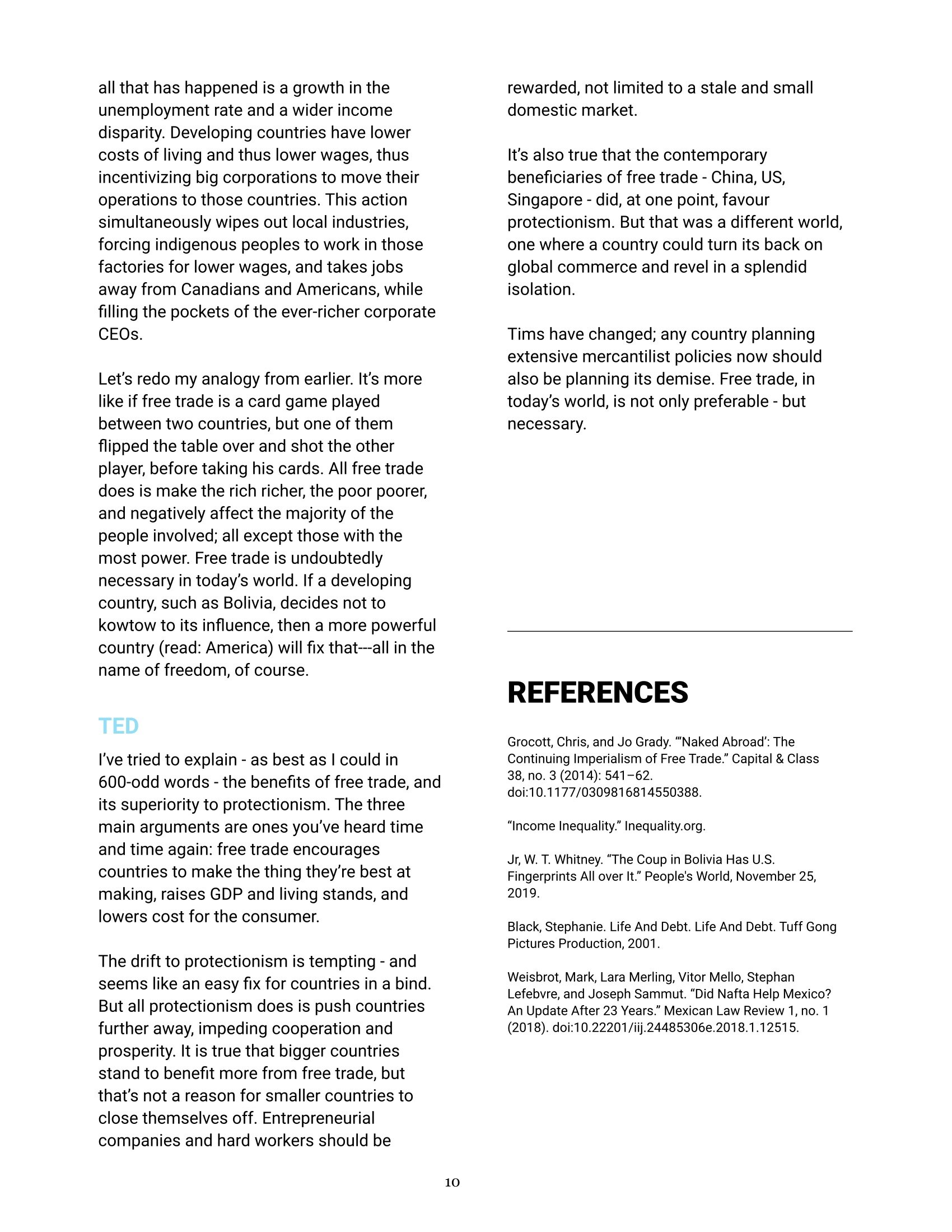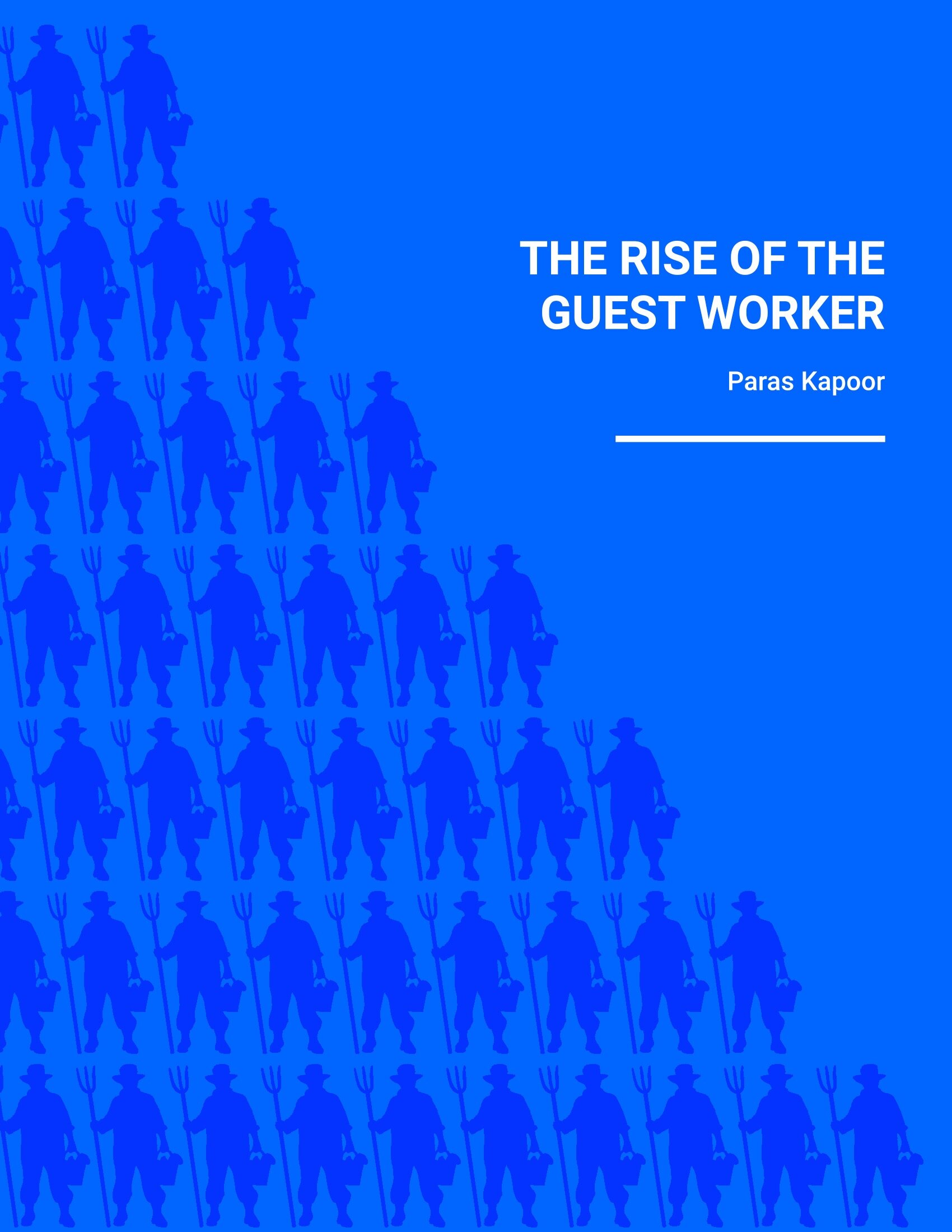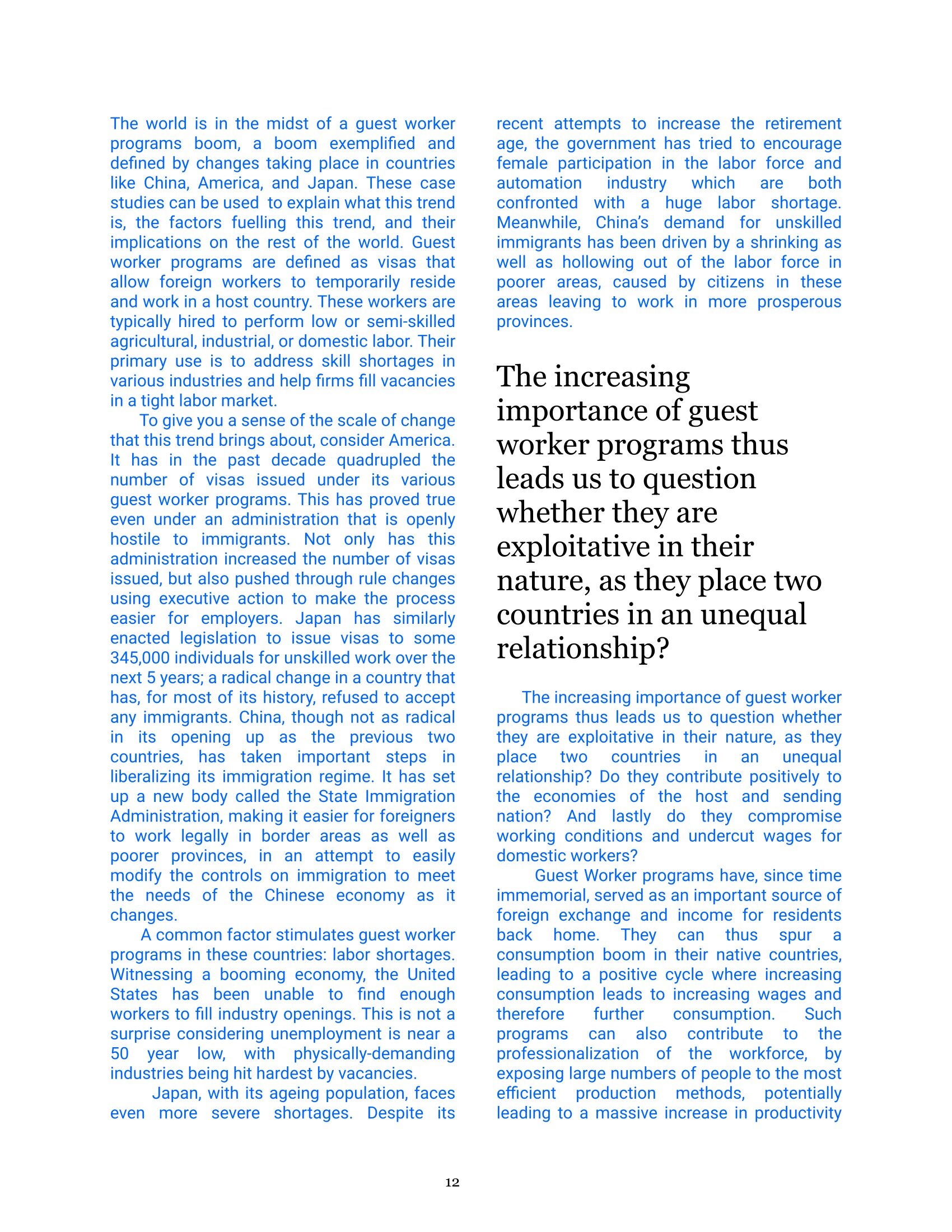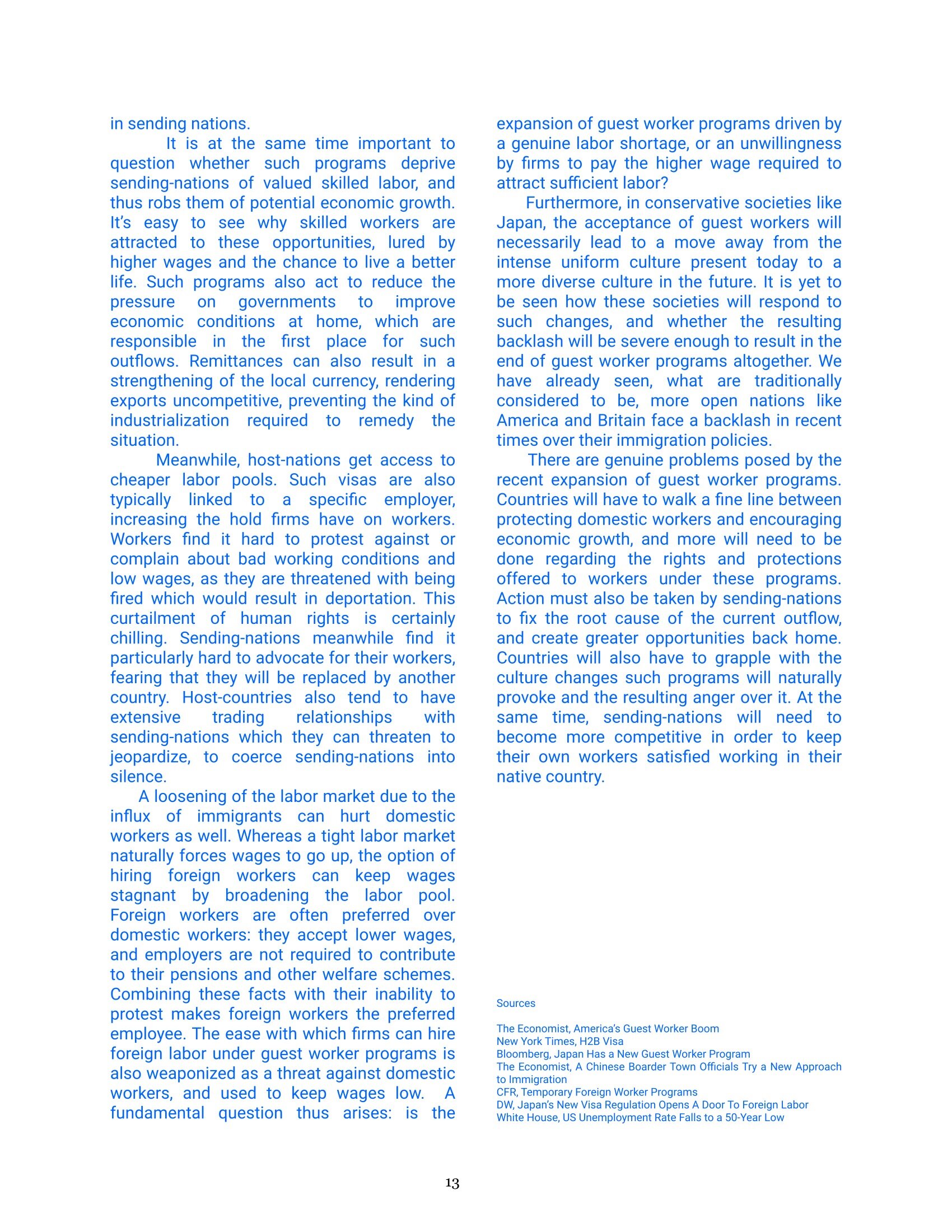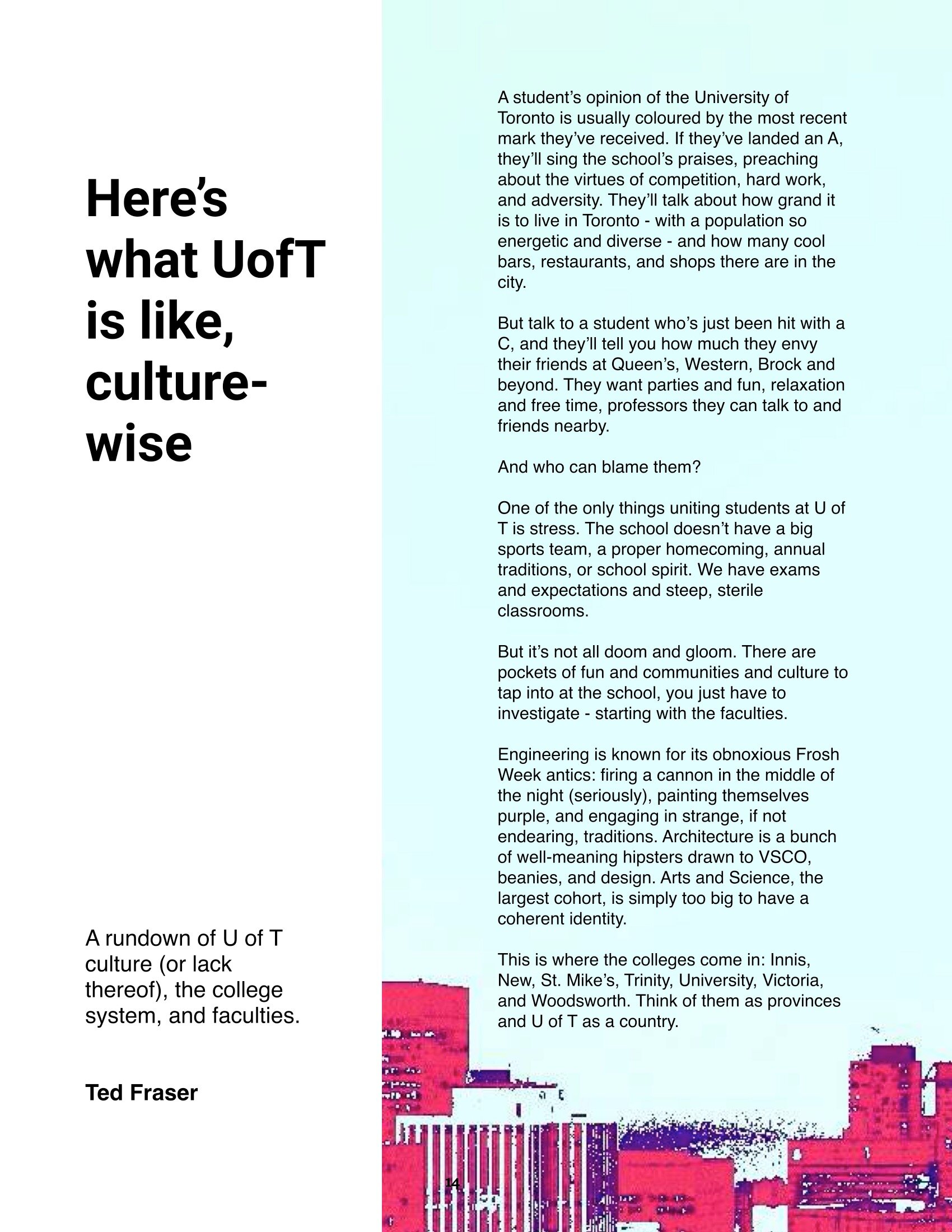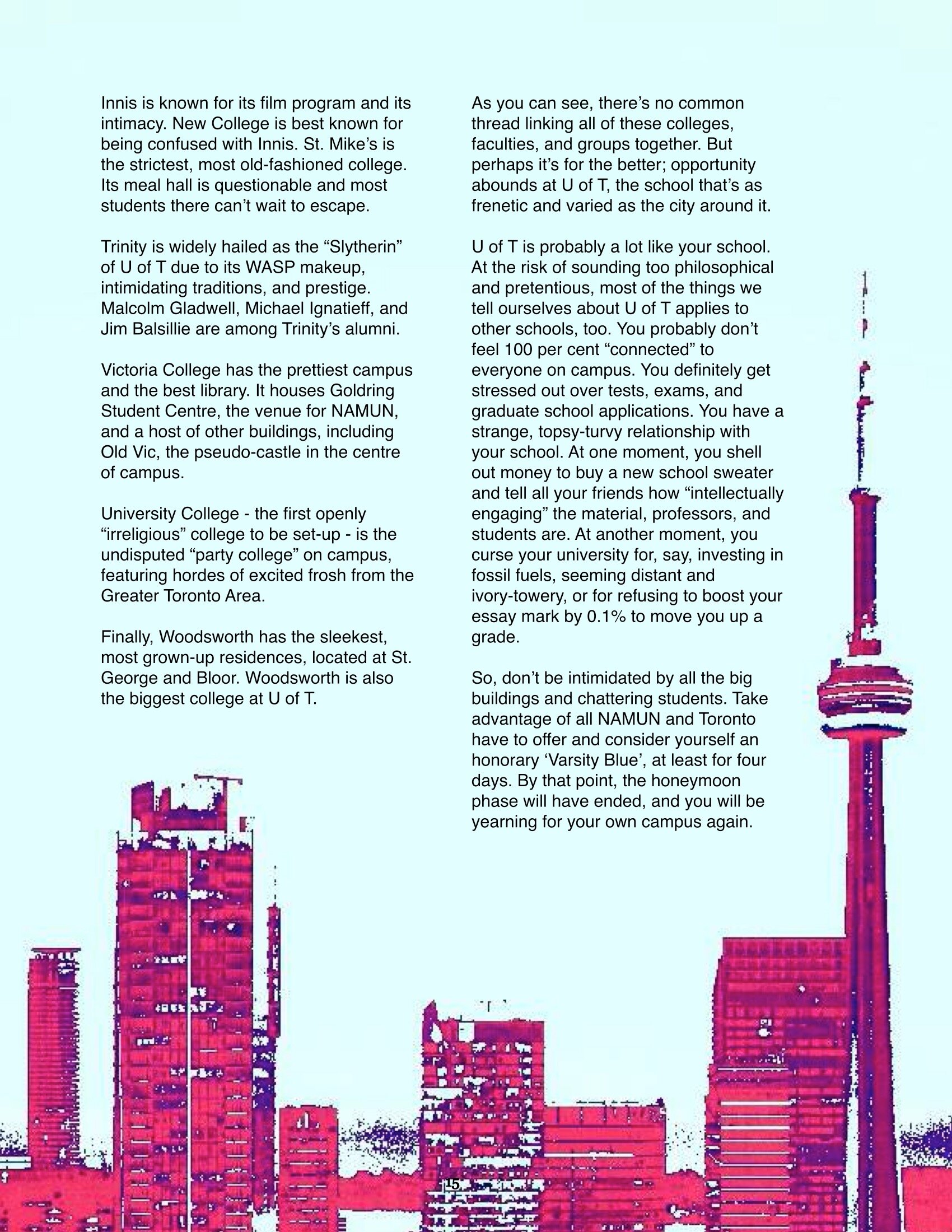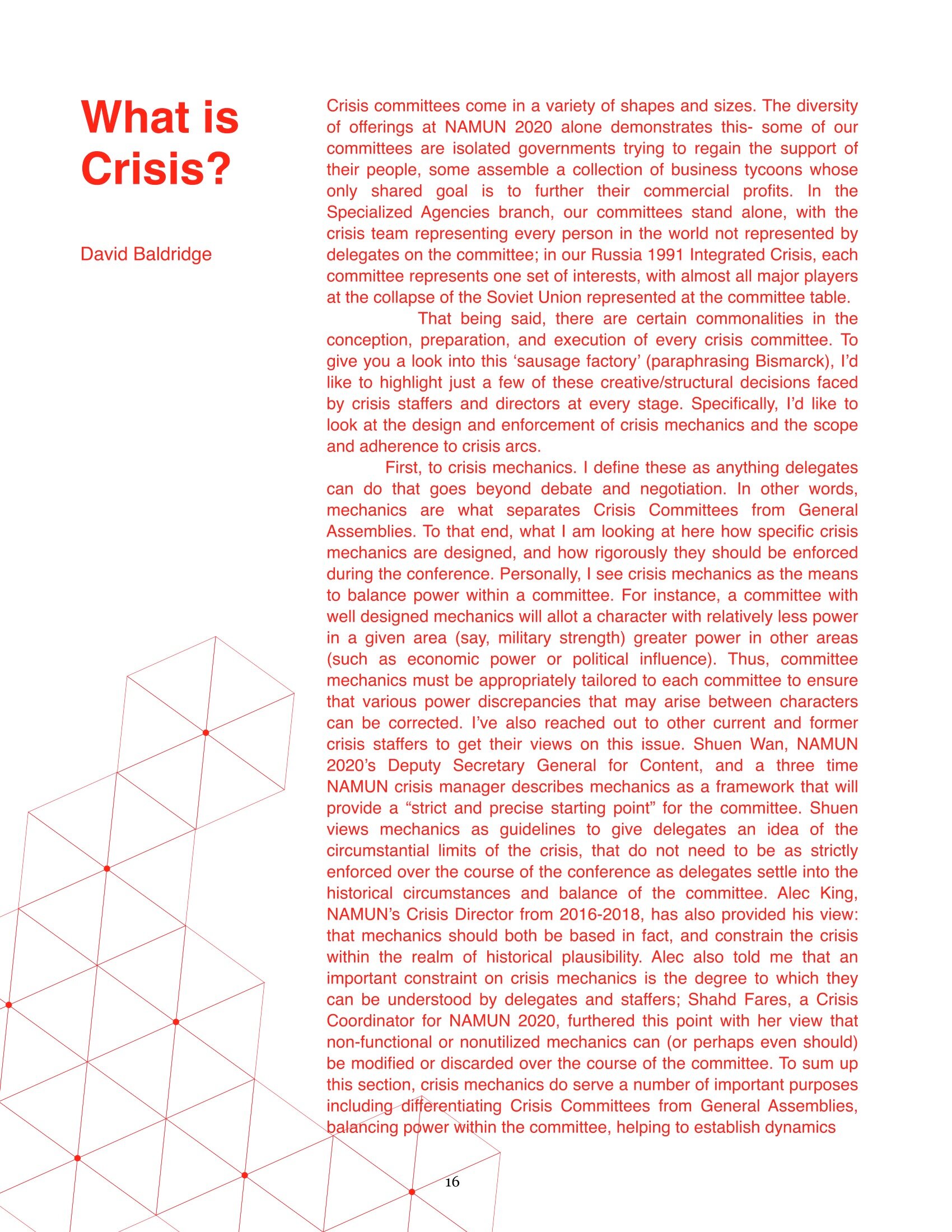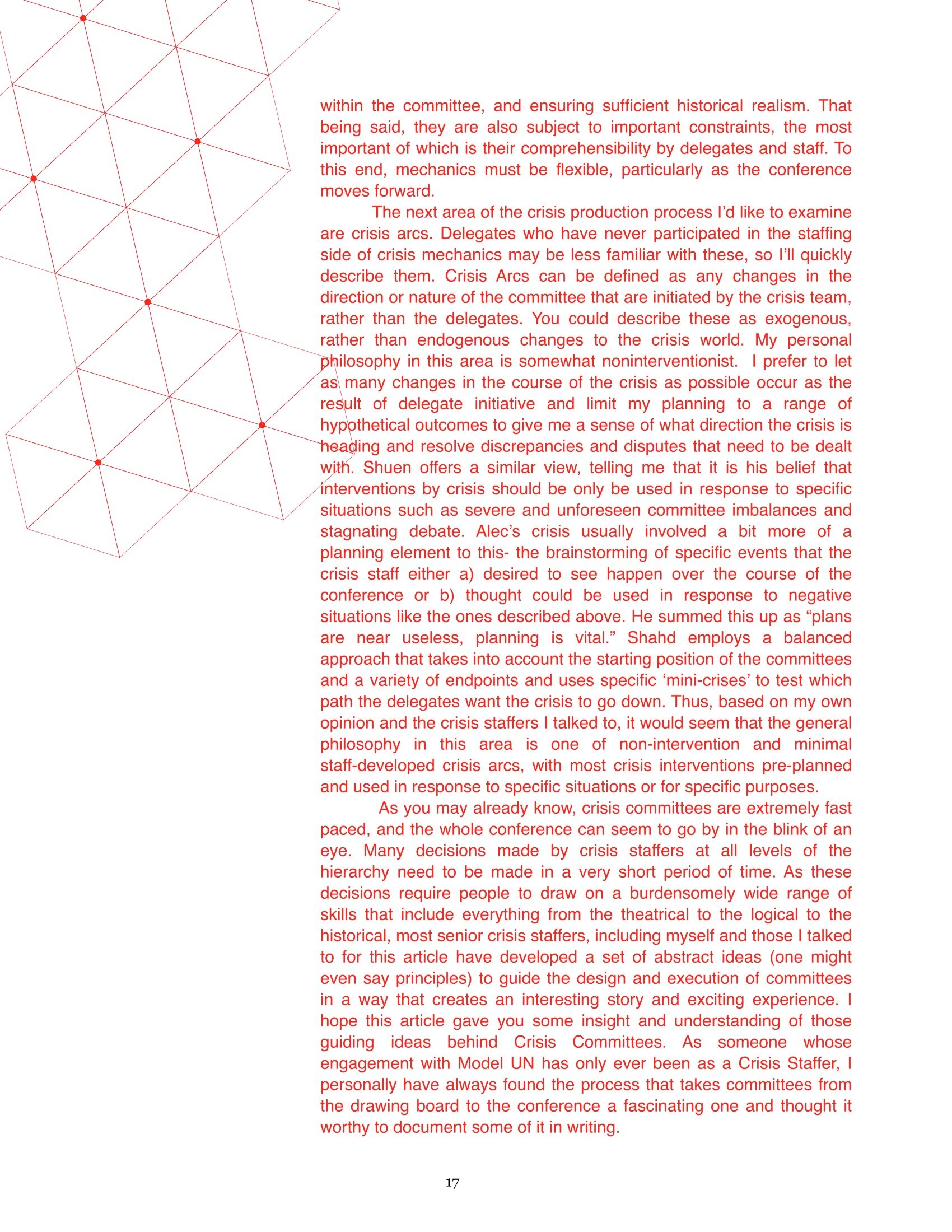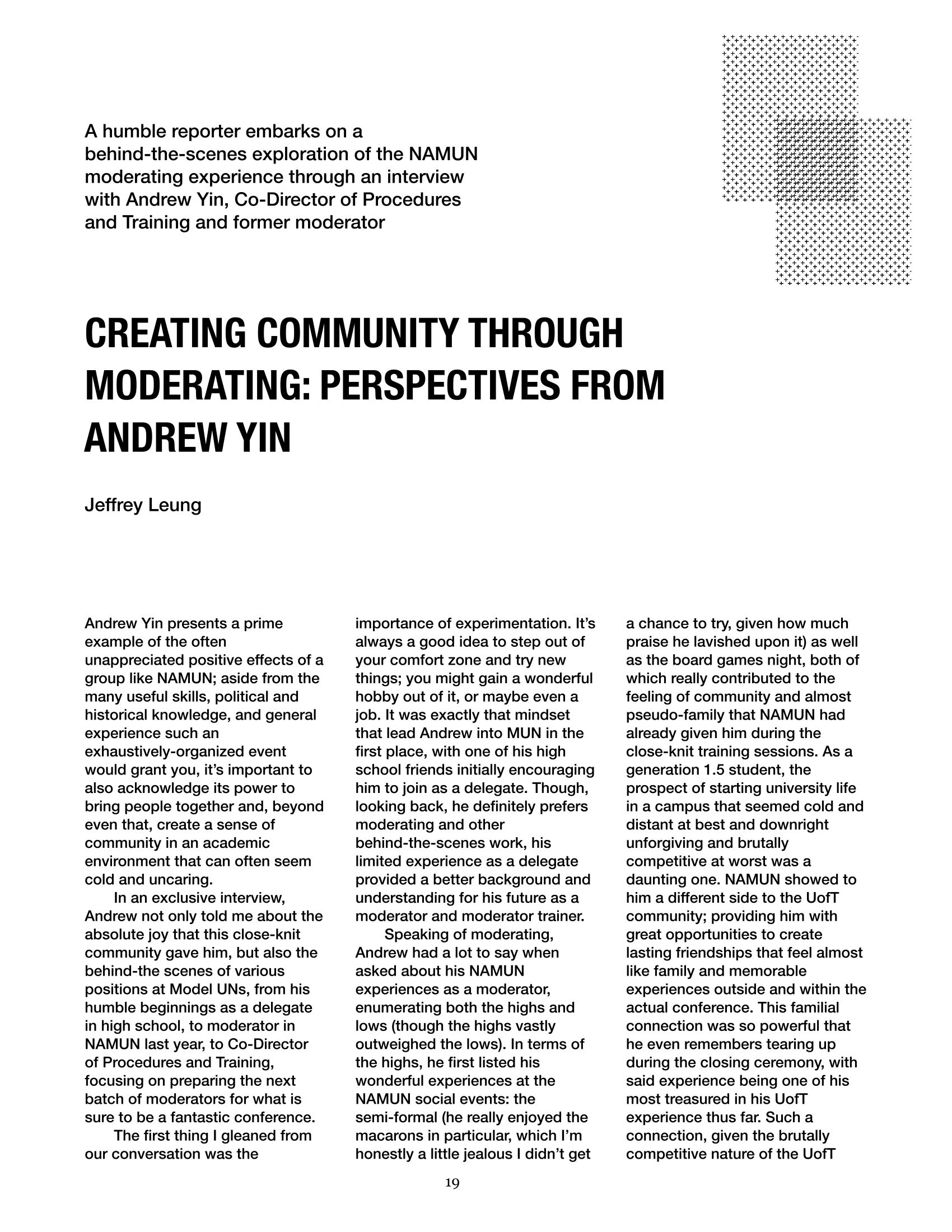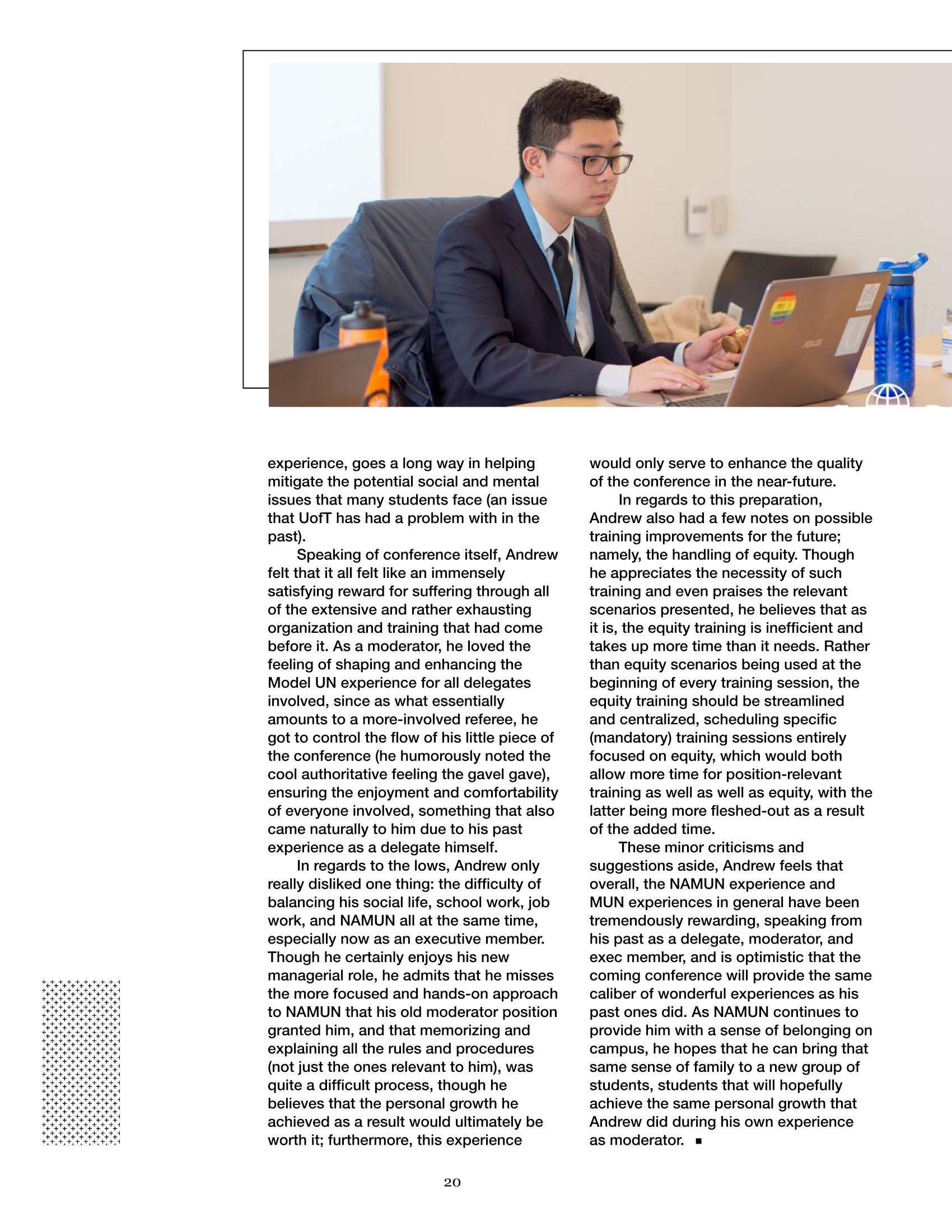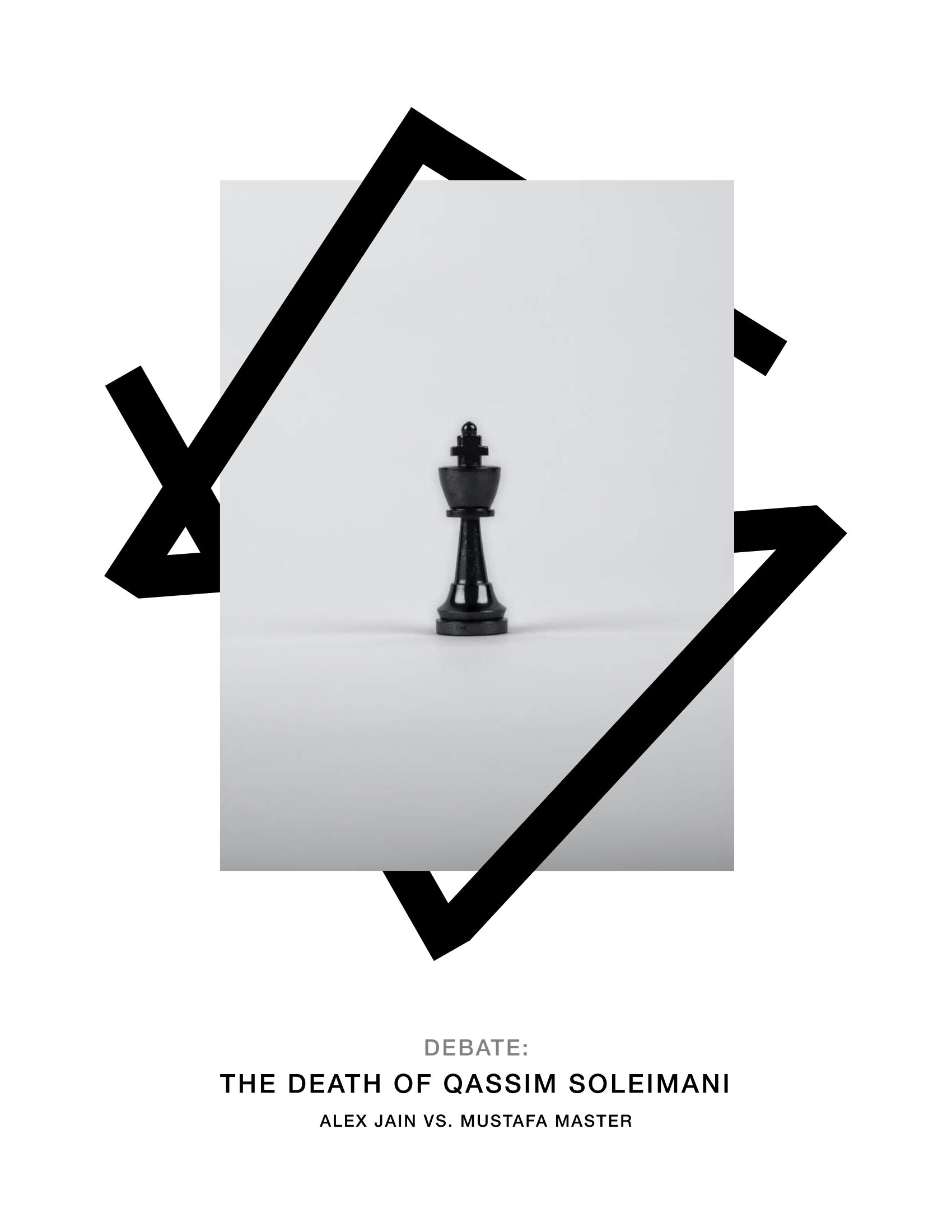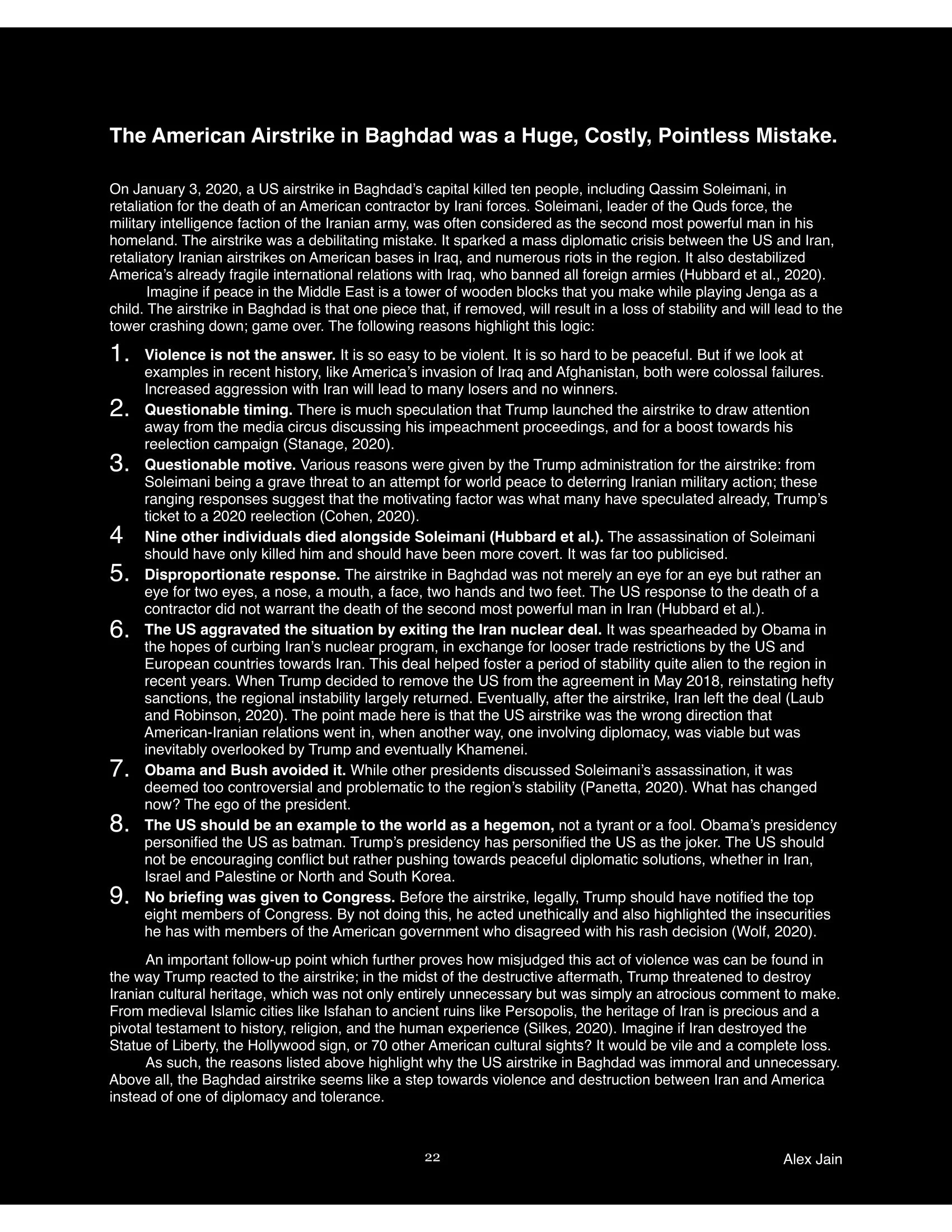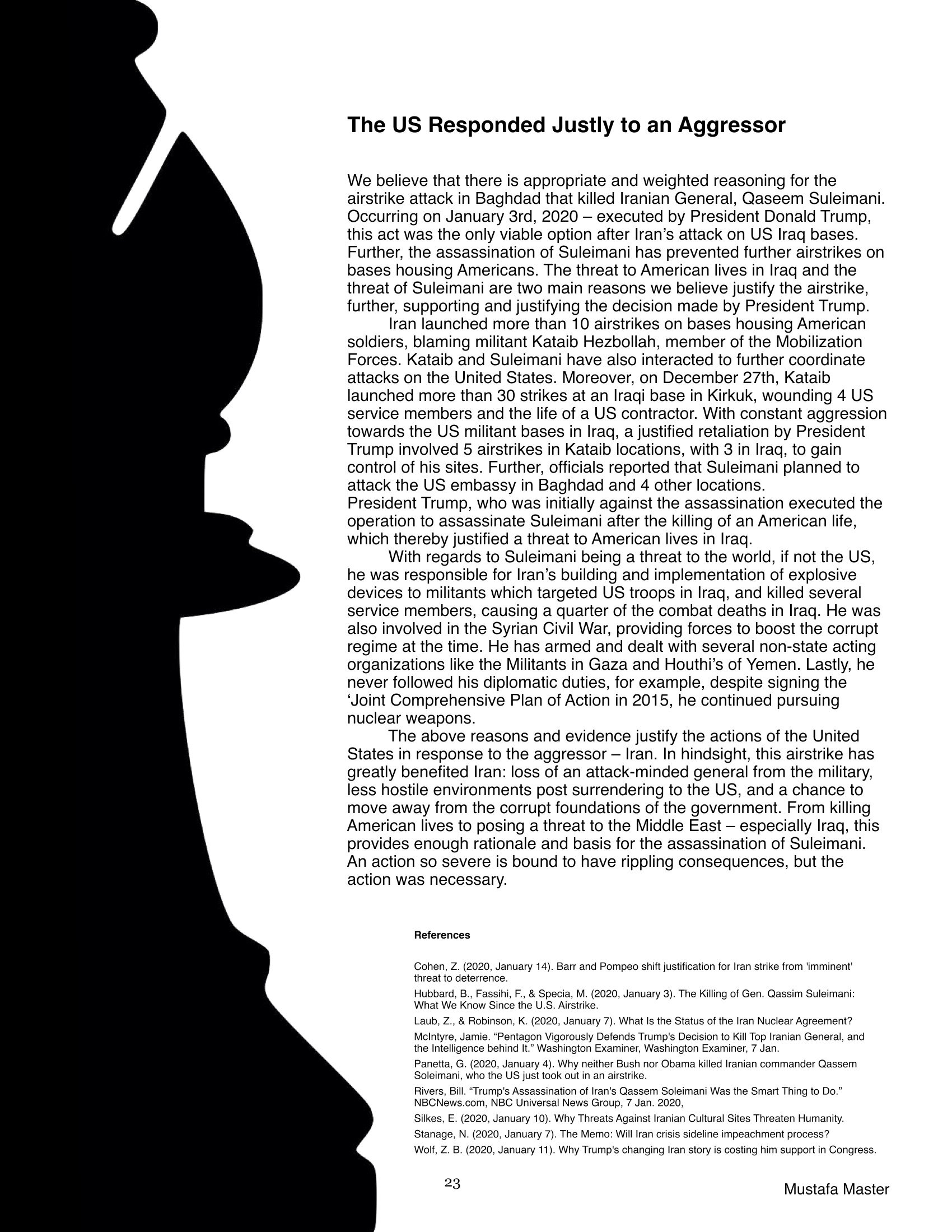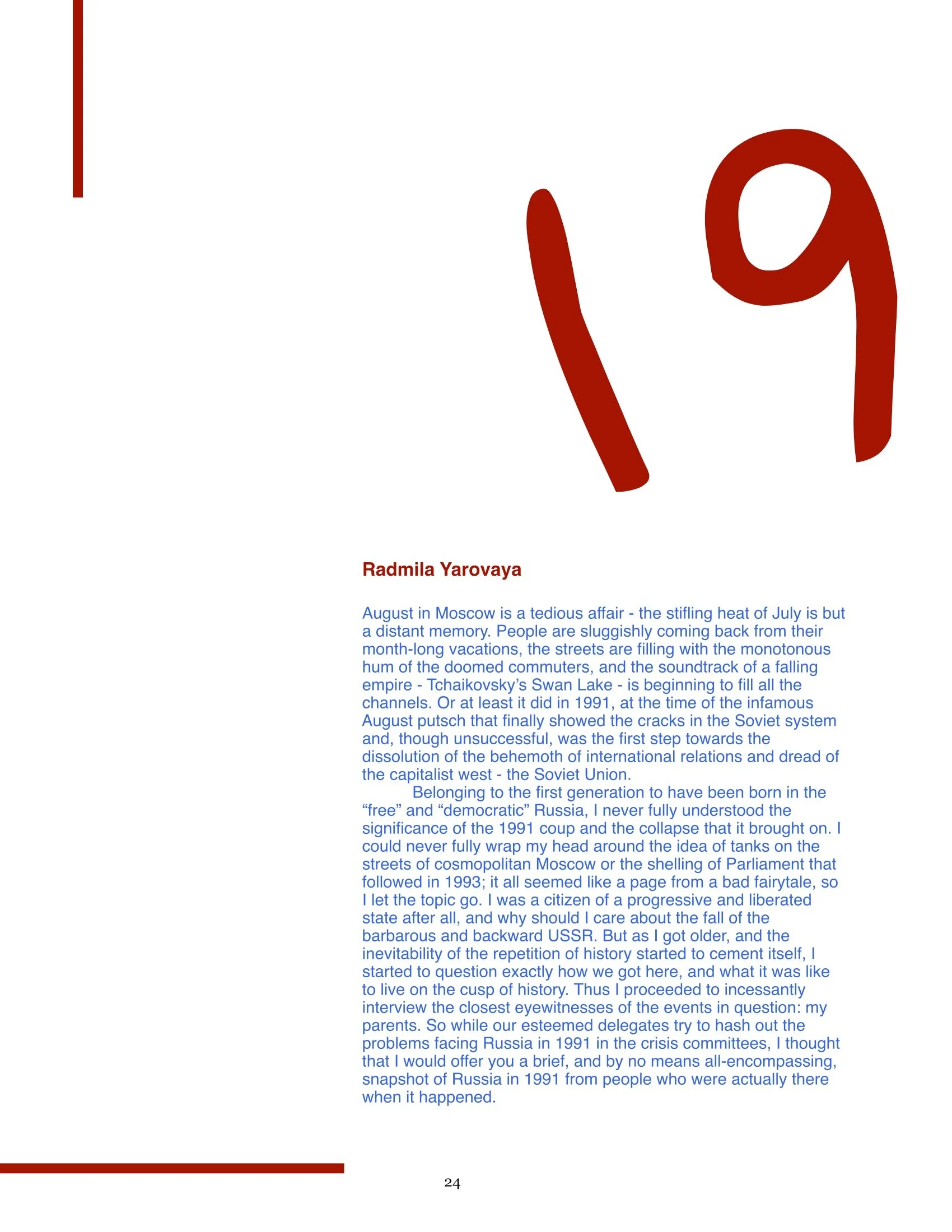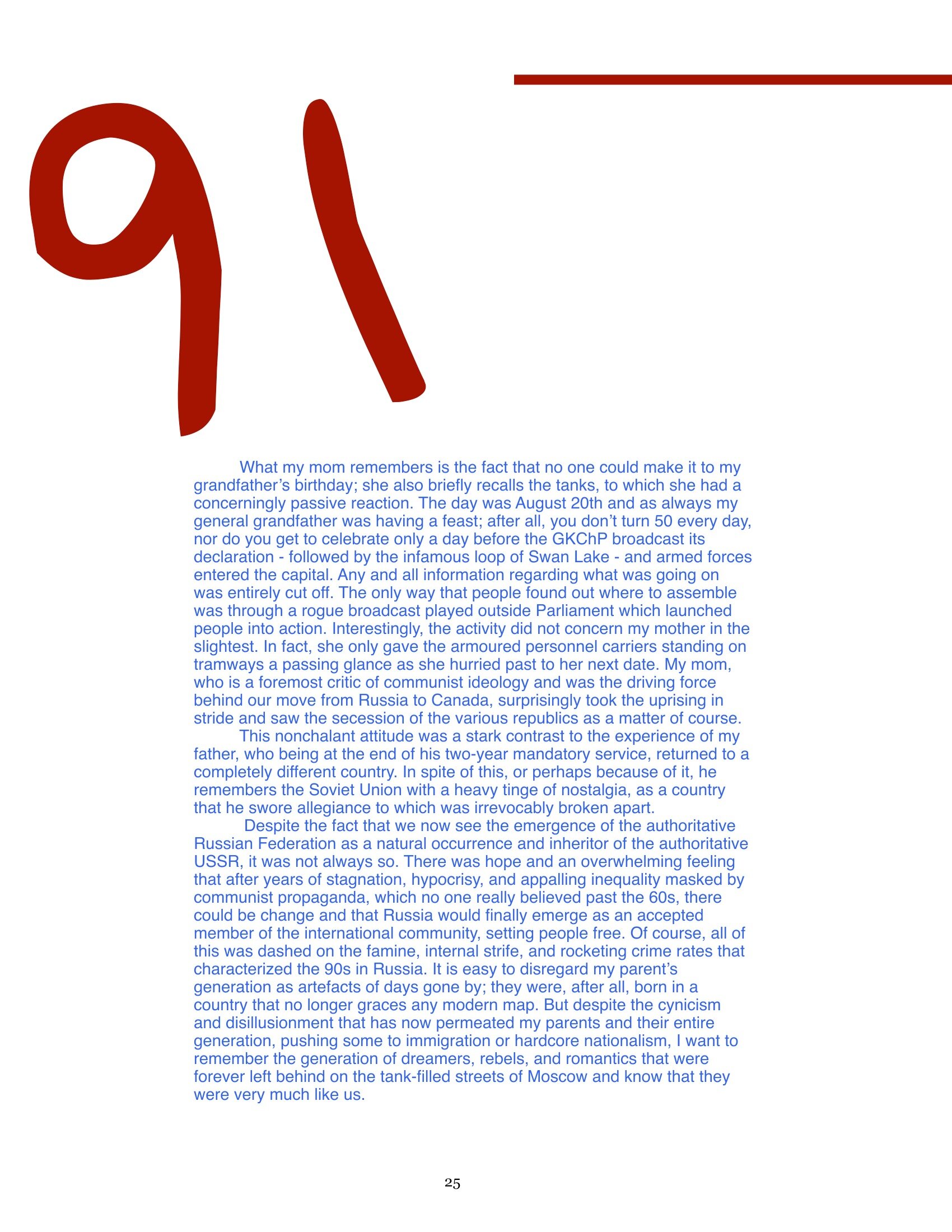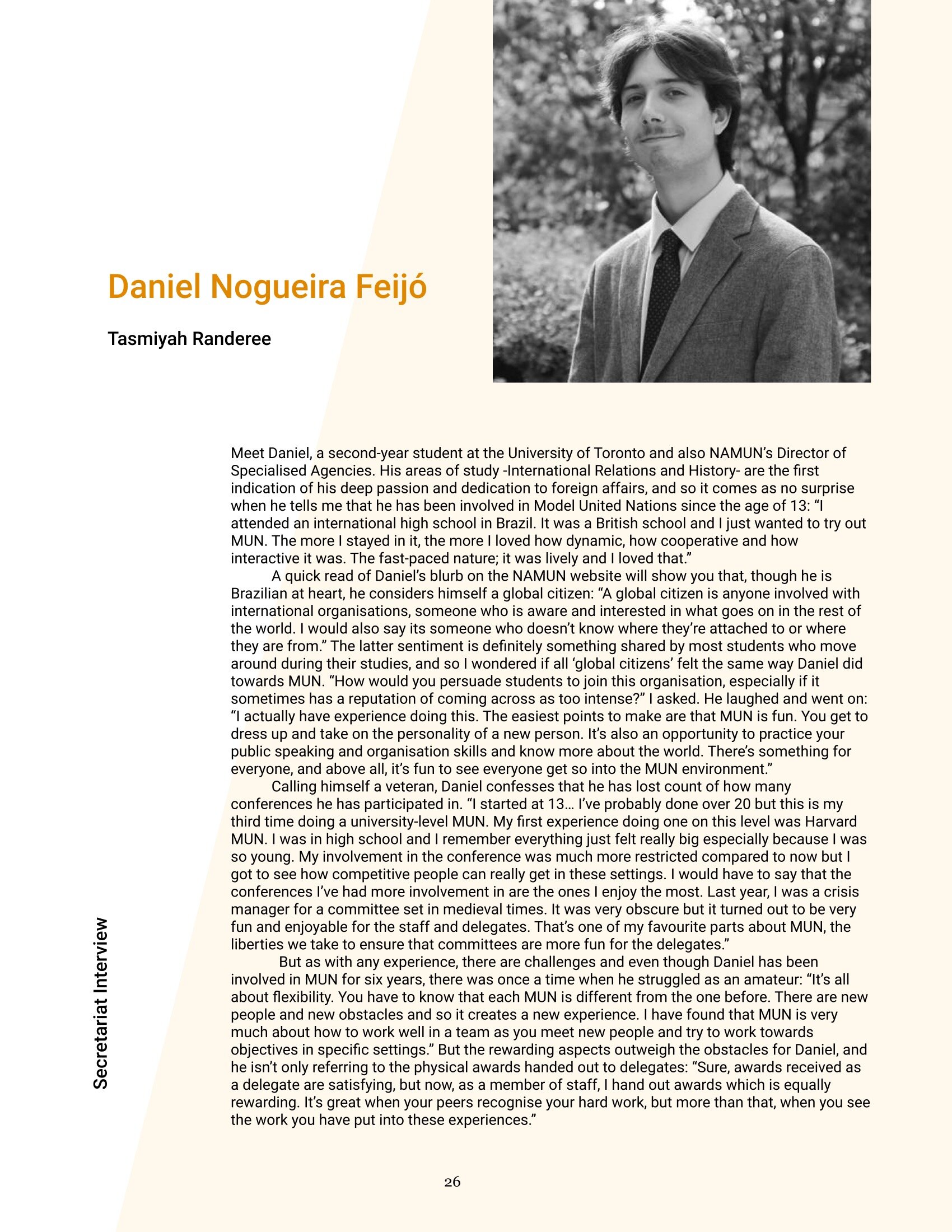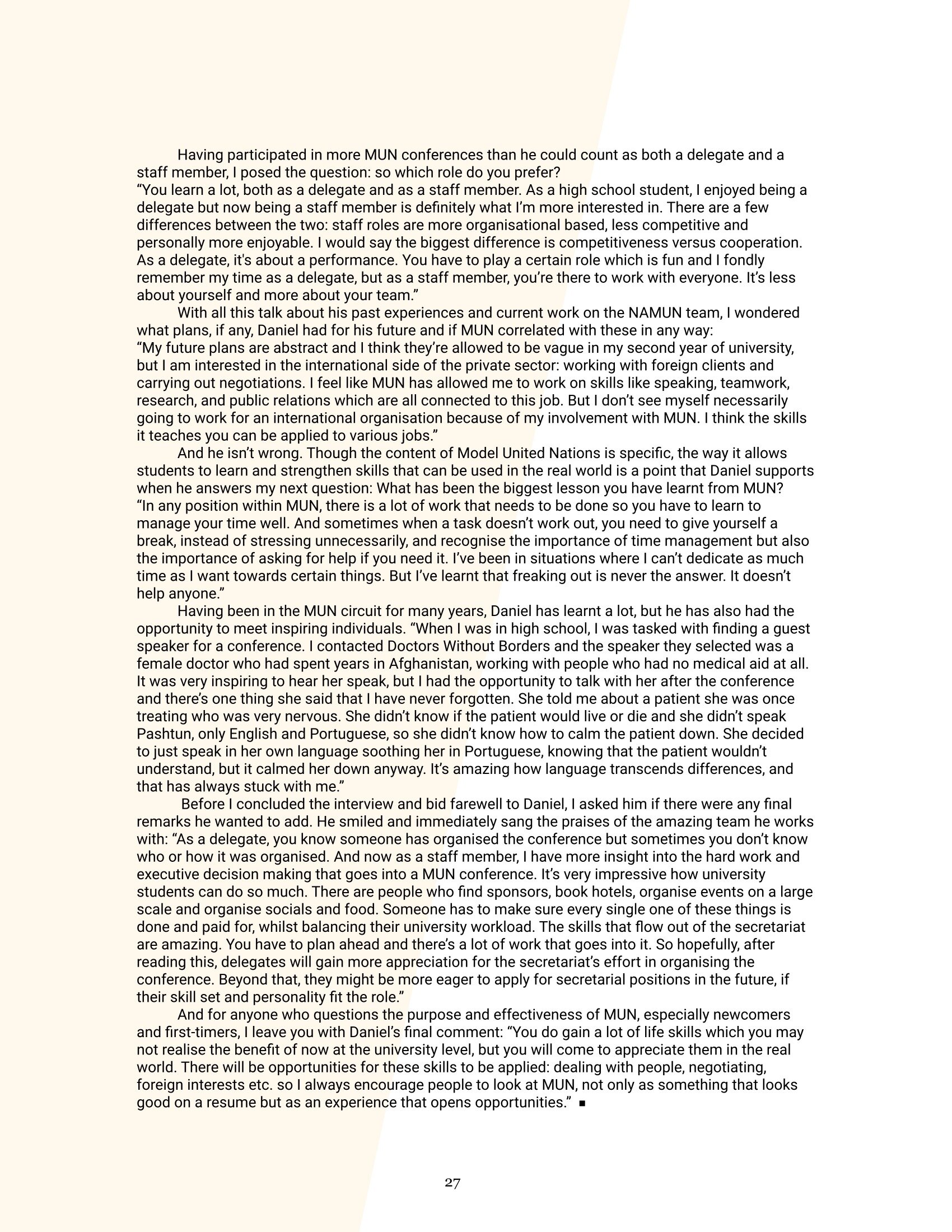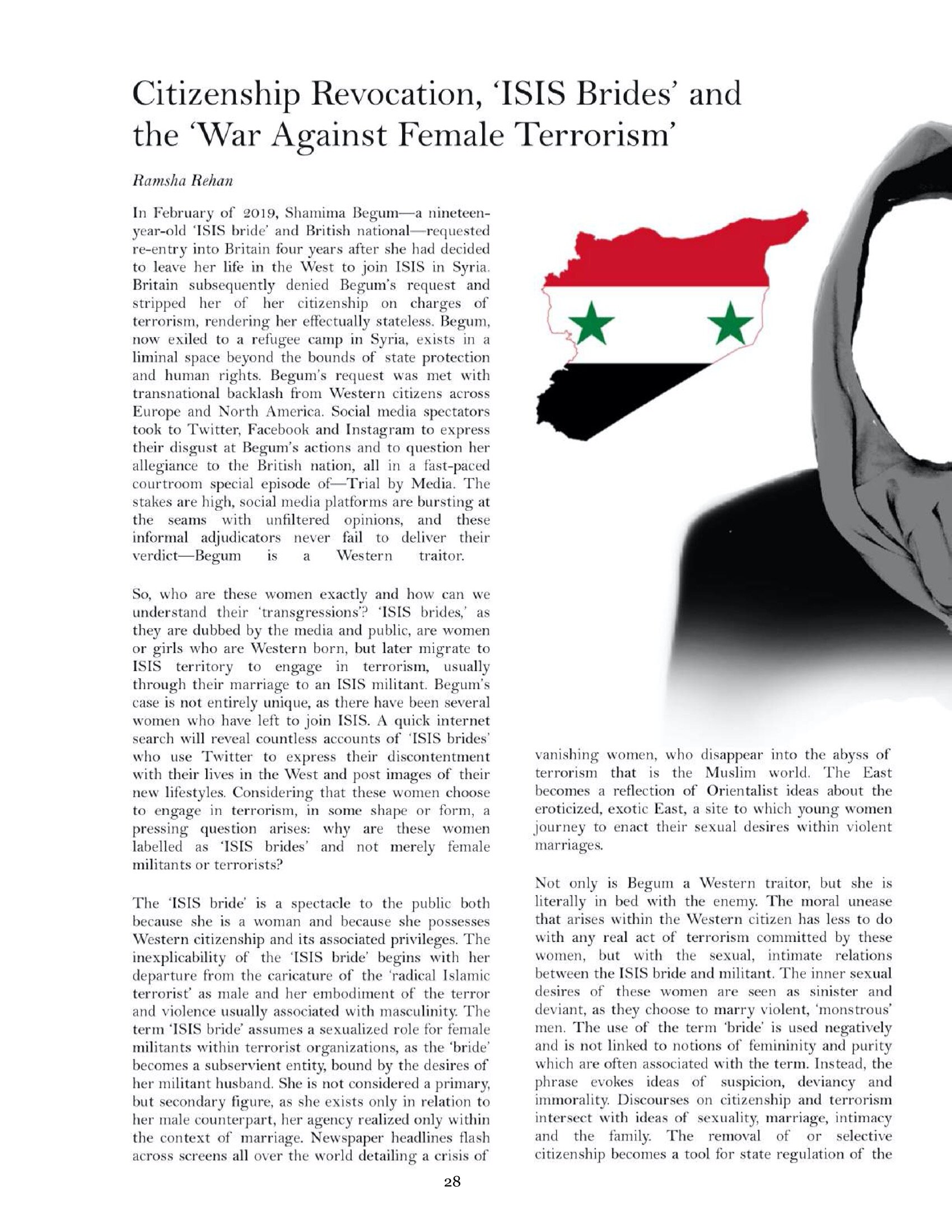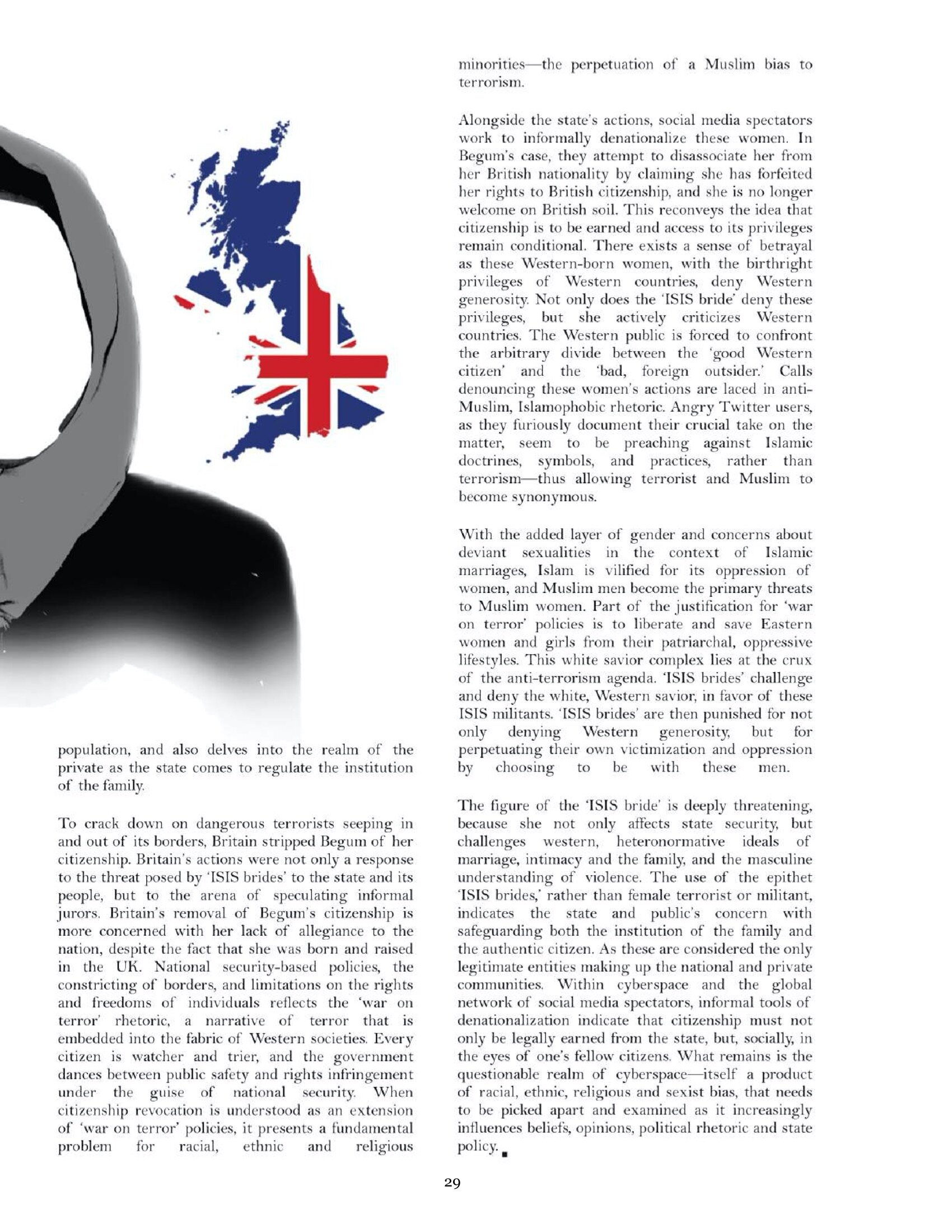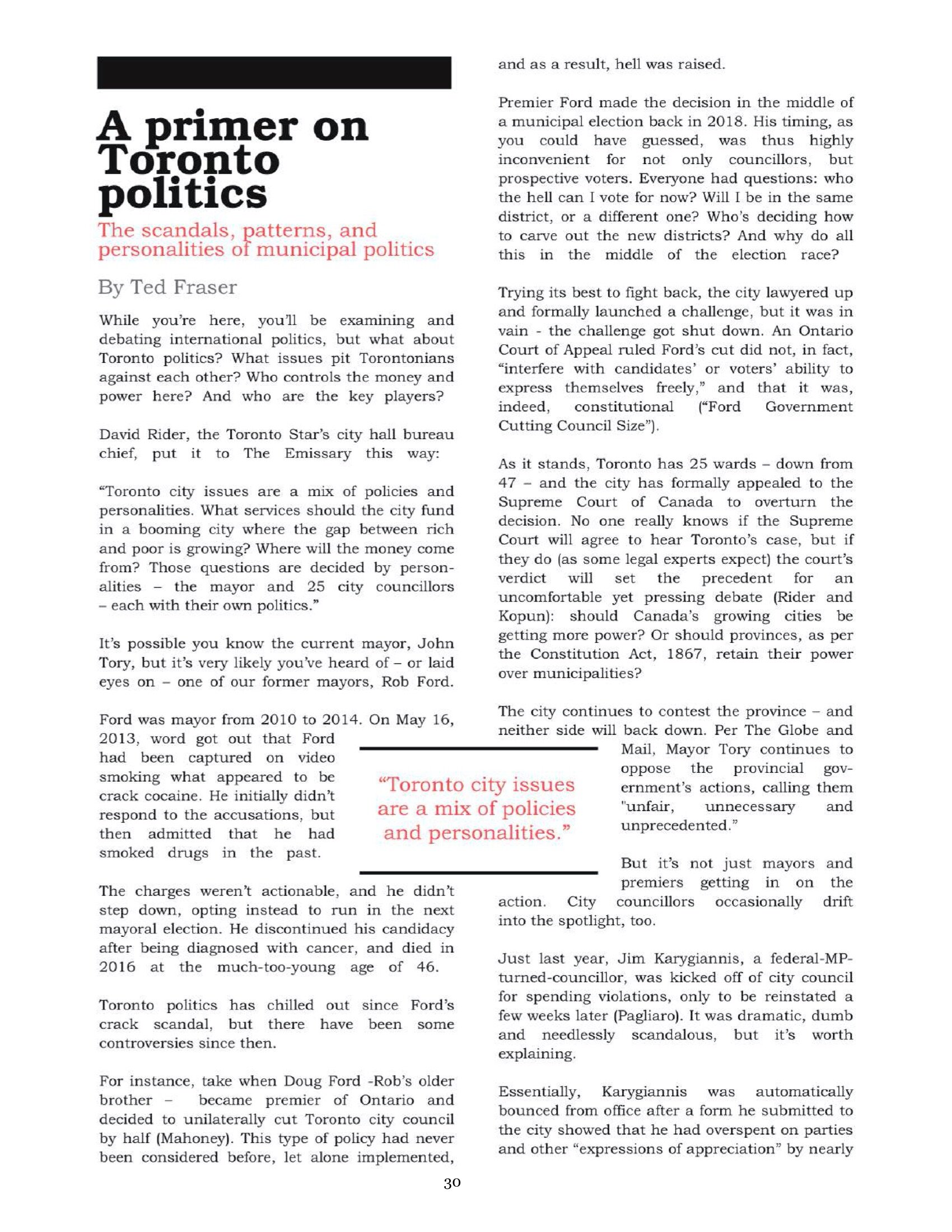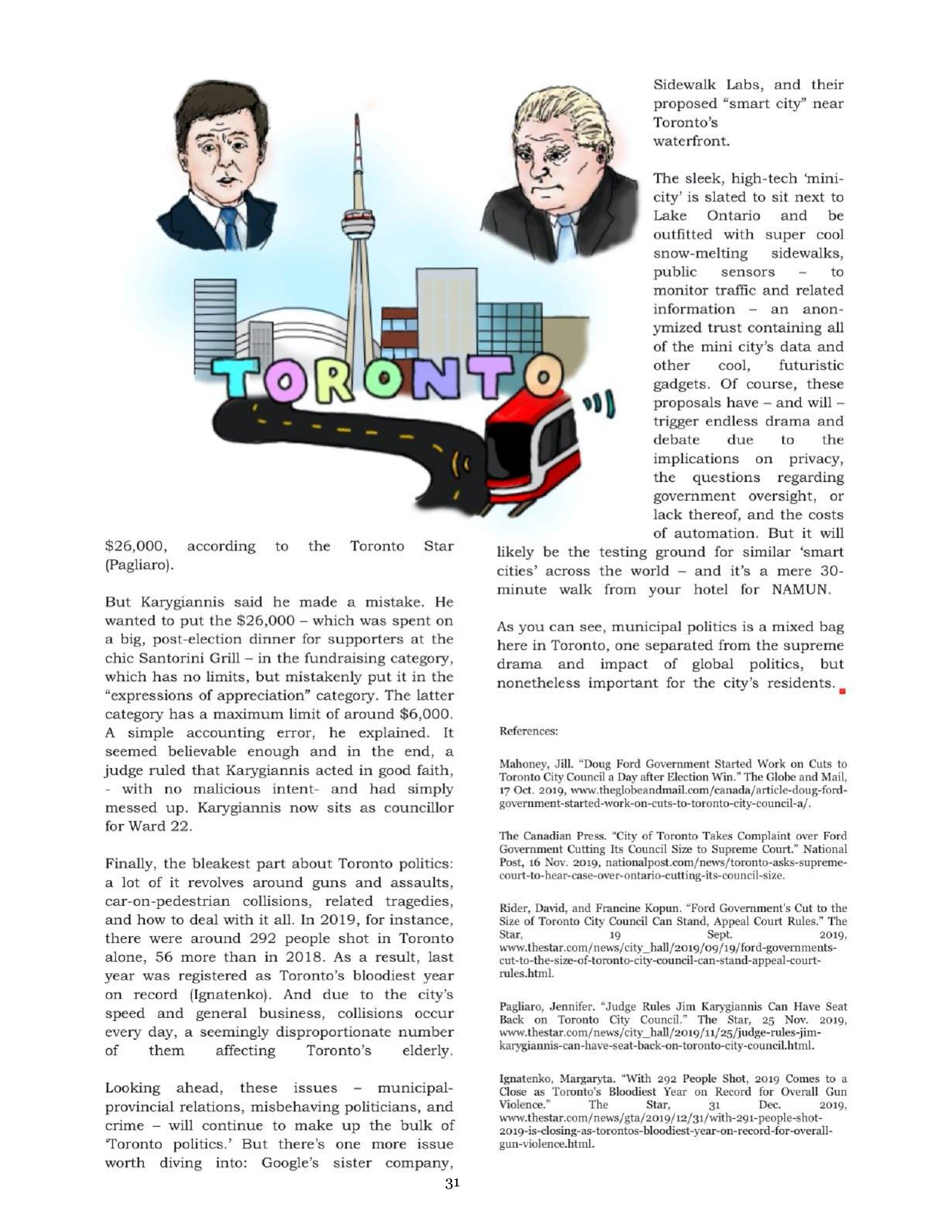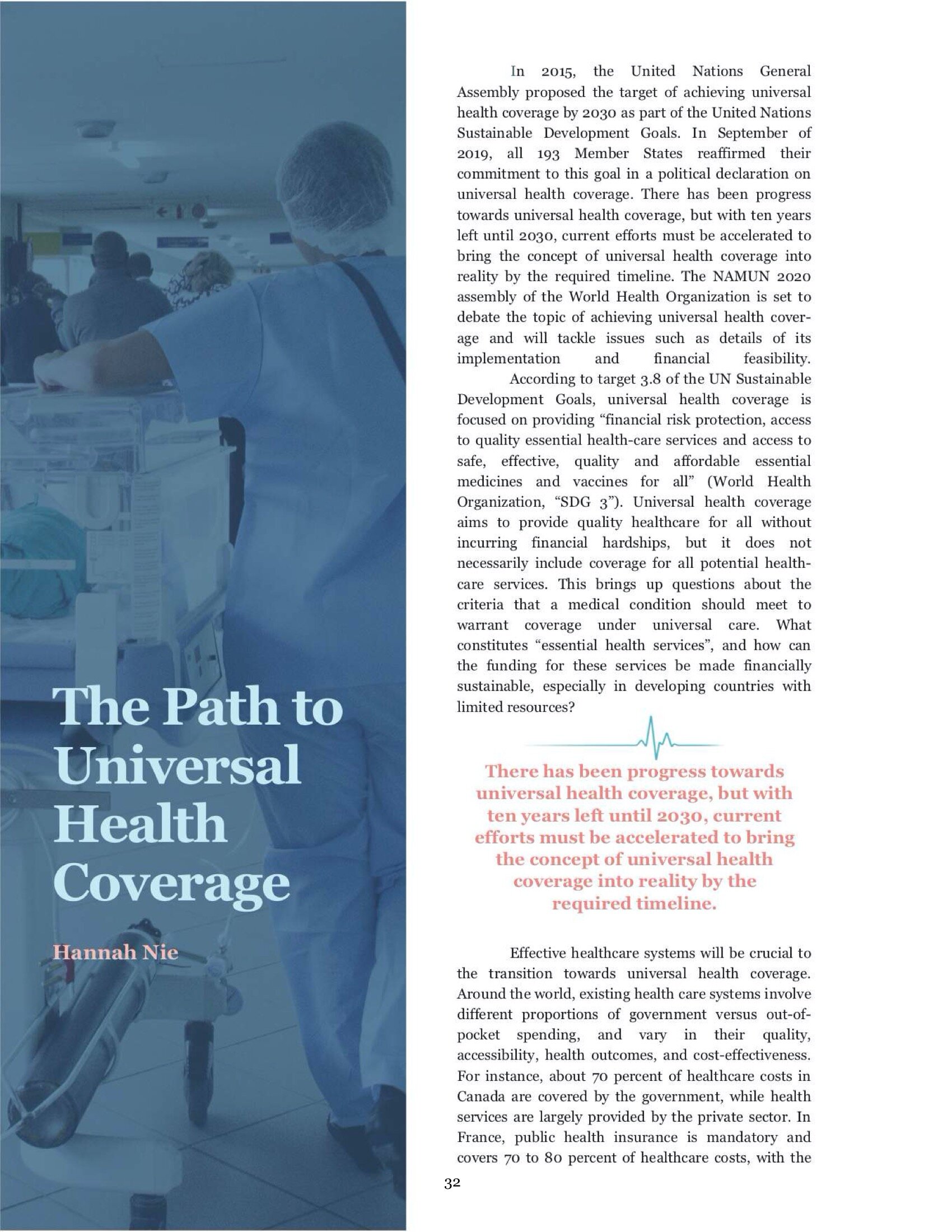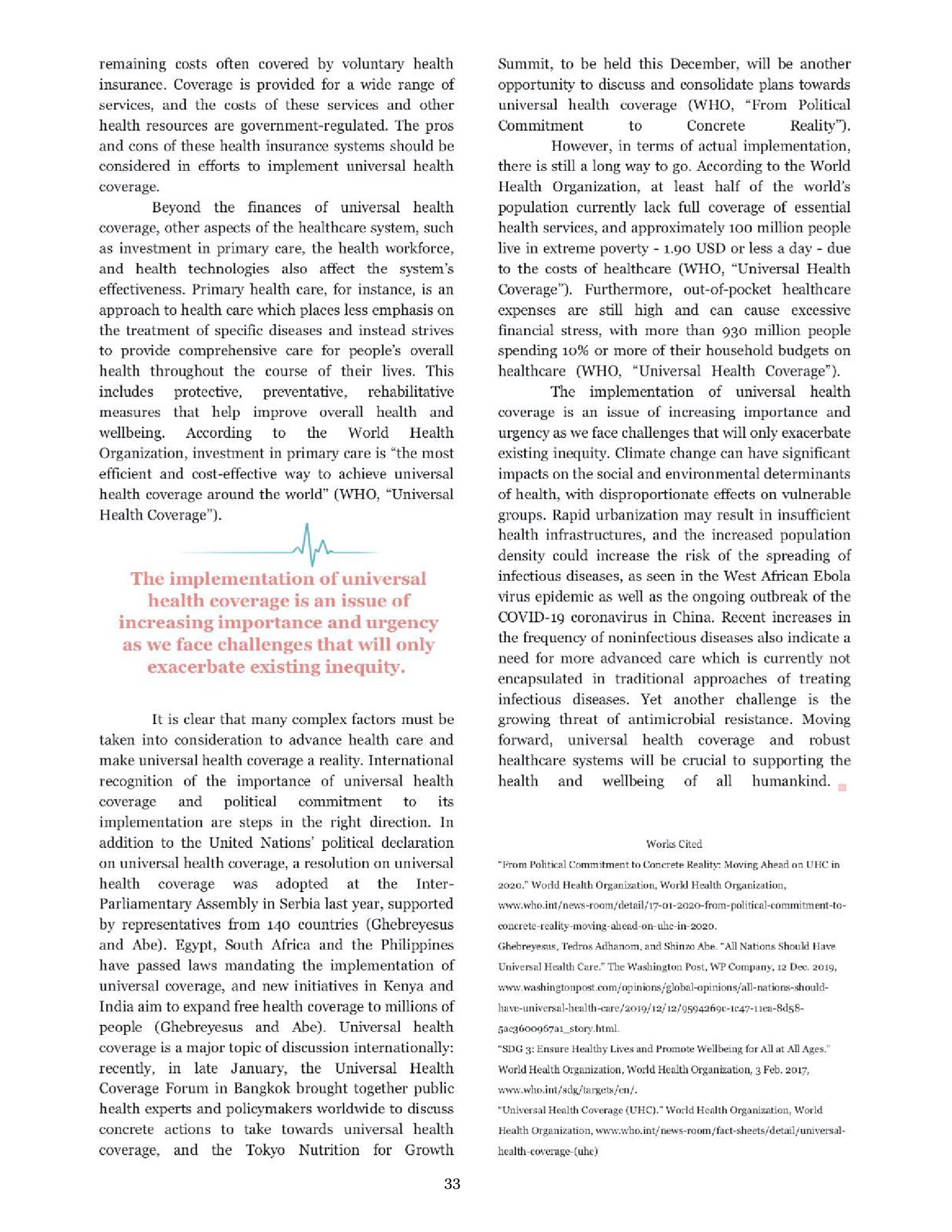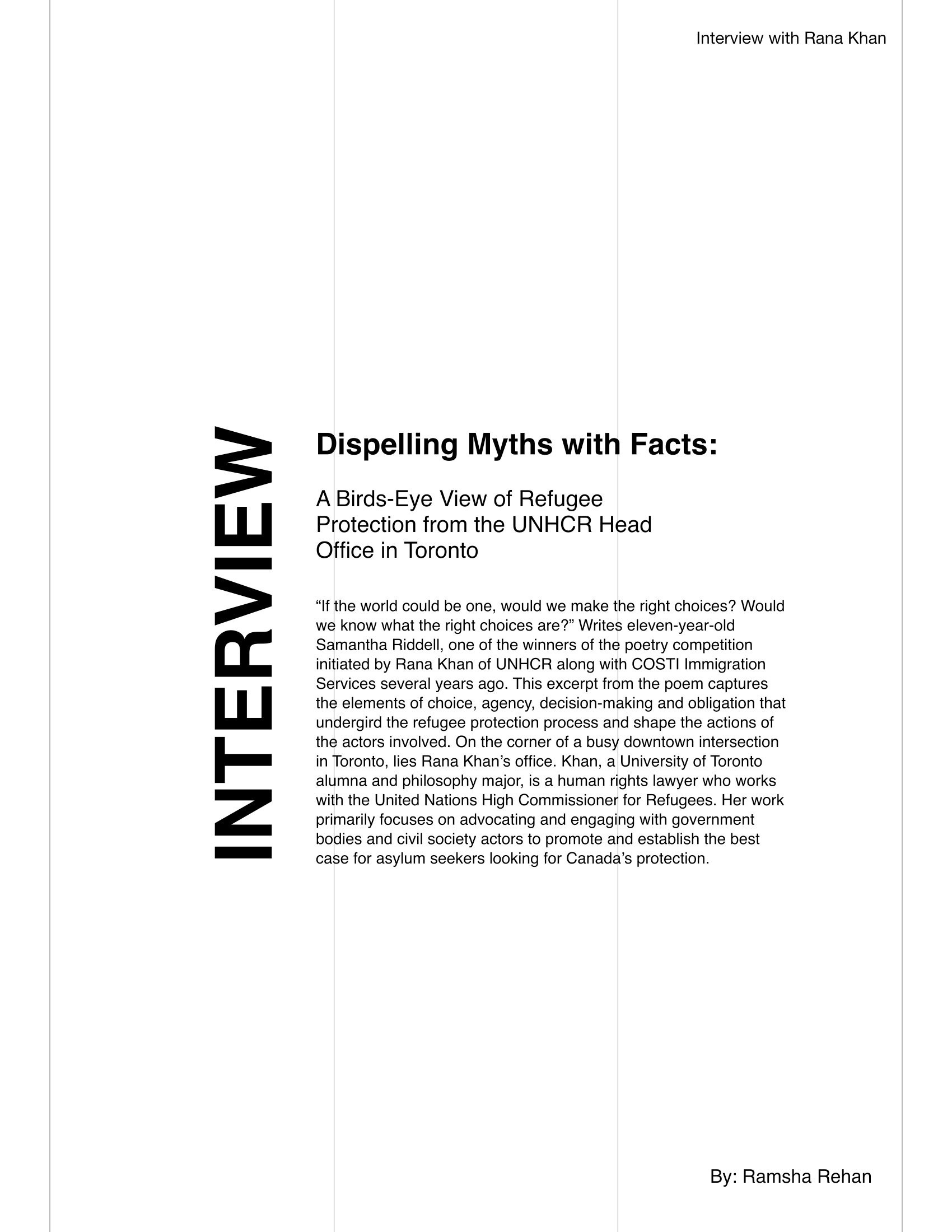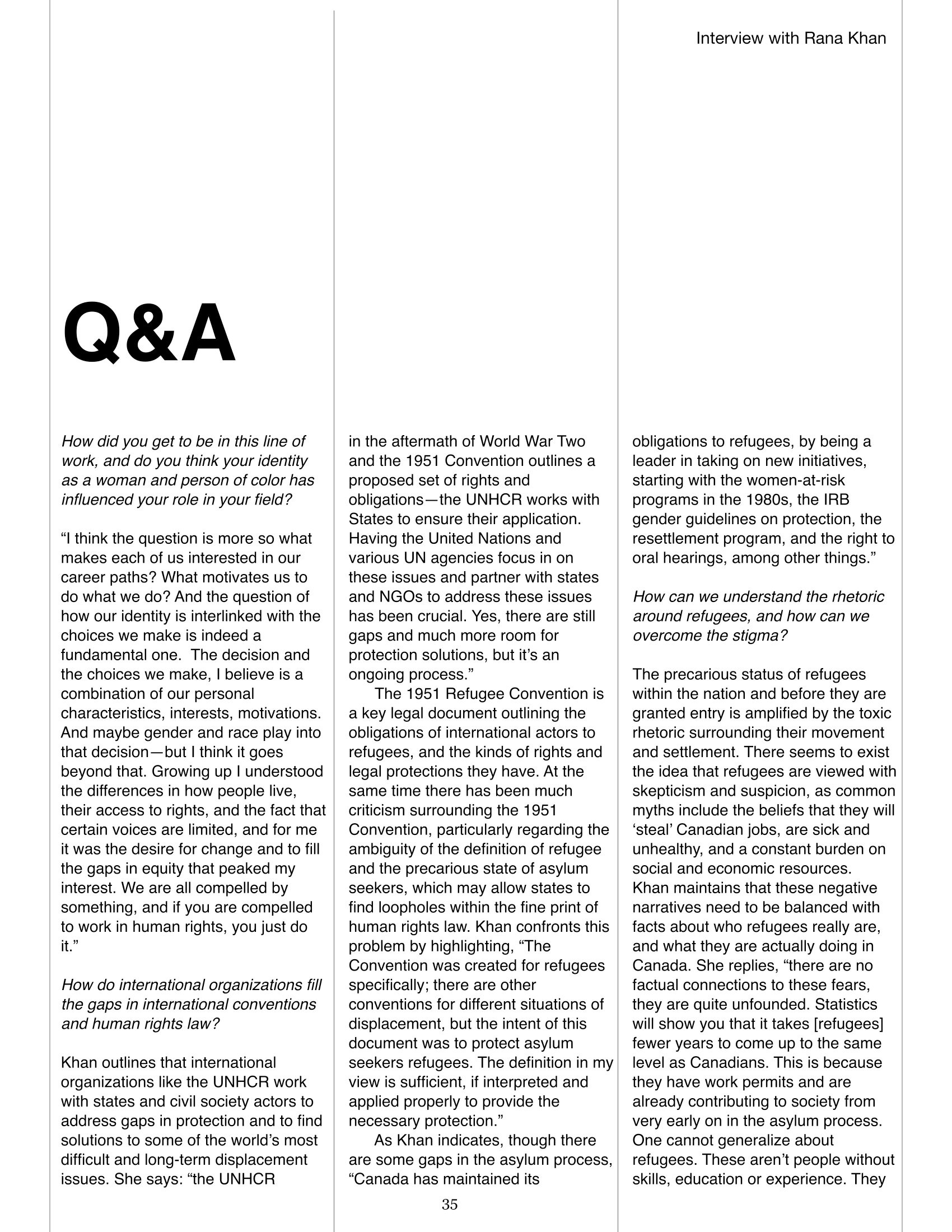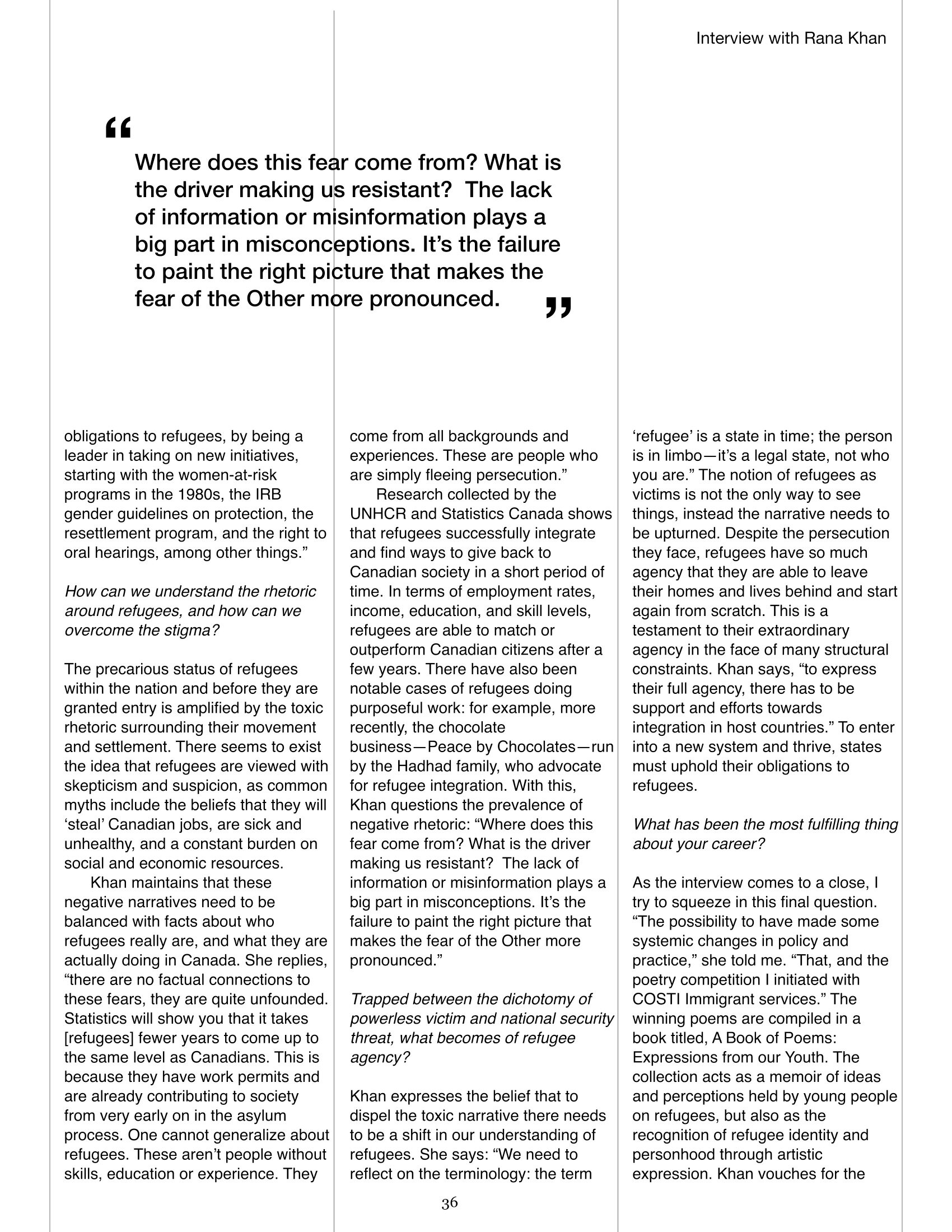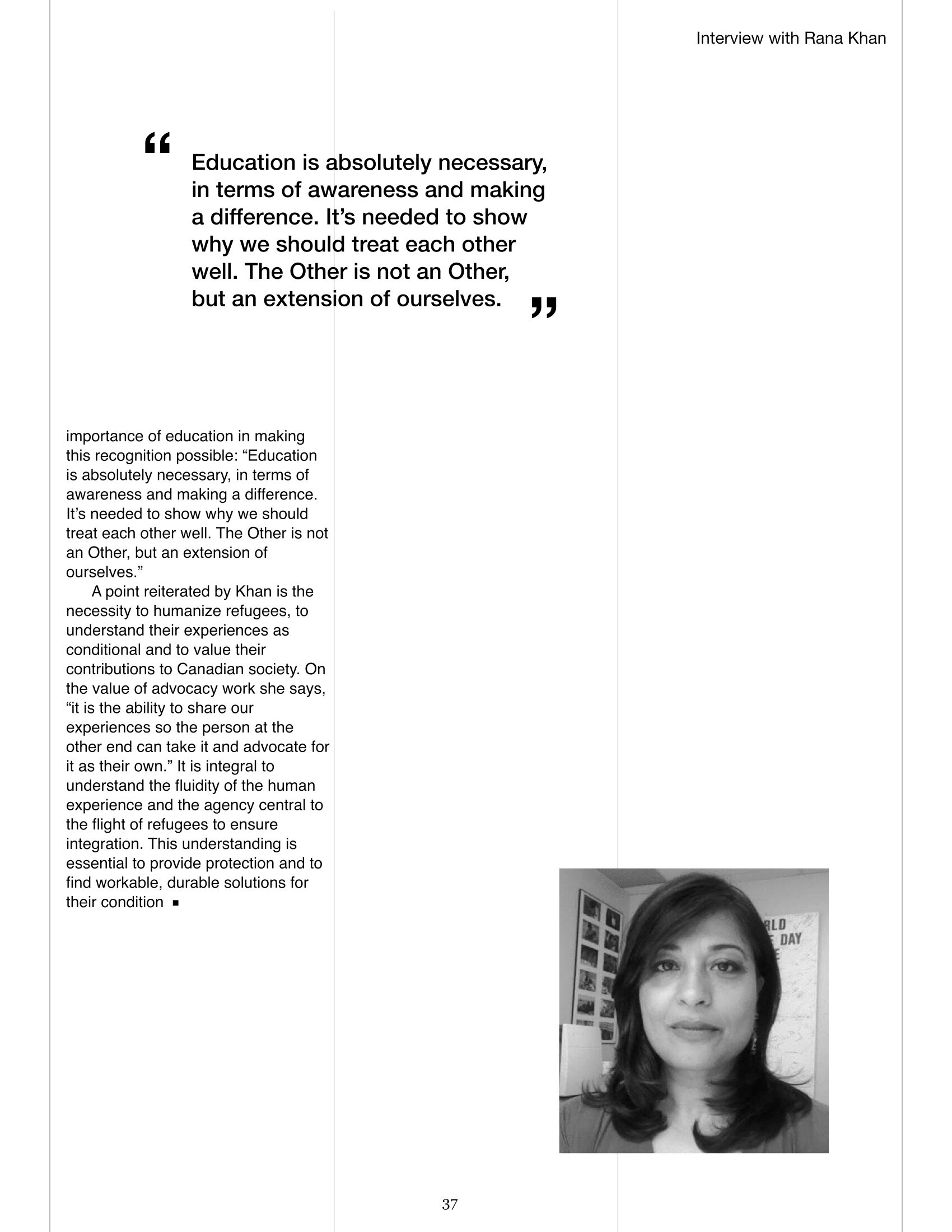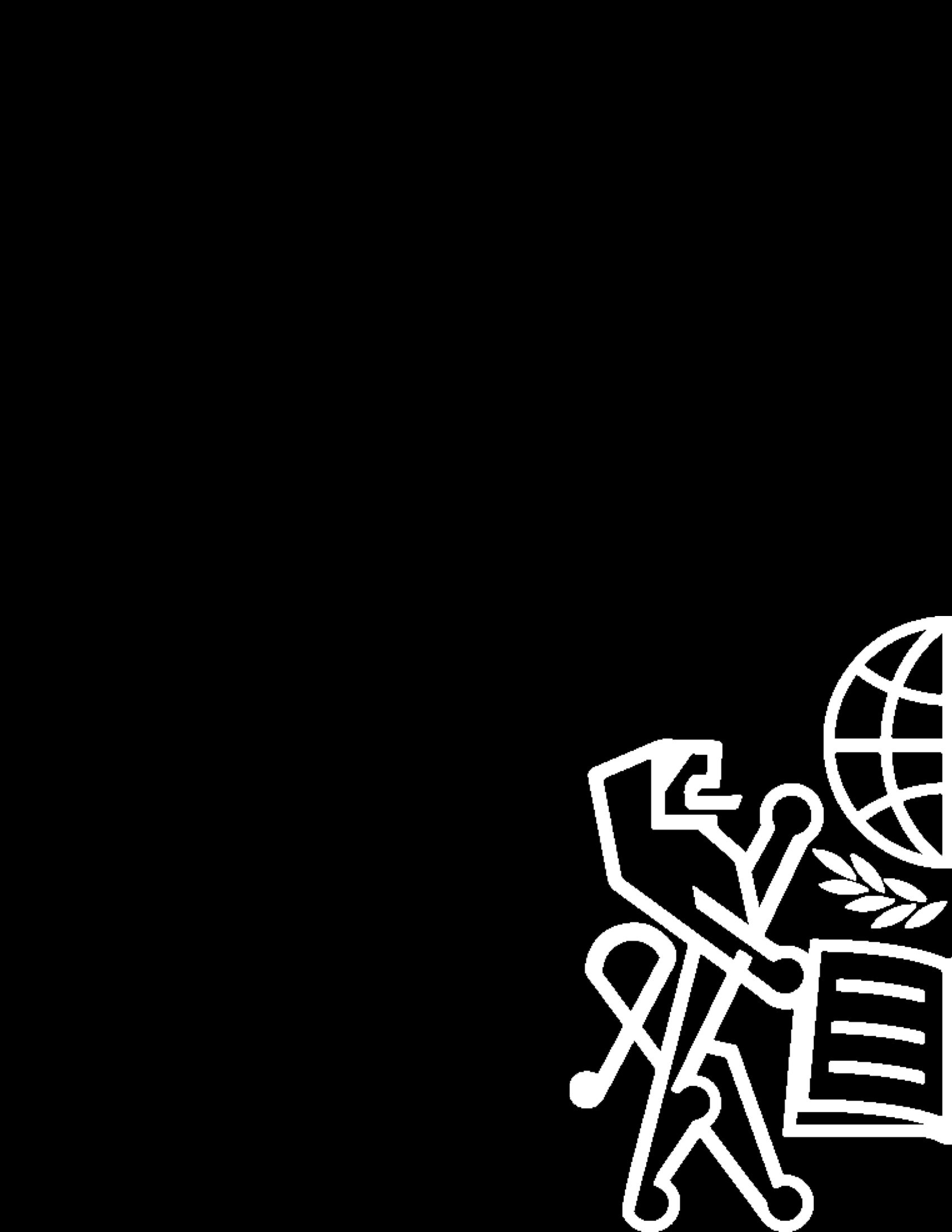Dispelling Myths with Facts: Birds-Eye View of Refugee Protection from the UNHCR office in Toronto
By Ramsha Rehan
“If the world could be one, would we make the right choices? Would we know what the right choices are?” Writes eleven-year-old Samantha Riddell, one of the winners of the poetry competition initiated by Rana Khan of UNHCR along with COSTI Immigration Services several years ago. This excerpt from the poem captures the elements of choice, agency, decision-making and obligation that undergird the refugee protection process and shape the actions of the actors involved. On the corner of a busy downtown intersection in Toronto, lies Rana Khan's office. Khan, a/University of Toronto alumna and philosophy major, is a human rights lawyer who works with the United Nations High Commissioner for Refugees. Her work primarily focuses on advocating and engaging with government bodies and civil society actors to promote and establish the best case for asylum seekers looking for Canada’s protection.
Q&A
How did you get to be in this line of work, and do you think your identity as a woman and person of color has influenced your role in your field?
“I think the question is more so what makes each of us interested in our career paths? What motivates us to do what we do? And the question of how our identity is interlinked with the choices we make is indeed a fundamental one. The decision and the choices we make, I believe is a combination of our personal characteristics, interests, motivations. And maybe gender and race play into that decision—but I think it goes beyond that. Growing up I understood the differences in how people live, their access to rights, and the fact that certain voices are limited, and for me, it was the desire for change and to fill the gaps in equity that peaked my interest. We are all compelled by something, and if you are compelled to work in human rights, you just do it.”
How do international organizations fill the gaps in international conventions and human rights law?
Khan outlines that international organizations like the UNHCR work with states and civil society actors to address gaps in protection and to find solutions to some of the world’s most difficult and long-term displacement issues. She says: “the UNHCR in the aftermath of World War Two and the 1951 Convention outlines a proposed set of rights and obligations—the UNHCR works with States to ensure their application. Having the United Nations and various UN agencies focus in on these issues and partner with states and NGOs to address these issues has been crucial. Yes, there are still gaps and much more room for protection solutions, but it’s an ongoing process.”
The 1951 Refugee Convention is a key legal document outlining the obligations of international actors to refugees and the kinds of rights and legal protections they have. At the same time, there has been much criticism surrounding the 1951 Convention, particularly regarding the ambiguity of the definition of refugee and the precarious state of asylum seekers, which may allow states to find loopholes within the fine print of human rights law. Khan confronts this problem by highlighting, “The Convention was created for refugees specifically; there are other conventions for different situations of displacement, but the intent of this document was to protect asylum seekers refugees. The definition in my view is sufficient if interpreted and applied properly to provide the necessary protection.”
As Khan indicates, though there are some gaps in the asylum process, “Canada has maintained its obligations to refugees, by being a leader in taking on new initiatives, starting with the women-at-risk programs in the 1980s, the IRB gender guidelines on protection, the resettlement program, and the right to oral hearings, among other things.”
How can we understand the rhetoric around refugees, and how can we overcome the stigma?
The precarious status of refugees within the nation and before they are granted entry is amplified by the toxic rhetoric surrounding their movement and settlement. There seems to exist the idea that refugees are viewed with skepticism and suspicion, as common myths include the beliefs that they will ‘steal’ Canadian jobs, are sick and unhealthy, and a constant burden on social and economic resources.
Khan maintains that these negative narratives need to be balanced with facts about who refugees really are, and what they are actually doing in Canada. She replies, “there are no factual connections to these fears, they are quite unfounded. Statistics will show you that it takes [refugees] fewer years to come up to the same level as Canadians. This is because they have work permits and are already contributing to society from very early on in the asylum process. One cannot generalize about refugees. These aren’t people without skills, education or experience. They come from all backgrounds and experiences. These are people who are simply fleeing persecution.” Research collected by the UNHCR and Statistics Canada shows that refugees successfully integrate and find ways to give back to Canadian society in a short period of time. In terms of employment rates, income, education, and skill levels, refugees are able to match or outperform Canadian citizens after a few years. There have also been notable cases of refugees doing purposeful work: for example, more recently, the chocolate business— Peace by Chocolates—run by the Hadhad family, who advocate for refugee integration. With this, Khan questions the prevalence of negative rhetoric: “Where does this fear come from? What is the driver making us resistant? The lack of information or misinformation plays a big part in misconceptions. It’s the failure to paint the right picture that makes the fear of the Other more pronounced.”
Trapped between the dichotomy of powerless victim and national security threat, what becomes of refugee agency?
Khan expresses the belief that to dispel the toxic narrative there needs to be a shift in our understanding of refugees. She says: “We need to reflect on the terminology: the term ‘refugee’ is a state in time; the person is in limbo—it’s a legal state, not who you are.” The notion of refugees as victims is not the only way to see things, instead the narrative needs to be upturned. Despite the persecution they face, refugees have so much agency that they are able to leave their homes and lives behind and start again from scratch. This is a testament to their extraordinary agency in the face of many structural constraints. Khan says, “to express their full agency, there has to be support and efforts towards integration in host countries.” To enter into a new system and thrive, states must uphold their obligations to refugees.
What has been the most fulfilling thing about your career?
As the interview comes to a close, I try to squeeze in this final question. “The possibility to have made some systemic changes in policy and practice,” she told me. “That, and the poetry competition I initiated with COSTI Immigrant services.” The winning poems are compiled in a book titled, A Book of Poems: Expressions from our Youth. The collection acts as a memoir of ideas and perceptions held by young people on refugees, but also as the recognition of refugee identity and personhood through artistic expression. Khan vouches for the importance of education in making this recognition possible: “Education is absolutely necessary, in terms of awareness and making a difference. It’s needed to show why we should treat each other well. The Other is not an Other, but an extension of ourselves.”
A point reiterated by Khan is the necessity to humanize refugees, to understand their experiences as conditional and to value their contributions to Canadian society. On the value of advocacy work she says, “it is the ability to share our experiences so the person at the other end can take it and advocate for it as their own.” It is integral to understand the fluidity of the human experience and the agency central to the flight of refugees to ensure integration. This understanding is essential to provide protection and to find workable, durable solutions for their condition.
The Path to Universal Health Coverage
By Hannah Nie
In 2015, the United Nations General Assembly proposed the target of achieving universal health coverage by 2030 as part of the United Nations Sustainable Development Goals. In September of 2019, all 193 Member States reaffirmed their commitment to this goal in a political declaration on universal health coverage. There has been progress towards universal health coverage, but with ten years left until 2030, current efforts must be accelerated to bring the concept of universal health coverage into reality by the required timeline. The NAMUN 2020 assembly of the World Health Organization is set to debate the topic of achieving universal health cover- age and will tackle issues such as details of its implementation and financial feasibility.
According to target 3.8 of the UN Sustainable Development Goals, universal health coverage is focused on providing “financial risk protection, access to quality essential health-care services and access to safe, effective, quality and affordable essential medicines and vaccines for all” (World Health Organization, “SDG 3”). Universal health coverage aims to provide quality healthcare for all without incurring financial hardships, but it does not necessarily include coverage for all potential health- care services. This brings up questions about the criteria that a medical condition should meet to warrant coverage under universal care. What constitutes “essential health services”, and how can the funding for these services be made financially sustainable, especially in developing countries with limited resources?
Effective healthcare systems will be crucial to the transition towards universal health coverage. Around the world, existing health care systems involve different proportions of government versus out-of- pocket spending, and vary in their quality, accessibility, health outcomes, and cost-effectiveness. For instance, about 70 percent of healthcare costs in Canada are covered by the government, while health services are largely provided by the private sector. In France, public health insurance is mandatory and covers 70 to 80 percent of healthcare costs, with the remaining costs often covered by voluntary health insurance. Coverage is provided for a wide range of services, and the costs of these services and other health resources are government-regulated. The pros and cons of these health insurance systems should be considered in efforts to implement universal health coverage.
Beyond the finances of universal health coverage, other aspects of the healthcare system, such as investment in primary care, the health workforce, and health technologies also affect the system's effectiveness. Primary health care, for instance, is an approach to health care which places less emphasis on the treatment of specific diseases and instead strives to provide comprehensive care for people’s overall health throughout the course of their lives. This includes protective, preventative, rehabilitative measures that help improve overall health and wellbeing. According to the World Health Organization, investment in primary care is “the most efficient and cost-effective way to achieve universal health coverage around the world” (WHO, “Universal Health Coverage”).
It is clear that many complex factors must be taken into consideration to advance health care and make universal health coverage a reality. International recognition of the importance of universal health coverage and political commitment to its implementation are steps in the right direction. In addition to the United Nations’ political declaration on universal health coverage, a resolution on universal health coverage was adopted at the Inter-Parliamentary Assembly in Serbia last year, supported by representatives from 140 countries (Ghebreyesus and Abe). Egypt, South Africa and the Philippines have passed laws mandating the implementation of universal coverage, and new initiatives in Kenya and India aim to expand free health coverage to millions of people (Ghebreyesus and Abe). Universal health coverage is a major topic of discussion internationally: recently, in late January, the Universal Health Coverage Forum in Bangkok brought together public health experts and policymakers worldwide to discuss concrete actions to take towards universal health coverage, and the Tokyo Nutrition for Growth Summit, to be held this December, will be another opportunity to discuss and consolidate plans towards universal health coverage (WHO, “From Political Commitment to Concrete Reality”).
However, in terms of actual implementation, there is still a long way to go. According to the World Health Organization, at least half of the world’s population currently lack full coverage of essential health services, and approximately 100 million people live in extreme poverty - 1.90 USD or less a day - due to the costs of healthcare (WHO, “Universal Health Coverage”). Furthermore, out-of-pocket healthcare expenses are still high and can cause excessive financial stress, with more than 930 million people spending 10% or more of their household budgets on healthcare (WHO, “Universal Health Coverage”).
The implementation of universal health coverage is an issue of increasing importance and urgency as we face challenges that will only exacerbate existing inequity. Climate change can have significant impacts on the social and environmental determinants of health, with disproportionate effects on vulnerable groups. Rapid urbanization may result in insufficient health infrastructures, and the increased population density could increase the risk of the spreading of infectious diseases, as seen in the West African Ebola virus epidemic as well as the ongoing outbreak of the COVID-19 coronavirus in China. Recent increases in the frequency of noninfectious diseases also indicate a need for more advanced care which is currently not encapsulated in traditional approaches of treating infectious diseases. Yet another challenge is the growing threat of antimicrobial resistance. Moving forward, universal health coverage and robust healthcare systems will be crucial to supporting the health and wellbeing of all humankind.
Works Cited:
“From Political Commitment to Concrete Reality: Moving Ahead on UHC in 2020.” World Health Organization, World Health Organization, www.who.int/news-room/detail/17-01-2020-from-political-commitment-to-concrete-reality-moving-ahead-on-uhc-in-2020.
Ghebreyesus, Tedros Adhanom, and Shinzo Abe. “All Nations Should Have Universal Health Care.” The Washington Post, WP Company, 12 Dec. 2019, www.washingtonpost.com/opinions/global-opinions/all-nations-should-have-universal-health-care/2019/12/12/9594269¢c-1047-11ea-8d585ac3600967a1_story.html.
“SDG 3: Ensure Healthy Lives and Promote Wellbeing for All at All Ages.” World Health Organization, World Health Organization, 3 Feb. 2017, www.who.int/sdg/targets/en/.
“Universal Health Coverage (UHC).” World Health Organization, World Health Organization, www.who.int/news-room /fact-sheets/detail /universal-health-coverage-(uhe)
A primer on Toronto politics: The scandals, patterns, and personalities of municipal politics
By Ted Fraser
While you’re here, you'll be examining and debating international politics, but what about Toronto politics? What issues pit Torontonians against each other? Who controls the money and power here? And who are the key players?
David Rider, the Toronto Star’s city hall bureau chief, put it to The Emissary this way:
“Toronto city issues are a mix of policies and personalities. What services should the city fund in a booming city where the gap between rich and poor is growing? Where will the money come from? Those questions are decided by personalities - the mayor and 25 city councillors — each with their own politics.”
It’s possible you know the current mayor, John Tory, but it’s very likely you've heard of — or laid eyes on — one of our former mayors, Rob Ford.
Ford was mayor from 2010 to 2014. On May 16, 2013, word got out that Ford had been captured on video smoking what appeared to be crack cocaine. He initially didn’t respond to the accusations, but then admitted that he had smoked drugs in the past.
The charges weren’t actionable, and he didn’t step down, opting instead to run in the next mayoral election. He discontinued his candidacy after being diagnosed with cancer, and died in 2016 at the much-too-young age of 46.
Toronto politics has chilled out since Ford’s crack scandal, but there have been some controversies since then.
For instance, take when Doug Ford -Rob’s older brother —became premier of Ontario and decided to unilaterally cut Toronto city council by half (Mahoney). This type of policy had never been considered before, let alone implemented, and as a result, hell was raised.
Premier Ford made the decision in the middle of a municipal election back in 2018. His timing, as you could have guessed, was thus _ highly inconvenient for not only councillors, but prospective voters. Everyone had questions: who the hell can I vote for now? Will I be in the same district, or a different one? Who’s deciding how to carve out the new districts? And why do all this in the middle of the election race?
Trying its best to fight back, the city lawyered up and formally launched a challenge, but it was in vain - the challenge got shut down. An Ontario Court of Appeal ruled Ford’s cut did not, in fact, “interfere with candidates’ or voters’ ability to express themselves freely,” and that it was, indeed, constitutional (“Ford Government Cutting Council Size”).
As it stands, Toronto has 25 wards — down from 47 — and the city has formally appealed to the Supreme Court of Canada to overturn the decision. No one really knows if the Supreme Court will agree to hear Toronto’s case, but if they do (as some legal experts expect) the court’s verdict will set the precedent for an uncomfortable yet pressing debate (Rider and Kopun): should Canada’s growing cities be getting more power? Or should provinces, as per the Constitution Act, 1867, retain their power over municipalities?
The city continues to contest the province — and neither side will back down. Per The Globe and Mail, Mayor Tory continues to oppose the provincial government’s actions, calling them "unfair, unnecessary and unprecedented.”
But it’s not just mayors and premiers getting in on the action. City councillors occasionally drift into the spotlight, too.
Just last year, Jim Karygiannis, a federal-MP-turned-councillor, was kicked off of city council for spending violations, only to be reinstated a few weeks later (Pagliaro). It was dramatic, dumb and needlessly scandalous, but it’s worth explaining.
Essentially, Karygiannis was automatically bounced from office after a form he submitted to the city showed that he had overspent on parties and other “expressions of appreciation” by nearly $26,000 (Pagliaro).
But Karygiannis said he made a mistake. He wanted to put the $26,000 — which was spent on a big, post-election dinner for supporters at the chic Santorini Grill — in the fundraising category, which has no limits, but mistakenly put it in the “expressions of appreciation” category. The latter category has a maximum limit of around $6,000. A simple accounting error, he explained. It seemed believable enough and in the end, a judge ruled that Karygiannis acted in good faith, - with no malicious intent- and had simply messed up. Karygiannis now sits as councillor for Ward 22.
Finally, the bleakest part about Toronto politics: a lot of it revolves around guns and assaults, car-on-pedestrian collisions, related tragedies, and how to deal with it all. In 2019, for instance, there were around 292 people shot in Toronto alone, 56 more than in 2018. As a result, last year was registered as Toronto’s bloodiest year on record (Ignatenko). And due to the city’s speed and general business, collisions occur every day, a seemingly disproportionate number of them affecting Toronto’s elderly.
Looking ahead, these issues - municipal-provincial relations, misbehaving politicians, and crime — will continue to make up the bulk of ‘Toronto politics.” But there’s one more issue worth diving into Google’s sister company, Sidewalk Labs, and their proposed “smart city” near Toronto’s waterfront.
The sleek, high-tech ‘mini- city’ is slated to sit next to Lake Ontario and _ be outfitted with super cool snow-melting sidewalks, public sensors - to monitor traffic and related information — an anonymized trust containing all of the mini city’s data and other cool, futuristic gadgets. Of course, these proposals have — and will - trigger endless drama and debate due to the implications on privacy, the questions regarding government oversight, or lack thereof, and the costs of automation. But it will likely be the testing ground for similar ‘smart cities’ across the world — and it’s a mere 30- minute walk from your hotel for NAMUN.
As you can see, municipal politics is a mixed bag here in Toronto, one separated from the supreme drama and impact of global politics, but nonetheless important for the city’s residents.
References:
Mahoney, Jill. “Doug Ford Government Started Work on Cuts to Toronto City Council a Day after Election Win.” The Globe and Mail, 17 Oct. 2019, www.theglobeandmail.com/canada/article-doug-ford-government-started-work-on-cuts-to-toronto-city-council-a/.
The Canadian Press. “City of Toronto Takes Complaint over Ford Government Cutting Its Council Size to Supreme Court.” National Post, 16 Nov. 2019, nationalpost.com/news/toronto-asks-supreme-court-to-hear-case-over-ontario-cutting-its-council-size.
Rider, David, and Francine Kopun. “Ford Government's Cut to the Size of Toronto City Council Can Stand, Appeal Court Rules.” The Star, 19 Sept. 2019, www.thestar.com/news/city_hall/2019/09/19/ford-governments-cut-to-the-size-of-toronto-city-council-can-stand-appeal-court-rules.html.
Pagliaro, Jennifer. “Judge Rules Jim Karygiannis Can Have Seat Back on Toronto City Council.” The Star, 25 Nov. 2019,www.thestar.com/news/city_hall/2019/11/25/judge-rules-jim-karygiannis-can-have-seat-back-on-toronto-city-council.html.Ignatenko, Margaryta. “With 292 People Shot, 2019 Comes to a Close as Toronto's Bloodiest Year on Record for Overall Gun Violence.” The Star, 31 Dec. 2019, www.thestar.com/news/gta/2019/12/31/with-291-people-shot-2019-is-closing-as-torontos-bloodiest-year-on-record-for-overall-gun-violence.html.
Citizenship Revocation, ‘ISIS Brides’ and the “War Against Female Terrorism’
By Ramsha Rehan
In February of 2019, Shamima Begum—a nineteen- year-old ‘ISIS bride’ and British national re-entry into Britain four years after she had decided to leave her life in the West to join ISIS in Syria. Britain subsequently denied Begum’s request and stripped her of her citizenship on charges of terrorism, rendering her effectually stateless. Begum, now exiled to a refugee camp in Syria, exists in a liminal space beyond the bounds of state protection and human rights. Begum’s request was met with transnational backlash from Western citizens across Europe and North America. Social media spectators took to Twitter, Facebook and Instagram to express their disgust at Begum’s actions and to question her allegiance to the British nation, all in a fast-paced courtroom special episode of—Trial by Media. The stakes are high, social media platforms are bursting at the seams with unfiltered opinions, and these informal adjudicators never fail to deliver their verdict — Begum is a Western traitor.
So, who are these women exactly and how can we understand their ‘transgressions’? ‘ISIS brides,’ as they are dubbed by the media and public, are women or girls who are Western-born, but later migrate to ISIS territory to engage in terrorism, usually through their marriage to an ISIS militant. Begum’s case is not entirely unique, as there have been several women who have left to join ISIS. A quick internet search will reveal countless accounts of ‘ISIS brides’ who use Twitter to express their discontentment with their lives in the West and post images of their new lifestyles. Considering that these women choose to engage in terrorism, in some shape or form, a pressing question arises: why are these women labelled as ‘ISIS brides’ and not merely female militants or terrorists?
The ‘ISIS bride’ is a spectacle to the public both because she is a woman and because she possesses Western citizenship and its associated privileges. The inexplicability of the ‘ISIS bride’ begins with her departure from the caricature of the ‘radical Islamic terrorist’ as male and her embodiment of the terror and violence usually associated with masculinity. The term ‘ISIS bride’ assumes a sexualized role for female militants within terrorist organizations, as the ‘bride’ becomes a subservient entity, bound by the desires of her militant husband. She is not considered a primary, but secondary figure, as she exists only in relation to her male counterpart, her agency realized only within the context of marriage. Newspaper headlines flash across screens all over the world detailing a crisis of vanishing women, who disappear into the abyss of terrorism that is the Muslim world. The East becomes a reflection of Orientalist ideas about the eroticized, exotic East, a site to which young women journey to enact their sexual desires within violent marriages.
Not only is Begum a Western traitor, but she is literally in bed with the enemy. The moral unease that arises within the Western citizen has less to do with any real act of terrorism committed by these women, but with the sexual, intimate relations between the ISIS bride and militant. The inner sexual desires of these women are seen as sinister and deviant, as they choose to marry violent, ‘monstrous’ men. The use of the term ‘bride’ is used negatively and is not linked to notions of femininity and purity which are often associated with the term. Instead, the phrase evokes ideas of suspicion, deviancy and immorality. Discourses on citizenship and terrorism intersect with ideas of sexuality, marriage, intimacy and the family. The removal of or selective citizenship becomes a tool for state regulation of the population, and also delves into the realm of the private as the state comes to regulate the institution of the family.
To crack down on dangerous terrorists seeping in and out of its borders, Britain stripped Begum of her citizenship. Britain's actions were not only a response to the threat posed by ‘ISIS brides’ to the state and its people, but to the arena of speculating informal Jurors. Britain’s removal of Begum’s citizenship is more concerned with her lack of allegiance to the nation, despite the fact that she was born and raised in the UK. National security-based policies, the constricting of borders, and limitations on the rights and freedoms of individuals reflects the ‘war on terror’ rhetoric, a narrative of terror that is embedded into the fabric of Western societies. Every citizen is watcher and trier, and the government dances between public safety and rights infringement under the guise of national security. When citizenship revocation is understood as an extension of ‘war on terror’ policies, it presents a fundamental problem for racial, ethnic and religious minorities - the perpetuation of a Muslim bias to terrorism.
Alongside the state's actions, social media spectators work to informally denationalize these women. In Begum’s case, they attempt to disassociate her from British nationality by claiming she has forfeited her rights to British citizenship, and she is no longer welcome on British soil. This reconveys the idea that citizenship is to be earned and access to its privileges remain conditional. There exists a sense of betrayal as these Western-born women, with the birthright privileges of Western countries, deny Western generosity. Not only does the ‘ISIS bride’ deny these privileges, but she actively criticizes Western countries. The Western public is forced to confront the arbitrary divide between the ‘good Western citizen’ and the ‘bad, foreign outsider. Calls denouncing these women’s actions are laced in anti-Muslim, Islamophobic rhetoric. Angry Twitter users, as they furiously document their crucial take on the matter, seem to be preaching against Islamic doctrines, symbols, and practices, rather than terrorism—thus allowing terrorist and Muslim to become synonymous.
With the added layer of gender and concerns about deviant sexualities in the context of Islamic marriages, Islam is vilified for its oppression of women, and Muslim men become the primary threats to Muslim women. Part of the justification for ‘war on terror’ policies is to liberate and save Eastern women and girls from their patriarchal, oppressive lifestyles. This white savior complex lies at the crux of the anti-terrorism agenda. ‘ISIS brides’ challenge and deny the white, Western savior, in favor of these ISIS militants. ‘ISIS brides’ are then punished for not only denying Western generosity, but for perpetuating their own victimization and oppression by choosing to be with these men.
The figure of the ‘ISIS bride’ is deeply threatening, because she not only affects state security, but challenges western, heteronormative ideals of marriage, intimacy and the family, and the masculine understanding of violence. The use of the epithet ‘ISIS brides,’ rather than female terrorist or militant, indicates the state and public’s concern with safeguarding both the institution of the family and the authentic citizen. As these are considered the only legitimate entities making up the national and private communities. Within cyberspace and the global network of social media spectators, informal tools of denationalization indicate that citizenship must not only be legally earned from the state, but, socially, in the eyes of one’s fellow citizens. What remains is the questionable realm of cyberspace—itself a product of racial, ethnic, religious and sexist bias, that needs to be picked apart and examined as it increasingly influences beliefs, opinions, political rhetoric and state policy.
Secretariat Interview: Daniel Nogueira Feijo
By Tasmiyah Randeree
Meet Daniel, a second-year student at the University of Toronto and also NAMUN’s Director of Specialised Agencies. His areas of study -International Relations and History- are the first indication of his deep passion and dedication to foreign affairs, and so it comes as no surprise when he tells me that he has been involved in Model United Nations since the age of 13: “I attended an international high school in Brazil. It was a British school and I just wanted to try out MUN. The more I stayed in it, the more I loved how dynamic, how cooperative and how interactive it was. The fast-paced nature; it was lively and I loved that.”
A quick read of Daniel's blurb on the NAMUN website will show you that, though he is Brazilian at heart, he considers himself a global citizen: “A global citizen is anyone involved with international organisations, someone who is aware and interested in what goes on in the rest of the world. I would also say its someone who doesn't know where they're attached to or where they are from.” The latter sentiment is definitely something shared by most students who move around during their studies, and so I wondered if all ‘global citizens’ felt the same way Daniel did towards MUN. “How would you persuade students to join this organisation, especially if it sometimes has a reputation of coming across as too intense?” I asked. He laughed and went on: “I actually have experience doing this. The easiest points to make are that MUN is fun. You get to dress up and take on the personality of a new person. It's also an opportunity to practice your public speaking and organisation skills and know more about the world. There's something for everyone, and above all, it's fun to see everyone get so into the MUN environment.”
Calling himself a veteran, Daniel confesses that he has lost count of how many conferences he has participated in. “I started at 13... I've probably done over 20 but this is my third time doing a university-level MUN. My first experience doing one on this level was Harvard MUN. I was in high school and I remember everything just felt really big especially because | was so young. My involvement in the conference was much more restricted compared to now but | got to see how competitive people can really get in these settings. I would have to say that the conferences I’ve had more involvement in are the ones I enjoy the most. Last year, I was a crisis manager for a committee set in medieval times. It was very obscure but it turned out to be very fun and enjoyable for the staff and delegates. That's one of my favourite parts about MUN, the liberties we take to ensure that committees are more fun for the delegates.”
But as with any experience, there are challenges and even though Daniel has been involved in MUN for six years, there was once a time when he struggled as an amateur: “It's all about flexibility. You have to know that each MUN is different from the one before. There are new people and new obstacles and so it creates a new experience. I have found that MUN is very much about how to work well in a team as you meet new people and try to work towards objectives in specific settings.” But the rewarding aspects outweigh the obstacles for Daniel, and he isn’t only referring to the physical awards handed out to delegates: “Sure, awards received as a delegate are satisfying, but now, as a member of staff, I hand out awards which is equally rewarding. It’s great when your peers recognise your hard work, but more than that, when you see the work you have put into these experiences.”
Having participated in more MUN conferences than he could count as both a delegate and a staff member, I posed the question: so which role do you prefer?
“You learn a lot, both as a delegate and as a staff member. As a high school student, | enjoyed being a delegate but now being a staff member is definitely what I'm more interested in. There are a few differences between the two: staff roles are more organisational based, less competitive and personally more enjoyable. I would say the biggest difference is competitiveness versus cooperation. As a delegate, it's about a performance. You have to play a certain role which is fun and | fondly remember my time as a delegate, but as a staff member, you're there to work with everyone. It's less about yourself and more about your team.”
With all this talk about his past experiences and current work on the NAMUN team, I wondered what plans, if any, Daniel had for his future and if MUN correlated with these in any way:
“My future plans are abstract and I think they're allowed to be vague in my second year of university, but I am interested in the international side of the private sector: working with foreign clients and carrying out negotiations. I feel like MUN has allowed me to work on skills like speaking, teamwork, research, and public relations which are all connected to this job. But I don’t see myself necessarily going to work for an international organisation because of my involvement with MUN. I think the skills it teaches you can be applied to various jobs.”
And he isn’t wrong. Though the content of Model United Nations is specific, the way it allows students to learn and strengthen skills that can be used in the real world is a point that Daniel supports when he answers my next question: What has been the biggest lesson you have learnt from MUN?
“In any position within MUN, there is a lot of work that needs to be done so you have to learn to manage your time well. And sometimes when a task doesn’t work out, you need to give yourself a break, instead of stressing unnecessarily, and recognise the importance of time management but also the importance of asking for help if you need it. I've been in situations where I can’t dedicate as much time as I want towards certain things. But I've learnt that freaking out is never the answer. It doesn’t help anyone.”
Having been in the MUN circuit for many years, Daniel has learnt a lot, but he has also had the opportunity to meet inspiring individuals. “When I was in high school, I was tasked with finding a guest speaker for a conference. I contacted Doctors Without Borders and the speaker they selected was a female doctor who had spent years in Afghanistan, working with people who had no medical aid at all. It was very inspiring to hear her speak, but I had the opportunity to talk with her after the conference and there's one thing she said that I have never forgotten. She told me about a patient she was once treating who was very nervous. She didn’t know if the patient would live or die and she didn't speak Pashtun, only English and Portuguese, so she didn’t know how to calm the patient down. She decided to just speak in her own language soothing her in Portuguese, knowing that the patient wouldn't understand, but it calmed her down anyway. It's amazing how language transcends differences, and that has always stuck with me.”
Before I concluded the interview and bid farewell to Daniel, I asked him if there were any final remarks he wanted to add. He smiled and immediately sang the praises of the amazing team he works with: “As a delegate, you know someone has organised the conference but sometimes you don’t know who or how it was organised. And now as a staff member, I have more insight into the hard work and executive decision making that goes into a MUN conference. It's very impressive how university students can do so much. There are people who find sponsors, book hotels, organise events on a large scale and organise socials and food. Someone has to make sure every single one of these things is done and paid for, whilst balancing their university workload. The skills that flow out of the secretariat are amazing. You have to plan ahead and there's a lot of work that goes into it. So hopefully, after reading this, delegates will gain more appreciation for the secretariat's effort in organising the conference. Beyond that, they might be more eager to apply for secretarial positions in the future, if their skill set and personality fit the role.”
And for anyone who questions the purpose and effectiveness of MUN, especially newcomers and first-timers, I leave you with Daniel's final comment: “You do gain a lot of life skills which you may not realise the benefit of now at the university level, but you will come to appreciate them in the real world. There will be opportunities for these skills to be applied: dealing with people, negotiating, foreign interests etc. so I always encourage people to look at MUN, not only as something that looks good on a resume but as an experience that opens opportunities.”
1991
By Radmila Yarovaya
August in Moscow is a tedious affair - the stifling heat of July is but a distant memory. People are sluggishly coming back from their month-long vacations, the streets are filling with the monotonous hum of the doomed commuters, and the soundtrack of a falling empire - Tchaikovsky's Swan Lake - is beginning to fill all the channels. Or at least it did in 1991, at the time of the infamous August putsch that finally showed the cracks in the Soviet system and, though unsuccessful, was the first step towards the dissolution of the behemoth of international relations and dread of the capitalist west - the Soviet Union.
Belonging to the first generation to have been born in the “free” and “democratic” Russia, I never fully understood the significance of the 1991 coup and the collapse that it brought on. I could never fully wrap my head around the idea of tanks on the streets of cosmopolitan Moscow or the shelling of Parliament that followed in 1993; it all seemed like a page from a bad fairytale, so I let the topic go. I was a citizen of a progressive and liberated state after all, and why should I care about the fall of the barbarous and backward USSR. But as I got older, and the inevitability of the repetition of history started to cement itself, I started to question exactly how we got here, and what it was like to live on the cusp of history. Thus I proceeded to incessantly interview the closest eyewitnesses of the events in question: my parents. So while our esteemed delegates try to hash out the problems facing Russia in 1991 in the crisis committees, I thought that I would offer you a brief, and by no means all-encompassing, snapshot of Russia in 1991 from people who were actually there when it happened.
What my mom remembers is the fact that no one could make it to my grandfather’s birthday; she also briefly recalls the tanks, to which she had a concerningly passive reaction. The day was August 20th and as always my general grandfather was having a feast; after all, you don’t turn 50 every day, nor do you get to celebrate only a day before the GKChP broadcast its declaration - followed by the infamous loop of Swan Lake - and armed forces entered the capital. Any and all information regarding what was going on was entirely cut off. The only way that people found out where to assemble was through a rogue broadcast played outside Parliament which launched people into action. Interestingly, the activity did not concern my mother in the slightest. In fact, she only gave the armoured personnel carriers standing on tramways a passing glance as she hurried past to her next date. My mom, who is a foremost critic of communist ideology and was the driving force behind our move from Russia to Canada, surprisingly took the uprising in stride and saw the secession of the various republics as a matter of course.
This nonchalant attitude was a stark contrast to the experience of my father, who being at the end of his two-year mandatory service, returned to a completely different country. In spite of this, or perhaps because of it, he remembers the Soviet Union with a heavy tinge of nostalgia, as a country that he swore allegiance to which was irrevocably broken apart.
Despite the fact that we now see the emergence of the authoritative Russian Federation as a natural occurrence and inheritor of the authoritative USSR, it was not always so. There was hope and an overwhelming feeling that after years of stagnation, hypocrisy, and appalling inequality masked by communist propaganda, which no one really believed past the 60s, there could be change and that Russia would finally emerge as an accepted member of the international community, setting people free. Of course, all of this was dashed on the famine, internal strife, and rocketing crime rates that characterized the 90s in Russia. It is easy to disregard my parent's generation as artefacts of days gone by; they were, after all, born in a country that no longer graces any modern map. But despite the cynicism and disillusionment that has now permeated my parents and their entire generation, pushing some to immigration or hardcore nationalism, | want to remember the generation of dreamers, rebels, and romantics that were forever left behind on the tank-filled streets of Moscow and know that they were very much like us.
The Death of Qassim Soleimani
Alex Jain vs. Mustafa Master
ALEX JAIN
The American Airstrike in Baghdad was a Huge, Costly, Pointless Mistake.
On January 3, 2020, a US airstrike in Baghdad’s capital killed ten people, including Qassim Soleimani, in retaliation for the death of an American contractor by Irani forces. Soleimani, leader of the Quds force, the military intelligence faction of the Iranian army, was often considered as the second most powerful man his homeland. The airstrike was a debilitating mistake. It sparked a mass diplomatic crisis between the US and Iran, retaliatory Iranian airstrikes on American bases in Iraq, and numerous riots in the region. It also destabilized America’s already fragile international relations with Iraq, who banned all foreign armies (Hubbard et al., 2020).
Imagine if peace in the Middle East is a tower of wooden blocks that you make while playing Jenga as a child. The airstrike in Baghdad is that one piece that, if removed, will result in a loss of stability and will lead to the tower crashing down; game over. The following reasons highlight this logic:
1. Violence is not the answer. It is so easy to be violent. It is so hard to be peaceful. But if we look at examples in recent history, like America’s invasion of Iraq and Afghanistan, both were colossal failures. Increased aggression with Iran will lead to many losers and no winners.
2. Questionable timing. There is much speculation that Trump launched the airstrike to draw attention away from the media circus discussing his impeachment proceedings, and for a boost towards his reelection campaign (Stanage, 2020).
3. Questionable motive. Various reasons were given by the Trump administration for the airstrike: from Soleimani being a grave threat to an attempt for world peace to deterring Iranian military action; these ranging responses suggest that the motivating factor was what many have speculated already, Trump’s ticket to a 2020 reelection (Cohen, 2020).
4. Nine other individuals died alongside Soleimani (Hubbard et al.). The assassination of Soleimani should have only killed him and should have been more covert. It was far too publicised.
5. Disproportionate response. The airstrike in Baghdad was not merely an eye for an eye but rather an eye for two eyes, a nose, a mouth, a face, two hands and two feet. The US response to the death of a contractor did not warrant the death of the second most powerful man in Iran (Hubbard et al.).
6. The US aggravated the situation by exiting the Iran nuclear deal. It was spearheaded by Obama in the hopes of curbing Iran’s nuclear program, in exchange for looser trade restrictions by the US and European countries towards Iran. This deal helped foster a period of stability quite alien to the region in recent years. When Trump decided to remove the US from the agreement in May 2018, reinstating hefty sanctions, the regional instability largely returned. Eventually, after the airstrike, Iran left the deal (Laub and Robinson, 2020). The point made here is that the US airstrike was the wrong direction that American-lranian relations went in, when another way, one involving diplomacy, was viable but was inevitably overlooked by Trump and eventually Khamenei.
7. Obama and Bush avoided it. While other presidents discussed Soleimani’s assassination, it was deemed too controversial and problematic to the region's stability (Panetta, 2020). What has changed now? The ego of the president.
8. The US should be an example to the world as a hegemon, not a tyrant or a fool. Obama's presidency personified the US as batman. Trump’s presidency has personified the US as the joker. The US should not be encouraging conflict but rather pushing towards peaceful diplomatic solutions, whether in Iran, Israel and Palestine or North and South Korea.
9. No briefing was given to Congress. Before the airstrike, legally, Trump should have notified the top eight members of Congress. By not doing this, he acted unethically and also highlighted the insecurities he has with members of the American government who disagreed with his rash decision (Wolf, 2020).
An important follow-up point which further proves how misjudged this act of violence was can be found in the way Trump reacted to the airstrike; in the midst of the destructive aftermath, Trump threatened to destroy Iranian cultural heritage, which was not only entirely unnecessary but was simply an atrocious comment to make. From medieval Islamic cities like Isfahan to ancient ruins like Persopolis, the heritage of Iran is precious and a pivotal testament to history, religion, and the human experience (Silkes, 2020). Imagine if Iran destroyed the Statue of Liberty, the Hollywood sign, or 70 other American cultural sights? It would be vile and a complete loss.
As such, the reasons listed above highlight why the US airstrike in Baghdad was immoral and unnecessary. Above all, the Baghdad airstrike seems like a step towards violence and destruction between Iran and America instead of one of diplomacy and tolerance.
MUSTAFA MASTER
The US Responded Justly to an Aggressor
We believe that there is appropriate and weighted reasoning for the airstrike attack in Baghdad that killed Iranian General, Qaseem Suleimani. Occurring on January 3rd, 2020 — executed by President Donald Trump, this act was the only viable option after Iran’s attack on US Iraq bases. Further, the assassination of Suleimani has prevented further airstrikes on bases housing Americans. The threat to American lives in lraq and the threat of Suleimani are two main reasons we believe justify the airstrike, further, supporting and justifying the decision made by President Trump.
Iran launched more than 10 airstrikes on bases housing American soldiers, blaming militant Kataib Hezbollah, member of the Mobilization Forces. Kataib and Suleimani have also interacted to further coordinate attacks on the United States. Moreover, on December 27th, Kataib launched more than 30 strikes at an lraqi base in Kirkuk, wounding 4 US service members and the life of a US contractor. With constant aggression towards the US militant bases in Iraq, a justified retaliation by President Trump involved 5 airstrikes in Kataib locations, with 3 in Iraq, to gain control of his sites. Further, officials reported that Suleimani planned to attack the US embassy in Baghdad and 4 other locations.
President Trump, who was initially against the assassination executed the operation to assassinate Suleimani after the killing of an American life, which thereby justified a threat to American lives in Iraq.
With regards to Suleimani being a threat to the world, if not the US, he was responsible for lran’s building and implementation of explosive devices to militants which targeted US troops in Iraq, and killed several service members, causing a quarter of the combat deaths in Iraq. He was also involved in the Syrian Civil War, providing forces to boost the corrupt regime at the time. He has armed and dealt with several non-state acting organizations like the Militants in Gaza and Houthi’s of Yemen. Lastly, he never followed his diplomatic duties, for example, despite signing the ‘Joint Comprehensive Plan of Action in 2015, he continued pursuing nuclear weapons.
The above reasons and evidence justify the actions of the United States in response to the aggressor — Iran. In hindsight, this airstrike has greatly benefited Iran: loss of an attack-minded general from the military, less hostile environments post surrendering to the US, and a chance to move away from the corrupt foundations of the government. From killing American lives to posing a threat to the Middle East — especially Iraq, this provides enough rationale and basis for the assassination of Suleimani. An action so severe is bound to have rippling consequences, but the action was necessary.
References
Cohen, Z. (2020, January 14). Barr and Pompeo shift justification for Iran strike from imminent’ threat to deterrence.
Hubbard, B., Fassihi, F., & Specia, M. (2020, January 3). The Killing of Gen. Qassim Suleimani: What We Know Since the U.S. Airstrike.
Laub, Z., & Robinson, K. (2020, January 7). What Is the Status of the Iran Nuclear Agreement?
Mcintyre, Jamie. “Pentagon Vigorously Defends Trump's Decision to Kill Top Iranian General, and the Intelligence behind It.” Washington Examiner, Washington Examiner, 7 Jan.
Panetta, G. (2020, January 4). Why neither Bush nor Obama killed Iranian commander Qassem Soleimani, who the US just took out in an airstrike.
Rivers, Bill. “Trump's Assassination of Iran's Qassem Soleimani Was the Smart Thing to Do.”
NBCNews.com, NBC Universal News Group, 7 Jan. 2020,
Silkes, E. (2020, January 10). Why Threats Against Iranian Cultural Sites Threaten Humanity.
Stanage, N. (2020, January 7}. The Memo: Will Iran crisis sideline impeachment process?
Wolf, Z. B. (2020, January 11). Why Trump's changing Iran story is costing him support in Congress.
Creating Community Through Moderating: Perspectives From Andrew Yin
A humble reporter embarks on a behind-the-scenes exploration of the NAMUN moderating experience through an interview with Andrew Yin, Co-Director of Procedures and Training and former moderator
By Jeffrey Leung
Andrew Yin presents a prime example of the often unappreciated positive effects of a group like NAMUN; aside from the many useful skills, political and historical knowledge, and general experience such an exhaustively-organized event would grant you, it’s important to also acknowledge its power to bring people together and, beyond even that, create a sense of community in an academic environment that can often seem cold and uncaring.
In an exclusive interview, Andrew not only told me about the absolute joy that this close-knit community gave him, but also the behind-the scenes of various positions at Model UNs, from his humble beginnings as a delegate in high school, to moderator in NAMUN last year, to Co-Director of Procedures and Training, focusing on preparing the next batch of moderators for what is sure to be a fantastic conference.
The first thing I gleaned from our conversation was the importance of experimentation. It’s always a good idea to step out of your comfort zone and try new things; you might gain a wonderful hobby out of it, or maybe even a job. It was exactly that mindset that lead Andrew into MUN in the first place, with one of his high school friends initially encouraging him to join as a delegate. Though, looking back, he definitely prefers moderating and other behind-the-scenes work, his limited experience as a delegate provided a better background and understanding for his future as a moderator and moderator trainer.
Speaking of moderating, Andrew had a lot to say when asked about his NAMUN experiences as a moderator, enumerating both the highs and lows (though the highs vastly outweighed the lows). In terms of the highs, he first listed his wonderful experiences at the NAMUN social events: the semi-formal (he really enjoyed the macarons in particular, which I’m honestly a little jealous I didn’t get a chance to try, given how much praise he lavished upon it) as well as the board games night, both of which really contributed to the feeling of community and almost pseudo-family that NAMUN had already given him during the close-knit training sessions. As a generation 1.5 student, the prospect of starting university life in a campus that seemed cold and distant at best and downright unforgiving and brutally competitive at worst was a daunting one. NAMUN showed to him a different side to the UofT community; providing him with great opportunities to create lasting friendships that feel almost like family and memorable experiences outside and within the actual conference. This familial connection was so powerful that he even remembers tearing up during the closing ceremony, with said experience being one of his most treasured in his UofT experience thus far. Such a connection, given the brutally competitive nature of the UofT experience, goes a long way in helping mitigate the potential social and mental issues that many students face (an issue that UofT has had a problem with in the past).
Speaking of conference itself, Andrew felt that it all felt like an immensely satisfying reward for suffering through all of the extensive and rather exhausting organization and training that had come before it. As a moderator, he loved the feeling of shaping and enhancing the Model UN experience for all delegates involved, since as what essentially amounts to a more-involved referee, he got to control the flow of his little piece of the conference (he humorously noted the cool authoritative feeling the gavel gave), ensuring the enjoyment and comfortability of everyone involved, something that also came naturally to him due to his past experience as a delegate himself.
In regards to the lows, Andrew only really disliked one thing: the difficulty of balancing his social life, school work, job work, and NAMUN all at the same time, especially now as an executive member. Though he certainly enjoys his new managerial role, he admits that he misses the more focused and hands-on approach to NAMUN that his old moderator position granted him, and that memorizing and explaining all the rules and procedures (not just the ones relevant to him), was quite a difficult process, though he believes that the personal growth he achieved as a result would ultimately be worth it; furthermore, this experience would only serve to enhance the quality of the conference in the near-future.
In regards to this preparation, Andrew also had a few notes on possible training improvements for the future; namely, the handling of equity. Though he appreciates the necessity of such training and even praises the relevant scenarios presented, he believes that as it is, the equity training is inefficient and takes up more time than it needs. Rather than equity scenarios being used at the beginning of every training session, the equity training should be streamlined and centralized, scheduling specific (mandatory) training sessions entirely focused on equity, which would both allow more time for position-relevant training as well as well as equity, with the latter being more fleshed-out as a result of the added time.
These minor criticisms and suggestions aside, Andrew feels that overall, the NAMUN experience and MUN experiences in general have been tremendously rewarding, speaking from his past as a delegate, moderator, and exec member, and is optimistic that the coming conference will provide the same caliber of wonderful experiences as his past ones did. As NAMUN continues to provide him with a sense of belonging on campus, he hopes that he can bring that same sense of family to a new group of students, students that will hopefully achieve the same personal growth that Andrew did during his own experience as moderator.
What is Crisis?
By David Baldridge
Crisis committees come in a variety of shapes and sizes. The diversity of offerings at NAMUN 2020 alone demonstrates this- some of our committees are isolated governments trying to regain the support of their people, some assemble a collection of business tycoons whose only shared goal is to further their commercial profits. In the Specialized Agencies branch, our committees stand alone, with the crisis team representing every person in the world not represented by delegates on the committee; in our Russia 1991 Integrated Crisis, each committee represents one set of interests, with almost all major players at the collapse of the Soviet Union represented at the committee table.
That being said, there are certain commonalities in the conception, preparation, and execution of every crisis committee. To give you a look into this ‘sausage factory’ (paraphrasing Bismarck), I’d like to highlight just a few of these creative/structural decisions faced by crisis staffers and directors at every stage. Specifically, I’d like to look at the design and enforcement of crisis mechanics and the scope and adherence to crisis arcs.
First, to crisis mechanics. | define these as anything delegates can do that goes beyond debate and negotiation. In other words, mechanics are what separates Crisis Committees from General Assemblies. To that end, what | am looking at here how specific crisis mechanics are designed, and how rigorously they should be enforced during the conference. Personally, | see crisis mechanics as the means to balance power within a committee. For instance, a committee with well designed mechanics will allot a character with relatively less power in a given area (say, military strength) greater power in other areas (such as economic power or political influence). Thus, committee mechanics must be appropriately tailored to each committee to ensure that various power discrepancies that may arise between characters can be corrected. I’ve also reached out to other current and former crisis staffers to get their views on this issue. Shuen Wan, NAMUN 2020’s Deputy Secretary General for Content, and a three time NAMUN crisis manager describes mechanics as a framework that will provide a “strict and precise starting point” for the committee. Shuen views mechanics as guidelines to give delegates an idea of the circumstantial limits of the crisis, that do not need to be as strictly enforced over the course of the conference as delegates settle into the historical circumstances and balance of the committee. Alec King, NAMUN’s Crisis Director from 2016-2018, has also provided his view: that mechanics should both be based in fact, and constrain the crisis within the realm of historical plausibility. Alec also told me that an important constraint on crisis mechanics is the degree to which they can be understood by delegates and staffers; Shahd Fares, a Crisis Coordinator for NAMUN 2020, furthered this point with her view that non-functional or nonutilized mechanics can (or perhaps even should) be modified or discarded over the course of the committee. To sum up this section, crisis mechanics do serve a number of important purposes including-differentiating Crisis Committees from General Assemblies, balancing power within the committee, helping to establish dynamics within the committee, and ensuring sufficient historical realism. That being said, they are also subject to important constraints, the most important of which is their comprehensibility by delegates and staff. To this end, mechanics must be flexible, particularly as the conference moves forward.
The next area of the crisis production process I'd like to examine are crisis arcs. Delegates who have never participated in the staffing side of crisis mechanics may be less familiar with these, so I'll quickly describe them. Crisis Arcs can be defined as any changes in the direction or nature of the committee that are initiated by the crisis team, rather than the delegates. You could describe these as exogenous, rather than endogenous changes to the crisis world. My personal philosophy in this area is somewhat noninterventionist. I prefer to let many changes in the course of the crisis as possible occur as the It of delegate initiative and limit my planning to a range of hypothetical outcomes to give me a sense of what direction the crisis is heading and resolve discrepancies and disputes that need to be dealt. Shuen offers a similar view, telling me that it is his belief that interventions by crisis should be only be used in response to specific situations such as severe and unforeseen committee imbalances and stagnating debate. Alec’s crisis usually involved a bit more of a planning element to this- the brainstorming of specific events that the crisis staff either a) desired to see happen over the course of the conference or b) thought could be used in response to negative situations like the ones described above. He summed this up as “plans are near useless, planning is vital.” Shahd employs a balanced approach that takes into account the starting position of the committees and a variety of endpoints and uses specific ‘mini-crises’ to test which path the delegates want the crisis to go down. Thus, based on my own opinion and the crisis staffers I talked to, it would seem that the general philosophy in this area is one of non-intervention and minimal staff-developed crisis arcs, with most crisis interventions pre-planned and used in response to specific situations or for specific purposes.
As you may already know, crisis committees are extremely fast-paced, and the whole conference can seem to go by in the blink of an eye. Many decisions made by crisis staffers at all levels of the hierarchy need to be made in a very short period of time. As these decisions require people to draw on a burdensomely wide range of skills that include everything from the theatrical to the logical to the historical, most senior crisis staffers, including myself and those | talked to for this article have developed a set of abstract ideas (one might even Say principles) to guide the design and execution of committees in a way that creates an interesting story and exciting experience. | hope this article gave you some insight and understanding of those guiding ideas behind Crisis Committees. As someone whose engagement with Model UN has only ever been as a Crisis Staffer, | personally have always found the process that takes committees from the drawing board to the conference a fascinating one and thought it worthy to document some of it in writing.
Here's what U of T is life, culture-wise
A rundown of U of T culture (or lack thereof), the college system, and faculties.
By Ted Fraser
A student's opinion of the University of Toronto is usually coloured by the most recent mark they've received. If they've landed an A, they'll sing the school’s praises, preaching about the virtues of competition, hard work, and adversity. They'll talk about how grand it is to live in Toronto - with a population so energetic and diverse - and how many cool bars, restaurants, and shops there are in the city.
But talk to a student who’s just been hit with a C, and they'll tell you how much they envy their friends at Queen’s, Western, Brock and beyond. They want parties and fun, relaxation and free time, professors they can talk to and friends nearby.
And who can blame them?
One of the only things uniting students at U of T is stress. The school doesn’t have a big sports team, a proper homecoming, annual traditions, or school spirit. We have exams and expectations and steep, sterile classrooms.
But it’s not all doom and gloom. There are pockets of fun and communities and culture to tap into at the school, you just have to investigate - starting with the faculties.
Engineering is known for its obnoxious Frosh Week antics: firing a cannon in the middle of the night (seriously), painting themselves purple, and engaging in strange, if not endearing, traditions. Architecture is a bunch of well-meaning hipsters drawn to VSCO, beanies, and design. Arts and Science, the largest cohort, is simply too big to have a coherent identity.
This is where the colleges come in: Innis, New, St. Mike’s, Trinity, University, Victoria, and Woodsworth. Think of them as provinces and U of T as a country.
Innis is known for its film program and its intimacy. New College is best known for being confused with Innis. St. Mike’s is the strictest, most old-fashioned college. Its meal hall is questionable and most students there can’t wait to escape.
Trinity is widely hailed as the “Slytherin” of U of T due to its WASP makeup, intimidating traditions, and prestige. Malcolm Gladwell, Michael Ignatieff, and Jim Balsillie are among Trinity’s alumni.
Victoria College has the prettiest campus and the best library. It houses Goldring Student Centre, the venue for NAMUN, and a host of other buildings, including Old Vic, the pseudo-castle in the centre of campus.
University College - the first openly “irreligious” college to be set-up - is the undisputed “party college” on campus, featuring hordes of excited frosh from the Greater Toronto Area.
Finally, Woodsworth has the sleekest, most grown-up residences, located at St. George and Bloor. Woodsworth is also the biggest college at U of T.
As you can see, there’s no common thread linking all of these colleges, faculties, and groups together. But perhaps it’s for the better; opportunity abounds at U of T, the school that’s as frenetic and varied as the city around it.
U of T is probably a lot like your school. At the risk of sounding too philosophical and pretentious, most of the things we tell ourselves about U of T applies to other schools, too. You probably don’t feel 100 per cent “connected” to everyone on campus. You definitely get stressed out over tests, exams, and graduate school applications. You have a strange, topsy-turvy relationship with your school. At one moment, you shell out money to buy a new school sweater and tell all your friends how “intellectually engaging” the material, professors, and students are. At another moment, you curse your university for, say, investing in fossil fuels, seeming distant and ivory-towery, or for refusing to boost your essay mark by 0.1% to move you up a grade.
So, don’t be intimidated by all the big buildings and chattering students. Take advantage of all NAMUN and Toronto have to offer and consider yourself an honorary ‘Varsity Blue’, at least for four days. By that point, the honeymoon phase will have ended, and you will be yearning for your own campus again.
The Rise of the Guest Worker
By Paras Kapoor
The world is in the midst of a guest worker programs boom, a boom exemplified and defined by changes taking place in countries like China, America, and Japan. These case studies can be used to explain what this trend is, the factors fuelling this trend, and their implications on the rest of the world. Guest worker programs are defined as visas that allow foreign workers to temporarily reside and work in a host country. These workers are typically hired to perform low or semi-skilled agricultural, industrial, or domestic labor. Their primary use is to address skill shortages in various industries and help firms fill vacancies in a tight labor market.
To give you a sense of the scale of change that this trend brings about, consider America. It has in the past decade quadrupled the number of visas issued under its various guest worker programs. This has proved true even under an administration that is openly hostile to immigrants. Not only has this administration increased the number of visas issued, but also pushed through rule changes using executive action to make the process easier for employers. Japan has _ similarly enacted legislation to issue visas to some 345,000 individuals for unskilled work over the next 5 years; a radical change in a country that has, for most of its history, refused to accept any immigrants. China, though not as radical in its opening up as the previous two countries, has taken important steps in liberalizing its immigration regime. It has set up a new body called the State Immigration Administration, making it easier for foreigners to work legally in border areas as well as poorer provinces, in an attempt to easily modify the controls on immigration to meet the needs of the Chinese economy as it changes.
A common factor stimulates guest worker programs in these countries: labor shortages. Witnessing a booming economy, the United States has been unable to find enough workers to fill industry openings. This is not a surprise considering unemployment is near a 50 year low, with physically-demanding industries being hit hardest by vacancies.
Japan, with its ageing population, faces even more severe shortages. Despite its recent attempts to increase the retirement age, the government has tried to encourage female participation in the labor force and automation industry which are both confronted with a huge labor shortage. Meanwhile, China's demand for unskilled immigrants has been driven by a shrinking as well as hollowing out of the labor force in poorer areas, caused by citizens in these areas leaving to work in more prosperous provinces.
The increasing importance of guest worker programs thus leads us to question whether they are exploitative in their nature, as they place two countries in an unequal relationship? Do they contribute positively to the economies of the host and sending nation? And lastly do they compromise working conditions and undercut wages for domestic workers?
It is at the same time important to question whether such programs deprive sending-nations of valued skilled labor, and thus robs them of potential economic growth. It's easy to see why skilled workers are attracted to these opportunities, lured by higher wages and the chance to live a better life. Such programs also act to reduce the pressure on governments to improve economic conditions at home, which are responsible in the first place for such outflows. Remittances can also result in a strengthening of the local currency, rendering exports uncompetitive, preventing the kind of industrialization required to remedy the situation.
Meanwhile, host-nations get access to cheaper labor pools. Such visas are also typically linked to a_ specific employer, increasing the hold firms have on workers. Workers find it hard to protest against or complain about bad working conditions and low wages, as they are threatened with being fired which would result in deportation. This curtailment of human rights is certainly chilling. Sending-nations meanwhile find it particularly hard to advocate for their workers, fearing that they will be replaced by another country. Host-countries also tend to have extensive trading relationships — with sending-nations which they can threaten to jeopardize, to coerce sending-nations into silence.
A loosening of the labor market due to the influx of immigrants can hurt domestic workers as well. Whereas a tight labor market naturally forces wages to go up, the option of hiring foreign workers can keep wages stagnant by broadening the labor pool. Foreign workers are often preferred over domestic workers: they accept lower wages, and employers are not required to contribute to their pensions and other welfare schemes. Combining these facts with their inability to protest makes foreign workers the preferred employee. The ease with which firms can hire foreign labor under guest worker programs is also weaponized as a threat against domestic workers, and used to keep wages low. A fundamental question thus arises: is the expansion of guest worker programs driven by a genuine labor shortage, or an unwillingness by firms to pay the higher wage required to attract sufficient labor?
Furthermore, in conservative societies like Japan, the acceptance of guest workers will necessarily lead to a move away from the intense uniform culture present today to a more diverse culture in the future. It is yet to be seen how these societies will respond to such changes, and whether the resulting backlash will be severe enough to result in the end of guest worker programs altogether. We have already seen, what are traditionally considered to be, more open nations like America and Britain face a backlash in recent times over their immigration policies.
There are genuine problems posed by the recent expansion of guest worker programs. Countries will have to walk a fine line between protecting domestic workers and encouraging economic growth, and more will need to be done regarding the rights and protections offered to workers under these programs. Action must also be taken by sending-nations to fix the root cause of the current outflow, and create greater opportunities back home. Countries will also have to grapple with the culture changes such programs will naturally provoke and the resulting anger over it. At the same time, sending-nations will need to become more competitive in order to keep their own workers satisfied working in their native country.
Sources
The Economist, America’s Guest Worker Boom
New York Times, H2B Visa
Bloomberg, Japan Has a New Guest Worker Program
The Economist, A Chinese Boarder Town Officials Try a New Approach to Immigration
CFR, Temporary Foreign Worker Programs
DW, Japan's New Visa Regulation Opens A Door To Foreign Labor
White House, US Unemployment Rate Falls to a 50-Year Low
Debate: Is Free Trade a Global Good - or Simply an Elaborate Excuse for American Imperialism?
Two super smart pseudo-intellectuals duke it out over free trade.
The Emissary had NAMUN staffers Ted Fraser and Jeff Leung engage in a quick debate on one of today's most polarizing - and pressing - debates: the merits of (and fallacies surrounding) free trade. Here's what they came up with.
OPENING STATEMENTS
JEFF
Free trade is, on the surface, a near-utopian idea; one that would allow all countries to trade resources as they please. Due to competition, countries would end up specializing in certain trades or services, upping their quality and providing the best products they possibly can (also known as comparative advantage). However, in practice, this idea is simply a thinly veiled modification of global imperialism; a neoliberalist nightmare conducted by the United States and other powerful Western countries in a frighteningly effective attempt at worldwide financial dominance, often utilizing economic violence to overpower smaller nations, resulting in extreme consequences to the indigenous peoples and industries of those countries (Grocott and Grady). The “comparative advantage” model, then, only works for countries of similar economic standing.
Sure, some people living in the imperialist dystopia that is the US (and countries like Canada that heavily rely on the US for trade) might benefit from this, but while they do, the peoples of what become effectively conquered nations lose everything. Considering that two of the United Nations’ goals is to “protect human rights” and “promote sustainable development (What We Do, UN.org), the aggressive imperialist tactics that countries like the US employ against small countries like Bolivia is not exactly justified.
In her documentary “Life and Debt”, Stephanie Black investigates the long term effects of globalization on developing countries such as Jamaica. What she found was that much smaller local businesses (chicken plants, banana farms) end up being strong-armed into bankruptcy by the much more powerful American corporations, which benefit from cheaper labour (due to Jamaica's lower cost of living) thus both stifling local infant industries and taking jobs away from the American people (Black).
Let's put it this way. It’s like each country is a person holding a different rock. Hypothetically, through free trade, the competition makes it so everyone modifies until they have their own unique rock, allowing everyone involved to grow. However, this doesn’t account for the fact that some countries have naturally better rocks (more powerful, influential, etc.) and use them to club all the weaker countries to death, before taking their rocks and duct-taping it to their own before searching for other countries to club and rob. That's the effect of free trade on developing countries.
TED
I'll start by borrowing a definition of free trade from John Van Reenenn, an economist at MIT. Reenen defines free trade as “allowing goods and services to move as freely as possible across different countries.”
Why is this a good thing? There are three big reasons. Firstly, a concept called “comparative advantage,’ or letting countries produce the thing they're best at making. If we close off our economies, we'd be responsible for producing the goods we want to consume - and the services we want to take advantage of. If all countries adopted a more protectionist trade policy, Canada would have a lot harder time importing, say, Italian olive oil, German cars, or Chinese solar panels. We'd have to pay more, or choose to produce it ourselves, reducing choices and raising prices for consumers.
Secondly, a more general benefit: prosperity and trade galore. Take NAFTA - an example very close to home. Since 1993, trilateral trade between Canada, Mexico, and the United States has increased threefold, reaching USD $1 trillion in 2016. Over the same span, “Mexico-Canada merchandise trade grew nine-fold, while services trade has increased six-fold,” according to Government Canada’s estimates. This is not only great for Canada-Mexico relations politically, but also beneficial for us: more products means more choice, more competition, and better living standards.
CETA had similar benefits. After slashing duties on 98% of products, Canadians can connect with 500 million Europeans and a $24 trillion market. Thanks to the deal, Canada was able to export loads more aluminium (up 378%), motor vehicles (up 89%), mineral fuels and oils (up 84%), and more, creating jobs and sustaining important industries.
Thirdly, lower prices. Students are cash-strapped to begin with - and can't tolerate the needlessly high costs of import quotas or tariffs. If you're from the U.S., and a company in Denmark can make a cheaper, higher-quality wool sweater for you to shiver in at NAMUN, you should be able to buy it, not get peppered by politically-charged tariffs forcing you to “Buy Local.” Free trade grants you the privilege of choice - and, as a result, lower costs.
REBUTTALS
TED
Free trade works because, even though not everyone is better off as a result, the so-called “winners” of free trade are able to compensate the “losers” with the gains they've acquired.
Welfare, government subsidies and unemployment insurance (all funded through the gains made through free trade) are put in place to offset the negative aspects of free trade. Smart countries have systems in place to retrain redundant workers - and bring them back into the cycle of free trade by moving them to a new job relating to one of the country’s comparatively advantageous industries.
It's absolutely true that some of the present-day beneficiaries of free trade used to erect protectionist walls themselves. And it's true that this fact makes them hypocrites, especially the United States. But tariffs of centuries past - for instance, the Smoot-Hawley Tariff during the Great Depression - could not be deployed nowadays. When President Donald Trump tried to slap similarly high tariffs on aluminum and steel in 2018, he largely abandoned them (with regards to Canada, Mexico, and others) a year later. Moreover: various studies have concluded that Trump's tariffs have reduced real income in the U.S., in addition to hampering GDP growth.
Free trade does, in fact, work for the majority of developing countries. Free trade is one of many factors that can turn a closed-off, developing country into a developed country. The example Jeff provides - Bolivia - is a complicated one. It’s tough for a country with such volatile industries to sustain itself and remain consistent. Bolivia's main exports (petroleum gas, zinc, and lead) are inevitably subjected to the whims of global price fluctuations - and as a result, the economy is liable to wane. However, Bolivia has taken advantage of free trade in the past: the country inked a deal with MERCOSUR in 2015 to become a full member, and once the process is complete, economic prospects will almost surely improve.
JEFF
Free trade doesn’t work because while the so-called “winners” might be capable of compensating the “losers”, they have no incentive to do so and never do. Protectionism, such as the past economic policies of countries like Singapore, Taiwan, and indeed, even America, allow infant industries to grow without being “subject to the whims of global price fluctuations. The argument is not that countries like Bolivia are totally against free trade; it’s that they were bullied into it by America and suffered the consequences. The Morales socialist government, one that had “achieved successes” through bucking colonial and imperialist influences, was overthrown in a coup with heavy American involvement (Whitney Jr.). How exactly has free trade turned any developing country into a developed one? There's no evidence of this. All we have is counter-evidence from Jamaica, Bolivia, and, most notably, Mexico.
Let's take NAFTA. Instead of taking information from Canadian governmental websites that are essentially patting themselves on the back for their own trade deals, let’s take a look at fairer source; a 2018 scholarly study published in the Mexican Law Review and conducted by American senior associates at the CEPR (Center for Economic and Policy Research) in USA, which found that the policy changes put in place due to NAFTA ended in “decades of economic failure by almost any economic or social indicator.” (Weisbrot et. al) This includes their per capita GDP growing slower than the rest of Latin America, growing poverty rate, and, most telling of my first point about America’s benefits at everyone else's expense, the severe impact on agricultural employment as a result of US subsidiaries “wip[ing] out family farmers in Mexico’(Weisbrot et. al). Yet another case of “free trade” negatively affecting the weaker country.
In fact, it’s not even just Mexico that suffers. As mentioned above in the Jamaican example, American companies can pay Mexican workers far less than they would pay American ones, incentivizing said corporations to simply move their operations to Mexico, taking jobs away from American citizens, furthering the unemployment rate and widening income disparity, which, according to UC Berkeley economist Emmanuel Saez, has only grown to the point where the top 1 percent now average over 39 times more income than the bottom 90 percent (“Income Inequality in the United States”, Inequality.org). So, not only is Mexico suffering, but the average American is as well. The only people who benefit are the top 1 percent owning the corporations that seek to put local businesses out to pasture.
CLOSING STATEMENTS
JEFF
Free trade is not without its benefits. However, | feel that it is important to understand that it doesn't benefit everyone the same way, and for it to benefit some countries, it ends up disadvantaging others.
Free trade does not encourage countries to make the thing they're best at making; it encourages them to bend to the will of Western (read: USA) corporate interests or be subject to “economic violence”, resulting in lower GDP for affected developing countries and the systematic annihilation of their indigenous industries and livelihoods.
Protectionism does push countries further away. Away from the overpowering nature of foreign corporations that replace the growing infant industries and their hard-working entrepreneurs with yet another Coca Cola factory. Protectionist policies would have done well to protect Jamaica and Mexico from economic failure; and in fact, such policies DID do well in allowing Bolivia's prosperity, up until American intervention.
Furthermore, for all the talk of free trade somehow helping Canadians and Americans, all that has happened is a growth in the unemployment rate and a wider income disparity. Developing countries have lower costs of living and thus lower wages, thus incentivizing big corporations to move their operations to those countries. This action simultaneously wipes out local industries, forcing indigenous peoples to work in those factories for lower wages, and takes jobs away from Canadians and Americans, while filling the pockets of the ever-richer corporate CEOs.
Let's redo my analogy from earlier. It’s more like if free trade is a card game played between two countries, but one of them flipped the table over and shot the other player, before taking his cards. All free trade does is make the rich richer, the poor poorer, and negatively affect the majority of the people involved; all except those with the most power. Free trade is undoubtedly necessary in today's world. If a developing country, such as Bolivia, decides not to kowtow to its influence, then a more powerful country (read: America) will fix that—all in the name of freedom, of course.
TED
I've tried to explain - as best as | could in 600-odd words - the benefits of free trade, and its superiority to protectionism. The three main arguments are ones you've heard time and time again: free trade encourages countries to make the thing they're best at making, raises GDP and living stands, and lowers cost for the consumer.
The drift to protectionism is tempting - and seems like an easy fix for countries in a bind. But all protectionism does is push countries further away, impeding cooperation and prosperity. It is true that bigger countries stand to benefit more from free trade, but that's not a reason for smaller countries to close themselves off. Entrepreneurial companies and hard workers should be rewarded, not limited to a stale and small domestic market.
It's also true that the contemporary beneficiaries of free trade - China, US, Singapore - did, at one point, favour protectionism. But that was a different world, one where a country could turn its back on global commerce and revel in a splendid isolation.
Times have changed; any country planning extensive mercantilist policies now should also be planning its demise. Free trade, in today’s world, is not only preferable - but necessary.
REFERENCES
Grocott, Chris, and Jo Grady. “Naked Abroad’: TheContinuing Imperialism of Free Trade.” Capital & Class 38, no. 3 (2014): 541-62. doi:10.1177/0309816814550388.
“Income Inequality.” Inequality.org.
Jr, W. T. Whitney. “The Coup in Bolivia Has U.S. Fingerprints All over It." People’s World, November 25, 2019.
Black, Stephanie. Life And Debt. Life And Debt. Tuff Gong Pictures Production, 2001.
Weisbrot, Mark, Lara Merling, Vitor Mello, Stephan Lefebvre, and Joseph Sammut. “Did Nafta Help Mexico? An Update After 23 Years.” Mexican Law Review 1, no. 1 (2018). doi:10.22201 /iij.24485306e.2018.1.12515.
Letter from the Editor-in-Chief
It brings me great pleasure to bring you the second-ever hard copy edition of The Emissary. This project was first brought to life last year in an effort to provide delegates and staff with a unique token to remember their experience by. It was an absolute pleasure to be a part of the process in bringing this vision into reality. I can only imagine how far this publication will go in the future.
To our amazing Emissary staff - thank you for all the time and effort you put into this project. You all handled the pressure of a fast-paced publication with grace and professionalism far beyond your years. I am glad to say that I loved working with each and every one of you. To our Senior-Copy-Editor, Tasmiyah - your job was the toughest of all, yet you handled it perfectly. I could not have asked for a better person for this role.
To the Secretariat - thank you for all your hard work and dedication in bringing this conference together. The all-nighters were tough, but certainly worth it! To the delegates - on behalf of the Communications and Design team, I would like to thank you all for choosing to spend the past week with us. We hope you come again in 2021 to collect the third edition of The Emissary! I wish you all safe travels home.
Natalie Liu, Editor-in-Chief
2020: A Talk with Mr. Selvakumaran Ramachandran
By Radmila Yarovaya
Hands shaking and voice recorder turned on, I punched in the last few digits of a familiar number and waited for someone to pick up the phone. Without a doubt the Head of United Nations Development for South Sudan is a hard person to get a hold of, even if his daughter is your roommate. Having never come in contact with, let alone have the opportunity to interview a person in such a notorious line of work I’m expecting a pessimistic prognosis, an oversimplification of statecraft and polity for the sake of my underdeveloped undergraduate mind, a magisterial parable on the current state of international affairs - not that we need to be reminded of how fragile our system of international cooperation is already. Instead, what I encounter is a vision of hope from a man deeply passionate about his work and committed to building a future for a world that most of us have already given up on; what I encounter is an individual who, despite committing his life to diplomacy and foreign service, is open to an honest and equal conversation and not afraid to give idealism a shot at changing the world.
My first realization of the gravity of the work that my best friend’s father did was during the spring of 2019 when tensions in South Sudan reached their breaking point. While we were all busy discussing the political and human rights implications of what was going on as well as trying to spread awareness through instagram posts in order to feel like we were contributing to some semblance of order in our unravelling world, my friend was worried about her father who had to fly out to South Sudan to deal with the crisis on the ground. Thus, when I had an opportunity to write a piece for the Emissary, I simply couldn’t pass up doing an interview with such an enigmatic figure who does work that we often hear about but understand little of.
To start, I jumped to the basics, namely Mr.Selvakumaran’s daily duties and the implication of his work. I was instantly corrected by the reminder that every country is different in its stages of development and thus has different needs and goals that must be achieved. With regards to South Sudan, a war-torn country in a post revolution period, it is on the lower end of the spectrum of developing countries, thus “its needs are different when compared to Malaysia, Thailand, or the Philippines”. The UNDP looks at the context of a region and develops programs to help the government establish a civil society. In the case of South Sudan, the main goal is to aid the transition government in institution-building after 30 years of a dictatorship, in order to set up a functioning democratic government and the development of a reliable constitution and system of justice. Another goal is hosting peace talks and most importantly sustaining peace after the negotiations, which requires setting up programs for various groups such as women and youth and creating employment at the local level. Naturally, the issue of climate change spreads its tentacles to this part of the world and has manifested as the conflict between farmers and herders, which the UNDP has to mitigate.
As the head of the organization, Mr. Selvakumaran spends most of his time in meetings with the government, from the prime minister to cabinet ministers to various donor agencies. The biggest challenge in this dynamic environment is the unpredictability of what the next hurdle might be on any given day. For example, as Mr. Selvakumaran postulates, if experts are invited and don’t have visas to get into the country, the focus must now be on how to get them into the country. As he points out, “challenges are always unexpected, if it’s expected then it’s not a challenge”.
What pushed Mr. Selvakumaran to pursue his line of work is the need to escape the marginalized community in Malaysia that he grew up in. Not only did he want to escape himself, but he also felt an obligation and duty to help others escape poverty as well. During the course of his university studies, he realized that his mission was to help others and looked at avenues to make that possible. The options he had were to work for an NGO, stay in the academic field to focus on research, or join the UN and be hands-on. Getting more satisfaction from the latter option, his path was set for him.
When asked about the danger of being in a conflict area, Mr. Selvakumaran pointed out that first and foremost it is paramount to do a conflict sensitivity assessment so as to ensure that your intervention doesn’t cause more conflict, thus doing more harm than good. It’s all about weighing the risks and mitigation measures needed to be taken, and once again Mr. Selvakumaran points out the importance of, working with local NGOs and communities in order to implement programs on the local level so they can be most effective and suit the community directly involved in the conflict.
When asked about the biggest problems that we are currently facing in the world, Mr. Selvakumaran said that the biggest, unsurprisingly, is climate change, which not only threatens our environment but also acts as a cause of various conflicts. Second on the list was rampant inequality which leads to mass migration, something that can only be described as another global crisis. If young people have aspirations and no opportunities to realize them in their home country, they will naturally seek them out in other places. Thus, reducing inequality is “the way to move forward in the world in a peaceful manner.”
After getting a feel of the realities Mr Selvakumaran Ramachandran has to contend with in his job, I couldn’t help but wonder how a single person dealing with so much responsibility and who is sometimes forced to see the world at its worst, doesn’t lose faith in humanity. My interlocutor answered in the same careful and wise fashion I’ve come to expect but with words that struck me to the core: “Hope is the key. If you do not have hope and aren’t optimistic and positive then you cannot do this kind of work”. As a sceptic of the goodness of human nature, I was surprised to hear such candid and unashamedly idealistic words applied to the paramount and real work that is being done. Mr.Selvakumaran went on to say, “you need to have a bigger vision of tomorrow and believe that the work you are doing will end up bettering the world.” If you are result driven, you will never be satisfied in this line of work as it requires, first and foremost, persistence, adaptability, and perseverance in the face of great obstacles. As for the future generations of foreign service workers and diplomats, Mr.Selvakumaran emphasizes the need to face the current environmental crisis by each acting as an agent of change in our own way. no matter the line of work we are in. Whether you decide to do this by pursuing work in the foreign service, the UN or within your own community, it doesn’t matter. What is important is that we all contribute, even if it’s in a small way, to making the world better: “A single individual can be a change agent”.
What we need to remember is the fact that all human beings want the same things in life and there is much more that unites us than divides us. According to Mr.Selvakumaran, in order to embrace this, one needs to be open and expose oneself to various cultures and societies in order to understand our common goals.
Without a doubt, our world is a scary place - from NRO MMB NIN oNmoMs Nene RoetKmiert is becoming criminal to ignore to the juvenile flexing of heads of state that threaten to speed up our already ultimate demise to the lack of choice and meaning in a late stage capitalist society. Talking to a person so closely involved with the political and bureaucratic functioning of the global community, I was expecting to hear a eulogy to cooperation, good governance, and the idea of a functioning global community in general. Instead what I found in Selvakumaran Ramachandran is an unrelenting optimist in spite, or maybe even because of the realities that he witnesses on a daily basis, a person who believes in the triumph of humanity and human goodness, who offered the most surprising gift to a nihilistic gen zero: hope and the possibility to maybe make the world just a little bit better, which frankly is not a popular point of view for our enlightened and disillusioned youth.
So while we sit in our committees and try to come up with the most eloquent arguments, let’s remember what we are in this world for. Let’s remember what unites us, and maybe then we can be just a step closer to being the type of singular person the Head of United Nations Development for South Sudan - Selvakumaran Ramachandran - is.
Daily Report: Day 3
Find out what happened on Day 3 of NAMUN 2020!
SOHCUM
Day 3 saw a flurry of activity with 3 resolutions passing and 1 resolution getting rejected. An ambitious attempt was made asking countries to use Universal Basic Income (UBI) as a means to mitigate the harmful effects of the future of work. This resolution “What it do UBI?” though appreciated by nations, was ultimately rejected as too ambitious. The other resolutions tried a more conventional approach, each complementing the other. A new agency was created, tasked with equipping workers with the skills they required for the 4th industrial revolution. The resolutions also called for workers, who have lost their jobs due to automation and climate change, to be compensated through social welfare. Other proposals that passed included an international database with information on the state of the global job market, thus reducing recruitment costs for employers and employees. Delegates came out beaming, happy to have made new friends and new memories.
By: Paras Kapoor
SPECPOL
The committee successfully reached a compromise on reforming foreign aid. The first resolution “Developing Development” aimed to build the institutional capacity of SPECPOL. It established a number of bodies to resolve how best foreign aid can be deployed. It also suggested a bigger vote share for SPECPOL countries in the IMF. The second working paper RESURRECT encouraged developed countries to double their percentage of GDP contribution towards foreign aid to 1.4%. The third resolution BASE (Best Aid Solution Ever) aimed to develop a regulatory framework for foreign aid. An emphasis was placed on preventing abuse of foreign aid. The regulatory regime established in addition to this an inspection regime as well as an advisory body made to detect malign intentions behind foreign aid. The delegates had a fun time, with many eager to return back next year to try their hand again at solving the world’s biggest problems.
By: Paras Kapoor
WHO
The delegation of Mali brought up the topic of the provision of healthcare to refugees as they were concerned that efforts to provide healthcare would detract from healthcare for countries’ own citizens. Mali explained that this would be particularly detrimental to countries who do not already have a robust healthcare system; for instance, the delegation of Sierra Leone stated that they did not have a well-established healthcare system and cannot afford to take in refugees. However, Sierra Leone was supportive of aiding refugees and suggested more NGO involvement to facilitate this. The UK suggested implementing a health keepers committee funded by the World Health Organization. This committee would be dedicated to providing care in areas of need. Cuba was another proponent for humanitarian aid and emphasized their past efforts to provide aid despite their own economic issues. The delegates worked on amendments to resolutions 1.2 and 1.3, which were passed earlier, to specify how refugees fit into the framework of UHC.
By: Hannah Nie
ACHPR
In committee session V, the ACHPR passed the working paper on expanding the African Monetary Fund to support nations undergoing regime change, as well as the working paper headed by Botswana on judicial measures and NGO involvement to protect human rights during regime changes. A similar paper by Somalia and South Africa failed by a narrow vote, mainly due to disagreements over a clause which proposed ending excessive force towards peaceful protestors. Two working papers regarding human rights in the resource extraction sector were passed in committee sessions VI and VII. One paper focused on transparency in budgets and worker’s rights, including labour protection and safety measures. The second paper aimed to improve developments in the resource extraction sector, through clauses such as investment in the African Development Bank to fund infrastructure expenses, implementing export taxes to increase revenue, and establishing coalitions for mining states.
By: Hannah Nie
Constituent Assembly of Russia
After having resolved their topics of federalism and human rights in the previous two days, as well as established liberal and gay rights, the members of the Constituent Assembly of Russia were left to deal with case studies in order to put their established system to the test. The day began with Boris Pugo of the CPSU addressing the assembly justifying the imprisonment of oligarch Blavatnik and his placement in solitary confinement. They further had to deal with the case of theft of high-tech hospital equipment. After Romania legalized marijuana, and several people within the Russian Federation were detained for smoking the drug, the committee then tried to legalize marijuana, the debate for which began at 4:20. The day ended with Gazprom and the Constitutional Democratic Party being put on trial and later convicted of and imprisoned for an assassination attempt on the Grand Duke of Yeltsin’s Cabinet, and conspiracy to steal gas. The Constitutional Democratic Party and Gazprom then managed to escape prison but Gazprom was killed during the getaway.
By: Radmila Yarovaya
CPSU
The CPSU started the day with proposals to infiltrate Ukraine with the secret police or KGB in order to gain information. After being assured that Ukraine was entirely communist, the committee dealt with the COC and their stash of money as well as the imminent threat posed by Yeltsin’s Cabinet. The merits of assassination were discussed with Sergey Akhromeyev calling the committee hypocrites, murderers, and un Soviet for pushing for human rights as he called for assassination. The atmosphere within the committee was further complicated following the election of Dick Cheney as the US president as he called for the dissolution of the union forcing delegates to consider the reinstatement of Glasnost. Gorbachev proceeded to take a meeting with Cheney further losing the confidence of his party. The party then proceeded to obliterate Cabinet forces after it declared an independent Russia as they tried to take control both of Volga oil fields and Kremlin. Gorbachev was forced to step down as Secretary General and Ligachyev was instituted as the new head of the party. The committee was then left to deal with Siberian separatists and Easter European Soviet loyalists who were launching terror attacks. The communists made their peace with the US, leaving eastern states to their sovereignty and maintaining their troops in Western Germany in return for the US removing its troops from Estonia and Azerbaijan and recognizing the sovereignty of the Soviet Union and Soviet Stan. The day ended with the CPSU retaining control of East Siberia, after COC’s ABBA party won the election.
By: Radmila Yarovaya
Chamber of Commerce
The COC began their day storing $9 billion of their assets in a vault to prevent government seizure. After deciding to support Yeltsin’s Cabinet, the committee dealt with dissenters in their midst as Rotenberg and Berezovsky publicly renounced the COC for selling arms to the Cabinet and potentially harming civilians; furthermore, the duo was trying to get positions in both the CPSU and Yeltsin’s Cabinet. Disillusioned with Yeltsin’s’ Cabinet, delegates decided to form their own political party - Agency of Bankers and Business Associates, or ABBA. The oligarchs then had to deal with a series of setbacks as their invasion of Azerbaijan and Sovietstan was crushed by the CPSU. A policy of scorched earth was then decided upon to deal with the seizure of potatoes. Options of where to go into hiding were then discussed. The day ended with Sovietstan assassinating ABBA leader Arkady Rotenberg which was quickly followed by the party’s victory in the election. Thus concluded the year 1995.
By: Radmila Yarovaya
Yeltsin's Cabinet
A referendum was held to gauge the people's support for Russia’s succession from the USSR. The results of 62% in favour and 38% against were met with cheers of support from the public. A declaration of independence was passed, declaring the formation of the Democratic Republic of Russia (DRR) and calling for the creation of a new constitution. News of an invasion in Azerbaijan by a division of American troops spurred debate about the need for defence and partnerships with the US and UK. Titov, Korzhakov, and Orlov were proponents for more extensive defence measures and alliances with the US and UK. Several delegates questioned the US’s intentions - Kirillovich pointed out the US’s failed attempts to remove the communist government of Vietnam. Ultimately, a peace agreement between the newly formed DRR and the USA and Great Britain was passed. The cabinet also passed a directive to send defensive troops to the Ukrainian border for protection in the event of an attack from the USSR and to allocate 35% of the budget to defence. The delegates disagreed about how to handle the violent bombings committed by Siberian separatists who were dissatisfied with both the Russian cabinet and the communist government. The ruling coalition supported military action against the separatists, but other delegates argued that this approach was oppressive and reflective of the communist government that the cabinet had been trying to remove. Additionally, Sakharov and Orlov's children were kidnapped, and it was later revealed that one of the cabinet members had funded the kidnapping, creating rifts in the cabinet.
By: Joy Fan
The Coalition for Independent States
The committee went to war and successfully won. Surprisingly, they defeated the Chamber of Commerce and conquered Russia. All states emerged as independent nations, albeit some more successful than others. Ukraine was dismembered with Western Ukraine being occupied by NATO after a Romanian invasion and the president of Ukraine being assassinated. Russia is under the joint occupation of the red army, the Chinese, and troops from the coalition of independent states. This remains a source of future conflict. Lithuania became a model of social democracy through its efforts to provide universal health care, education, and promote female empowerment. Many countries aim to now emulate it. It wasn’t all serious, with delegates passing a resolution for the music they will prefer every time a crisis update comes through. The delegates finished the session with an informal discussion on their respective game plans, ranging from the devilish to cunning. It was a great end to a successful and fun 3-day committee session.
By: Paras Kapoor
Coalition for Revolutionary Reform
The Coalition of Revolutionary Reform experienced another shuffle, seeing the entrance and defection of many delegates. Furthermore, the Coalition agreed to rename themselves to the Provisional Congress of Mexico. The Congress managed to finally pass a constitution today, though economic provisions were rejected. Internal debates of presidential candidacy strike a divide between the Congress due to the looming upcoming elections. Madero is declared president after the election, and Huerta, having received the second most votes, is declared Vice President. Diaz is given the position of Deputy to the President. A Bill of Rights, including indigenous land rights, was passed, though not unanimously. Triggered from the declaration of war from the United States on the Republic of Mexico, and Germany's declaration of war on the United States and France, the Congress declared war on Germany in support of its allies, effectively throwing them into WWI. Madero loses an election well into the future, and Mexico becomes relatively leftist. The Americans hold more involvement in holding Zone 1 as a protectionist zone. Quasi-states arise, which are heavily capitalist and unequal. Agrarian revolts continue in the country.
By: Joy Fan
Conference for Law & Order
Alvaro Oregon, Juan J. Navarro Baez, and Francisco Cardenas initiated a Coup and formed their government with officials from the rebellious groups and foreign ambassadors, declaring their state: Republic of Mexico.
The Advisors passed two directives effectively. The first: WW1, installing a doctrine for the military, developing spy plans and utilizing military graduates against the rebels. The second: sending a message to the Americans regarding their ambassador’s communistic influences in the Republic of Mexico.
An update involved the opposing party to join the allies and declared an attack on Germany. Another directive passed stating all Mexicans residing in America to resist utilizing their full resources and spread propaganda against the Americans. The directive “Defend Mexico City” was passed, stating the usage of the German loan to raise troops as well as arms and weapons would be supplied by the Germans. Further utilization of propaganda against the Americans was initiated.
By: Mustafa Master
Frankophone
As the War in Iraq escalated, tensions in France increased. Mitterrand’s ailing health, combined with Prime Minister Rocard’s lax response to the crisis led to an internal coup where four internal advisors formed a new executive council to lead France during the state of emergency. However, the council did little to stop the war, and only worsened France’s relations with its neighbours and the United States. Eventually, its European allies, led by Germany, publicly denounced France and threatened more severe action. After some secret-operation shenanigans, the crisis was solved by readmitting Rocard and taking up a more moderate tone. Now, as Mitterrand is still in bad health, France is ruled by a special council known as “the Big Five”.
By: Daniel Feijo
ICJ
The ICJ committee commenced with the judges questioning and discussing Japan’s expert witness, regarding the scientific need for JARPA II. The advocates from Australia and Japan conveyed their stances in their closing statements, accusing one another. Australia mentioned Japan’s unethical methods, use of lethal research, and the gaps and lack of clarity by Japan’s expert, insinuating Japan’s guilt. Japan mentioned statistical evidence and supported their stance on the scientific need for JARPA II, and non-commercial intentions. Moreover, mentioning the need for lethal research for population and ecosystem modelling. Although they stated that they were legally allowed to commercialize whales, they adhered to their ethical obligations. The judges engaged in a constructed debate regarding whether Japan’s intentions were commercial, Australia’s reason to dispute JARPA II as a program, and the scientific merit of the program. The need for lethal research and the scientific merit of JARPA will play crucial to prove the degree to which Japan is guilty.
By: Mustafa Master
Ad Hoc
The anticipated and secretive topic for Ad Hoc this year was the Paraguayan War between four countries: Brazil, Argentina and Uruguay against Paraguay. Uruguay was in the midst of a civil war between the President and its military leader. Eventually, because of the threat that Paraguay and Uruguay posed against all countries, they chose to hash out their differences and become one unit. Colonial boundaries were not set in stone and border issues persisted in current political affairs. Argentina, currently facing internal turmoil, has a series of elections that could be swayed either way, and many assassination attempts were taken by the other two regional powers to maintain dominance within the region. There was an assassination attempt on President Buerro of Uruguay by Bartholomew Mitre from Argentina. Mitre became president and began an invasion of Uruguay. There are two assassination attempts against President Mitre, though he miraculously survives. There is a public directive to take Mitre to court in Argentina, to be tried by a Uruguayan and Brazilian judge, for his attempt to assassinate former president Buerro. The trial verdict declares Mitre not guilty; however, a third assassination attempt is successful, and Mitre is killed. Several military actions are taken by the four powers in the region, in the end all members reveal their nefarious plots to kill each other resulting in military and social chaos.
By: Ramsha Rehan
British House of Commons
The British parliament passed a directive, titled ‘Open Arms’ to allow EU citizens to get visas to visit and work in the U.K., though there was resistance from the Democratic Unionist Party, who maintained that such an action would return Britain to pre-Brexit situation. The House also created trade deals with South Africa and India There were several corruption allegations against Democratic Unionist MP, Sammy Wilson, regarding bribes with the mafia, and so he was killed. However, he reappeared, alive and in good health, in China. The House holds a séance to try and determine what happened to him and what exactly happened. The House also had the British Queen challenge Emmanuel Macron to a duel, which she later wins, in exchange for various portions of France which used to belong to England.
By: Ramsha Rehan
UNSC: South China Sea
The UNSC passed a law to create frameworks to improve bilateral negotiations of disputed areas. They also put several bilateral negotiations into motion, involving deals between China-Vietnam, Australia-Indonesia, and Malaysia-Brunei. The China-Vietnam agreement concerning the disputed territory of the Paracel Islands was the most successful, as it required both nations to recognize one another’s territory in the Islands. The case of the Dutch invasion of Indonesia is referred to the ICJ, and member nations are called on as witnesses to determine whether the Netherlands should be held criminally responsible. The Dutch maintain they entered Indonesia with the purpose of implementing democratic government in the country and did not intend on occupying the country for an excessive period of time. The ICJ found that the Netherlands was not guilty of war crimes.
By: Ramsha Rehan
Daily Report: Day 2
Find out what happened on Day 2 of NAMUN 2020!
SOHCUM
The SOHCUM had an extremely productive session today, resulting in the passing of three resolutions. The range and diversity of the issues tackled was refreshing as well as ambitious. The resolution POOP (People of Our Planet) called for an adjustment of the orientation of the IMF and World Bank in an attempt to make it fairer and less economically exploitative. The resolution “MONGOOSE”, meanwhile, argued for nations in their individual capacity to launch an advertising campaign educating the population on the benefits of immigrants and democracy. The most ambitious resolution was “The UN Stupid”. It called for large scale economic restructuring to better orient the economy to benefit individuals. The resolution also called for the establishment of uniform legislation and tax rates for Multinational Corporations in all countries. It also offered nations help in assimilating and controlling the flow of immigration, adding to the resolution MONGOOSE.
By: Paras Kapoor
SPECPOL
It was a busy day for SPECPOL, with two ambitious and wide-ranging resolutions being passed today. The first resolution SPEARIT (Southern Pacific Eastern Asia and Allied Regions International Trade), formed SPECPOL into a unitary trading block that will negotiate together in trading deals. It also called among other things for greater representation in WTO, increasing export competitiveness, and a focus on targeting climate change through economic policies. The second resolution CONCEPT (Coalitions of Nations Crushing Exploitative Protective Trade), passed with 14 ayes and 9 nays. The resolution reaffirmed SPECPOL’s commitment to the rules of international trade and WTO, by building a system of tariffs to punish those who break international trading rules. The committee was neatly divided on both resolutions, with developed countries opposed and developing countries expressing great support. The committee started a discussion on foreign aid, with more developments expected on this issue tomorrow.
By: Paras Kapoor
WHO
Three position papers have been drafted on the topic of implementing universal health coverage. Working paper 1.3 had a unique focus on the development of and investment in health technology, as a way to advance healthcare in both developed and developing countries. Canada, a sponsor of this working paper, explained that while the development of specific technology is mainly a domestic concern, the paper states intentions to transition towards better healthcare technologies in general. Developed countries with the means to experiment with new technologies can pave the way, and proven methods can be adapted to be used in developing countries. The two other papers differed in their stances on public versus private healthcare. The UK, US, and other delegates supported the implementation of a mix between private and public healthcare. However, several delegates of developing countries disagreed with the implementation of private healthcare.
By: Hannah Nie
ACHPR
Delegates discussed ways to protect human rights during regime changes in Africa. The debate between economic versus politically centered solutions continued, and three position papers have been drafted. One position paper, sponsored by Somalia and South Africa, proposed the expansion of the African Court of Justice to collaborate with the international criminal court. The protection of women's rights is a particular focus of this paper. Additionally, the paper proposed greater collaboration between NGOs and governments to ensure the protection of human rights and aid provision during regime changes. Botswana, Sudan, and Mali sponsored a paper with similar suggestions, but had differences in infrastructure, for instance, from the structures the court reforms proposed. Angola led a position paper proposing the creation of a new branch of the African Monetary Fund to provide aid to nations undergoing regime change or facing human rights violations due to economic hardship.
By: Hannah Nie
Constituent Assembly of Russia
One of the most productive committees in the conference began its day with the passing of 4 resolutions within the first committee session in which a more stable structure was established for the Russian Federation, partly through the implementation of a more efficient taxation system. Following this, the Members of the Assembly rejected a proposal for the return of the Romanovs and moved on to the topic of Human Rights. The delegates worked together in a cohesive manner to introduce directives protecting citizens from discrimination and releasing individuals incarcerated for human rights-related offenses. The committee worked to solve the problem caused by the leaked information that a prisoner, Mikhail Eliatovskiy, was being mistreated in a Russian prison.
By: Radmila Yarovaya
CPSU
The CPSU spent the day dealing with the succession of various republics as well as the growing influence of the oligarchs of the COC and Yeltsin’s Cabinet. After bringing Ukraine back into the Soviet fold, the delegates proceeded to freeze the oligarch’s assets. The rest of the day was spent preparing for a potential election by campaigning in various regions to try to bring them to the Communist Party’s side as opposed to that of Yeltsin’s Cabinet. Proposals to assassinate Yeltsin, either themselves or by influencing his Cabinet members was circulated. Later, the party received an encrypted radio message from a mysterious “cosmonaut” of Yeltsin’s Cabinet, wishing to defect. The day ended with the indictment of Lev Blavanik by Minister of Internal Affairs Boris Pugo.
By: Radmila Yarovaya
Chamber of Commerce
The COC began the day with a bang with the added support of the Russian people as gratitude for providing them with food during the famine in face of the CPSU’s inaction. For the rest of the sessions, the committee was dealing with their potential alignment with Yeltsin’s Cabinet and the backlash of the Communist Party that that would bring. Boris Berezovsky and Arkady Rotenberg were compromised and accused of communist involvement. Rotenberg further lost the confidence of his committee through his unsanctioned involvement with Yeltsin’s Cabinet. The day ended with the indictment and arrest of Lev Blavatnik by the CPSU for the illegal manufacture and sale of weaponry to Yeltsin’s Cabinet.
By: Radmila Yarovaya
Yeltsin's Cabinet
Yeltsin's cabinet has passed directives to provide food aid and invest in better technology in various regions in Russia. These have improved the cabinet's image and doubled its annual income from 50 to 100 billion dollars. A budget for the allocation of tax revenue to different departments was drafted and passed. The delegates also debated approaches to taxation and legitimization of the cabinet. Ubozhko proposed the establishment of local tax collection buildings with police presence to establish the government's image and establish authority. Prime Minister Titov proposed the formation of a military force to defend the cabinet's efforts toward independence from the USSR. Other delegates disagreed with forceful military-based approaches to independence and feared that greater military presence would result in distrust from the public.
By: Joy Fan
The Coalition for Independent States
The coalition witnessed explosive developments, resulting in the adoption of 4 resolutions today. The resolutions centered on affirming the sovereignty of all nations in the coalition, as well as trying to establish satisfactory economic relations. The most significant resolutions were “We are Strong Independent States” and “Help the Ukraine Please”. The former was a recognition of the independence by each nation by all members of the committee, while the latter aimed to send troops as well as aid to Ukraine. This was in addition to Ukraine becoming a member of NATO, along with a few other nations like Uzbekistan. The other nations either allied into a defense pact with China or aimed to reach an agreement on defense with Arab partners. The coalition was again faced with food shortages, which they successfully resolved. Two minor resolutions “Mo Money less Problems” as well as “Made in China” passed. The former sought to seek an economic relationship with Yelstin’s cabinet in return for acceptance of these countries’ independence, while the latter requested China to recognize the independence of states in the coalition.
By: Paras Kapoor
Coalition for Revolutionary Reform
The Coalition moves to establish further military dominance in Mexico. Heinrich von Eckdart defects over to the revolution’s side, providing financial assistance and arms supplies. Discussions move towards establishing a constitution and determining a capital. The Coalition makes a press release looking to gain Pan-American support from Latin American countries from the ABC meeting, which Madero and Palefox were in attendance. Conflicts of trust riddle the discourse as Pancho Villa reveals that there may be a traitor in their midst, and Eckdart comes under scrutiny for his trustworthiness. The revolutionary reform continues to discuss how to respond to the occupation of foreign troops in Mexico.
By: Joy Fan
Conference for Law & Order
The Advisors passed directive ‘Viva Mexico’ regarding the regain of Mexico, starting a military campaign through the mobilization of troops, acquiring resources, and calling in all allies to end the dispute with the rebellions. A crisis update occurred whereby the government salvaged 25,000 troops losing only 5,000, while the rebels lost 12,000 troops. Although the lower half of Mexico was lost, Mexico City remains strong. Discussions led to utilizing propaganda to resolve the conflicts occurring with the rebels.
An update states that President Diaz and the Vice-President are missing, with kidnapping accusations directed at the rebels. A crisis update brings about a ceasefire in Zone 3 of Mexico City, and the rebels are no longer negotiating. A directive on elections is passed, instating Victoriano Huerta as the acting president, granting a 6-month window for elections, and further propaganda implementation. A crisis update occurred whereby 20,000 American troops will be deployed in Zone 1 against the rebellious groups.
By: Mustafa Master
Frankophone
After spearheading the European Economic Community’s efforts at reintegrating East Germany economically and diplomatically into Western Europe, François Mitterrand and his advisors faced domestic challenges in France when they decided to tax the Catholic Church. After popular support sided with the Vatican, the government lifted the taxes and allowed the Church to control some of its social services. Later, they sought to define France’s new nuclear energy policy to boost its economy. However, the main event for Mitterrand’s advisory committee these past few months (that is, yesterday) was certainly the outbreak of war in Kuwait, which has dragged France and its allies into a coalition led by G.H.W. Bush into a prolonged war with Iraq. This has created deep divisions between Mitterrand’s closest advisors and led France to declare a state of emergency. Will this be a repeat of the 1968 Algerian War?
By: Daniel Feijo
ICJ
The ICJ committee session commenced with advocates’ direct and cross-examination of witnesses from both representatives. The judges discussed the examination of Dr. Gales, with regards to the necessity of lethal research, including satellite targeting and photographic verification. Further discussions occurred on alternative research methods and better usage of by-products from the JARPA program. A special focus was brought to evidence A10, Japan’s maximum target allowance vs actual capture statistics by the judges. The judges discussed the examination of Dr. Mangles, with regards to revised management procedures for whale stocks in the Southern Ocean. The theme of the legality of lethal research and the necessity for the existence of JARPA with regards to scientific research prevailed throughout the session.
By: Mustafa Master
Ad Hoc
Who knows?
British House of Commons
The day began with a crisis update that indicates that there has been an outbreak of an unknown disease, spreading across the U.K.; there have been 4 reported deaths and 1000 infected individuals. The NHS is weaker than before Brexit, and there is a shortage of resources and doctors. Doctors cannot be brought in from the EU because of Brexit, which now requires doctors to get visas. Parties agree to report the situation to the WHO. There is also an existing 33 billion-pound (GBP) debt payment. The Democratic Unionist Party proposes the selling of gold for cash, in order to both pay for the debt and fund resources and doctors for the containment of the disease. All other parties disagree and instead propose open border policies and a trade deal with the EU to invest in the British economy. A Green Trade directive is passed, entering Britain into a green energy deal. The Democratic Unionist party maintains that focus should be on British industries, namely agriculture, to prioritize British interests, citizens, and jobs.
By: Ramsha Rehan
UNSC: South China Sea
The day began with resolutions to the previous issue of the environmental crisis, that of the oil spill in the South China Sea. A directive titled, “Save the Seas 2,” proposed by Malaysia, was passed; it entailed that oil-eating fungi would be distributed in the oil-contaminated areas to facilitate clean up of the region. The Netherlands has annexed Indonesia and taken over; Indonesia has made claims for wanting independence. A crisis update outlines that a Thai cargo ship (renamed as the ‘Rainbow Warrior 4’) has been hijacked by pirates, on the Strait of Malacca. The crew onboard is being held hostage, and if the demands of the pirates are not met, the entire crew will be executed. Crew members consist of citizens from Russia, China, Philippines, Netherlands, and Thailand. The demands revolve around the immediate retraction of the Netherlands from Indonesia and to hold the state accountable for war crimes in the ICJ. Committee attempts at a resolution were too vague, and the terrorists on board the Thai cargo vessel execute half the crew members. The Security Council attempt to amend the solution, either by responding to the demands of the terrorists or to apprehend the terrorists; no firm resolution is enacted.
By: Ramsha Rehan
Daily Report: Day 1
Find out what happened on Day 1 of NAMUN 2020!
SOHCUM
The U.K moved on a motion to set populism as the agenda for SOHCUM. Germany offered their fellow nations a poignant reminder of the dangers posed by populism, by recounting its history. The common sentiment behind the repudiation of populism was the fear that it posed an attack on the foundation of civil society and democracy. Cuba and Ecuador critiqued this sentiment. Cuba did this by portraying the discussion as an attack on the sovereignty of countries; Ecuador expanded on this by calling populism a result of democracy, and therefore the popular will. Meanwhile, countries like Turkey felt the focus on populism was misplaced and the energy of nations can be better focused on helping workers. China proposed restrictions on the internet to combat populism, while Canada argued that higher levels of immigration can serve as an effective cure to populism.
By: Paras Kapoor
SPECPOL
The moderated caucus voted to address “Protectionism and the Future of International Trade”. The resulting debate was polarizing, with one group of countries denouncing free trade, while another set of countries mounted a vigorous defence of free trade. This divergence was epitomized by South Africa implying free trade to be equivalent to imperialism; the Netherlands, on the other hand, cast free trade as a tool that can be used by developing nations to further their economic growth. Malaysia, Vietnam and Cambodia called for an end to economic exploitation by western powers. A consensus developed among developing nations for the need to develop their own trade conflict resolution body. There was also talk of developing a system of tariffs that will punish any country which violated the rules of trade. The diversity of opinions witnessed in the discussion and the sharp divergence in vision will make it tough if not impossible for a common consensus to emerge.
By: Paras Kapoor
WHO
Delegates discussed various healthcare issues as well as strategies to implement universal health coverage. The UK suggested greater NGO involvement in healthcare, however, some countries were concerned about the effectiveness of NGOs and the possibility of corruption. The UK and other nations returned to their proposal of NGO involvement with a focus on recruiting NGOs with proven positive track records. Many delegates of developing nations emphasized the importance of improving infrastructure and collecting more accurate data on mortality rates and measures of health, especially in rural regions which are often overlooked. Delegates of Canada, Sierra Leone, Cuba, India, and the Czech Republic proposed the establishment of a worldwide database on the healthcare needs of different countries as a way to facilitate international collaboration. Another topic of debate was the effectiveness of private and public health care systems. Some developing nations such as Israel discussed concerns about private health care overshadowing public care, and failing to serve those in poverty. In contrast, Brazil pointed out the dangers of focusing too much on public health care which may lead to poor quality of care. Delegates drafted working papers on their approaches to UHC to be submitted tomorrow.
By: Hannah Nie
ACHPR
In the first session, delegates discussed the possibility of forming an African justice system and establishing a military force to protect human rights across Africa. Some delegates expressed concerns about possible threats that a united military may pose to countries' sovereignty. In the second session, Angola proposed the creation of a monetary lending system within all African nations to aid struggling nations such as Sudan, while keeping countries accountable for the money loaned. This idea was supported by Sudan and Botswana as a way for wealthier African nations to lend a hand in stabilizing the situation in Sudan and rejuvenating its economy after years of political and economic turmoil. Somalia and Ghana questioned the viability of this solution, concerned about countries' reliability in returning the loans, considering the fact that many African countries are already deeply in debt. South Africa and Cameroon brought up the need for political solutions, rather than purely economical solutions.
By: Hannah Nie
Constituent Assembly of Russia
Members of the Assembly began the day with a discussion surrounding federalism and the powers of the state, as opposed to the regions, which is a theme that would prevail throughout the two sessions. A crisis update regarding famine in one of the regions forced the delegates to come up with a solution, with it being decided that the regions could handle the crisis independently. The controversial topic of economic federalism and private business in the Soviet Union was brought up but sadly little deliberated upon. The day came to a close with a debate regarding the school curriculum and the dangers of suppression of cultural narratives, if it is federalized, versus the merits of a common narrative for the unification of the country. This spilled into the controversial debate over whether to educate minority ethnic groups which predictably, ended with indecision.
By: Radmila Yarovaya
CPSU
Throughout the day, members of the Communist Party of the Soviet Union grappled with maintaining the communist regime as it stood in light of the reforms enacted by Gorbachev. The problem of alcoholism was widely debated with Yakovlev proposing to start a propaganda campaign equating alcoholism with Western hedonism, Gorbachev suggesting cutting military spending in order to deal with the epidemic, and Akhromeyev positing the solution of establishing a cultural taboo on the practice. Gorbachev and Akhromeyev engaged in a heated debate over the need for reform and need to maintain a hard communist stance, with Marshal Akhromeyev asking the assembly if they even believed in the Soviet Union, saying that if they were truly committed then they would not hesitate to use propaganda to make the state seem like the most glorious nation on earth. A directive repealing Glasnost and spreading the propaganda that alcoholism leads to infertility was soon passed. The day ended with the succession of Estonia and rebellions in Ukraine, with Ligachev suggesting that starvation would be a good way to deal with the problems in order to achieve a communist utopia.
By: Radmila Yarovaya
Chamber of Commerce
The entrepreneurs and oligarchs of the Chamber of Commerce began their day with a debate on which standard to use for the currency that they were trying to establish - the gold standard or the floating standard, with Boris Berezovsky suggesting tying the currency to the US dollar so that the US would think twice before interfering with their economy. A directive regarding the enactment of a floating currency, backed by a newly created banking system, was soon passed. The new Rusous currency was created shortly thereafter. The day ended with the passing of the public directive Let’s Close the GAAP, which promised transparency and independent auditors to research structural and corruptive issues within the economy.
By: Radmila Yarovaya
Yeltsin's Cabinet
The delegates have formed four different political parties based on different ideologies and priorities for Russia's future. Topics of discussion included economic mobilization, foreign trade, democratization, and the presence of the Russian monarchy. Konstantin Alekseyevich Titov was elected as prime minister, and a cabinet was formed. The cabinet voted to pass public directives to make tax reforms and release a statement on intended healthcare reforms. Lukyanov and Yakunin devised a new tax system with three brackets, constituting corporate, income, and sales taxes. The level of taxation was adjusted regionally depending on the region's GDP, population, and industries. Tax revenues will be used to invest in agriculture in Russia's rural regions.
By: Hannah Nie
The Coalition for Independent States
All countries in the committee echoed the desire to declare independence from Russia. The main question for these countries was whether that was feasible. All countries, with the exception of Ukraine, faced food shortages as well as the threat of armed conflict with Russia. Questions were also raised about what their future relationship to the Soviet Union should be. The committee averted a food crisis by an agreement, whereby Ukraine agreed to supply food to countries in exchange for weapons and natural resources. Ukraine successfully declared independence, but it remains in a tense standoff with the Russian army and in the Sea of Asimov. The resolution #Legalizeit passed resulting in cannabis being legalized for medicinal usage. The session ended with a crisis update: a mass mobilization of troops by Russia has taken place along the Estonian border, with Russia speculated to launch a full-scale attack. The committee will have to make a choice, let Estonia fall or stand up collectively to combat Russian aggression.
By: Paras Kapoor
Coalition for Revolutionary Reform
The revolutionary reform explored issues relating to consolidation and fighting the war. To consolidate, discussions led to propaganda as a viable solution. Further, a ceasefire occurred in the city of Veracruz, with regards to fighting the war. Discussions with regards to foreign support involved utilizing external actors for financing, commercial goods, & arms. A crisis update occurred whereby the French & the American had invaded Veracruz, with the port controlled by the Germans. A directive with regards to fighting the war was discussed, stating that Pacho Villa & Francisco Madero planned on visiting the leaders in Veracruz for further discussions, with a focused discussion on resources available to offer.
By: Mustafa Master
Conference for Law & Order
During the Conference for Law & Order, discussions were around revitalizing legitimacy in the people by focusing on tackling rebellious groups.
The Advisors discussed a directive on utilizing foreign troops from France, America, and Germany to protect railroads. Further, the Veracruz port has been leased to Germany before passing the directive. Pacho Villa captured said railroads. A crisis update occurred whereby the domestically owned farming states were taken over by the Maderistas, and another province was taken over by the rebels. Discussions led to solving the popular legitimacy and issues from the rebellions.
By: Mustafa Master
Frankophone
President Mitterand’s advisory committee has just learned of the fall of the Berlin Wall, and are tasked with determining France’s response to this monumental global event. There is some disarray within the committee about the best way to engage with this new German state in a way that also benefits the French government. This tension is heightened by intelligence threats from the USSR, with French spies potentially being compromised abroad. They are also debating how to handle protests in Prague against the Czechoslovakian regime, and need to determine whether military intervention is needed. They certainly do not want the US military intervening here. There are also talks of establishing a European military force to detach themselves from NATO.
Le comité de Mitterand a appris de la chute du mur de Berlin et doivent déterminer une réponse approprie de France. Il y a confusion à propos de comment gérer cette situation colossale pour le bien du peuple français. Cette tension est exacerbée par les menaces liées aux renseignements en URSS, avec les espions français potentiellement en danger. La comite débat aussi quoi faire à propos des protestations en Prague contre le régime tchécoslovaque et si l’intervention militaire sera nécessaire. Ils ne veulent certainement pas l’intervention américaine. On discute aussi un possible établissement d’une force militaire européen pour se détacher de OTAN.
By: Sarika Navanathan
ICJ
The International Court of Justice commenced with opening statements from Australia and Japan, regarding the JARPA II program and its legality within the International Convention on Regulation of Whaling. The prime dispute the judges face - is it a scientific program or profit-driven commercialization? Australia’s demands were a declaration from Japan and an order to seize the implementation of JARPA II. Japan defended the purpose of the JARPA program and its legality under the convention and further promoted the scientific purpose of it. Succeeding stipulations and marking of evidence, Judges engaged in dialogue regarding the dispute by questioning and discussing the photographic & statistical evidence presented by Australia.
By: Mustafa Master
Ad Hoc
Who knows?
British House of Commons
The British House of Commons debates on trade deals with Norway and Canada regarding liquified natural gas, and the issues surrounding fracking and environmental pollution. Political parties are divided on whether to accept a deal from Canada on liquefied natural gas. The Democratic Unionist Party supports a deal with Canada, stating that it is part of the commonwealth and an ally. The Liberal Democrats, Conservatives, and the Independent Group for Change are against a deal with Canada, stating they want cleaner, environmentally friendly solutions. The directive to enter into a free trade agreement with Canada does not pass. A crisis update entails that a stalemate in the House to reach a deal on natural gas has resulted in a twelve-hour blackout, looting, excess crime, and civilian protests. A directive to institute Marshall Law, proposed by the Conservative Party, is passed in response to the social unrest.
By: Ramsha Rehan
UNSC: South China Sea
The committee began the day dealing with the issue of an oil rig explosion in the South China Sea. Tensions between China, Vietnam, Malaysia, and the Philippines have resulted in an international standoff. There is an impending environmental crisis, and the U.S., U.K., Netherlands and Brunei have passed a preliminary resolution, titled "Save the Turtles.” A crisis update outlined that the U.S had a ploy to start using propaganda, which was then shut down by Chinese services, and they have made a press release accusing the US of sending propaganda. The press release states that seven American spies have been posing as students at Beijing University and have been arrested. Hardliner politicians have demanded execution by firing squad of the foreign spies. China has responded saying the individuals will not be harmed, the U.S. remains skeptical. The environmental issue remains unresolved, though a few countries proposed the directive titled, “Environmental Regulations in the South China Sea.” This states that the nations of Malaysia, Australia, France, Vietnam, Singapore, Thailand, Philippines and the Netherlands will commit 0.3% of their GDP to NGOs to facilitate clean up of the oil spill.
By: Ramsha Rehan
What it's like to intern for the UN
Aamna Rashid gives a recap of what her internship experience with the United Nations in New York was like. Read on to know more!
By: Tasmiyah Randaree
Aamna Rashid is a former student of the University of Toronto. Her majors were Peace, Conflict & Justice with a minor in History and Diaspora and Transnational Studies. She gives a recap of what her internship experience with the United Nations in New York was like. Read on to know more!
How did you come across the UN internship position and what drove you to apply?
I wanted to gain some practical work experience over the summer before my fourth year, and the United Nations, of course, went hand in hand with my major, and so it was one of the first internships I applied for. There were hundreds of internships available with the UN, so I had to really narrow them down to the positions I was interested in, qualified for and to locations I could realistically live in. I ended up being offered two internships, one with the Department of Public Information and one with the Secretary-General's Envoy on Youth. I accepted the offer from the Department of Public Information because I felt that I would get more out of a 6-month internship.
What does this internship position entail?
Interning at the Department of Public Information is essentially acting as a liaison between the United Nations and the general public. So on a normal day, I do a lot of research and report writing on international issues and UN resolutions. My Department also does outreach work to promote the Sustainable Development Goals and other UN resolutions such as Remember Slavery and International Day of Peace.
Living in NYC, how has that been?
I've wanted to live in New York since I was about 9 years old, so it really is a dream come true. I got to attend a show at Carnegie Hall, run a 5K through midtown Manhattan and got to see my first Yankee's game! New York is especially beautiful in the holiday season with all the skating rinks and the festive window displays. I really got a glimpse into what it's like to be a New Yorker and putting the horrendous MTA delays aside, it's really been the experience of a lifetime.
What has been your most memorable experience while working at the UN?
Working at the Secretariat, every day is pretty incredible but I think the General Assembly week in September definitely takes the cake for most memorable. During General Assembly week, every day was crazier than the last. Casually ending up in elevators with world leaders and top diplomats was the norm. Seeing celebrities walk by you in hallways was nothing unusual. Completely insane.
Has this experience changed you or the way you think, in any way? If so, how?
As strange as it may sound, I see the world as a bigger place now. Although I'd been exposed to the international community as a University of Toronto student, it was nothing quite at the scale of the United Nations Secretariat. There were people from cultures and backgrounds that I was completely unaware of. The entire building was this unique blend of cultures and backgrounds and it was really nice to see everyone working towards a common goal. With that being said, I feel like I am now more aware of how diverse our world is and more optimistic that despite these differences, working together for good is possible.
Any advice for people who would be interested in applying for this internship position in the future?
Yes! Remember to research the position before you apply. As I said before, I applied for two internships with the United Nations and I ended up getting both of them. This was because out of hundreds of internships, I only applied to positions that I felt were relevant to my previous experience and emphasized that in my application. Randomly applying for positions that do not match your experience or career aspirations will not be helpful.
The United Nations is a huge organization. They have internships in the field, in their offices and also in their Missions. The Mission internships, I have come to learn, are very rewarding. You don't have to be a national of the Mission you're applying to and these internships offer more advantages like a Delegates badge for virtually complete access to the United Nations and even language classes if you want to pick up a new language. If I were to go back and intern again, I would definitely try for one of those internships!
All in all, interning at the United Nations has been an unforgettable experience that really allowed me to see the international community in action. I look forward to continuing my education and gaining more experience in this field!

